- Skip to primary navigation
- Skip to main content
- Skip to primary sidebar
- Skip to footer
StoryLearning
Learn A Language Through Stories

67 Essential Spanish Travel Phrases Every Traveller Needs To Know
Spain. Mexico. Argentina. Peru. Colombia.
If you're learning Spanish , the mere the mention of these countries can leave you daydreaming about your next trip abroad.
And although there are many incredible things to do and see in Spanish-speaking countries, what really makes these places special are the local people.
So before you pack your bags and jump on a plane, why not learn a little Spanish to help you make the most of your trip?
In this post, you’ll learn 67 Spanish phrases for travel that can help you survive in the language during your trip abroad. And who knows, they might even help you make a few new friends too!
To make it easier for you, I’ve divided the phrases up into different categories:
Table of Contents
Take the time to learn a few of these key Spanish travel phrases and you’ll be able to mix with the locals, get by in various situations and have a much more enjoyable and authentic experience during your trip.
By the way, if you want to learn Spanish in time for your trip, my top recommendation for language learners is my Uncovered courses, which teach you through StoryLearning®. Click here to find out more and try out the method for free.
Press play on the video below to learn Spanish travel phrases thanks to a story. Otherwise, keep scrolling to discover all 67 Spanish travel words and expressions.
First Things First: Greetings To Use On Arrival
Knowing how to greet people is the most basic thing you can learn in a foreign language. And yet its importance shouldn't be underestimated.
Even if you aren’t fluent enough to hold a long conversation, a simple ¡Hola! ¿Qué tal? (Hello, how are you?) can make all the difference.
You'll be able to use these expressions as soon as you arrive at your destination, whether it's at the airport, the train or bus station, or the hotel.
People appreciate it if you make an effort to speak their language when you visit their country, even if it’s only a few words.
Spanish-speaking countries are especially polite and greeting people correctly will go a long way towards endearing you to the locals, be they friends, people you meet in shops or on the street.
- ( BWAY-nos DEE-as)
- (BWAY-nas TAR-des)
- (BWAY-nas NOH-chays)
- (KOH-moh eh-STAH)
- (KOH-moh eh-STAHS)
- (bee-EN GRA-thee-as [Spain] / GRA-see-as [Latin America])
- (KOH-moh te YA-mas?)
- (May YA-moh… )
- (MOO-choh GOO-stoh)
And of course, let’s not forget common courtesy!
- (por fa-BOR)
- (GRA-thee-as [Spain] / GRA-see-as [Latin America])
If you get stuck in your Spanish conversation, you can always fall back on these next two phrases to get you out of trouble.
- (yo no en-tee-EN-doh)
- (Ab-la in-GLAYS)
Get What You Want On Your Trip With The Verb Querer
Once you’ve finished greeting someone, you’ll need to be able to move on to the crux of your conversation and to do that you’ll need to learn a couple of common verbs.
There are hundreds of Spanish verbs to learn and, to make your life more difficult, these verbs conjugate (change form).
This means learning a verb is never as simple as learning one word; you have to learn multiple different forms.
Having said that, you might be surprised by how far you can get only knowing one simple verb: I want .
It may not make you the most sophisticated Spanish speaker but 9 times out of 10 it will get you what you, well, want .
The verb in question is querer (to want) and in the first person form, it becomes quiero (I want).
Let’s take a look at how you can use it:
- (yo kee-EH-ro oon me-NOO)
- (YO kee-EH-ro oon taxi)
- (yo kee-EH-ro OO-na ser-BAY-za)
If you’d like to be a bit more polite (which is usually a good idea), you can also use:
- (kee-see-EH-ra…)
Asking For & Understanding Directions On Your Trip
Whether you’re looking for the toilet in a restaurant or trying to find a hotel to stay at, you’ll inevitably need to ask for directions at some point during your trip.
The simplest way to ask where something is, is to use ¿Dónde está? followed by the noun you are looking for:
- (DON-day es-TAH el BAH-nyo?)
- (DON-day es-TAH el BAN-koh?)
- (DON-day es-TAH la KA-yay de al-cal-AH?)
When travelling in a foreign country, if you're asking someone on the street for directions, don’t forget your manners! To get someone’s attention, start by saying:
- (Dis-KUL-pay)
- (Con per-MEE-soh / Per-DOH-nah-may)
- (eh- stoy per-DEE-doh)
Asking for directions is one thing but it’s pretty pointless if you don’t know how to understand the directions that are given to you!
Memorise these phrases to help you understand what the friendly locals are trying to tell you when you ask for their help:
- (A la de-RE-cha)
- (A la iz-kee-ER-da)
- (De-RE-cho)
- (En la es-KEE-nah)
- (a OO-na KWAD-rah)
Getting Around Spanish-Speaking Countries
If you’re not keen on walking everywhere, you'll need to be able to find out about local transport options to find your way around wherever you are.
Here are a few simple phrases you can use to locate a bus, train or taxi and get to wherever you need to go:
- (DON-day PWAY-doh en-kon-TRAR oon taxi?)
- (DON-day eh-STAH la pa-RAH-dah de ow-to-BOOS mas ser-KA-nah?)
- (DON-day eh-STAH la es-tah-see-ON de ferro-carr-EEL mas ser-KA-nah?)
- (KWAN-to KWES-ta oon bee-YET-ay PA-ra …)
- (oon bee-YET-ay PA-ra … por fa-BOR)
At A Restaurant On Your Travels
Each Spanish-speaking country has its own unique flavours and cuisine for you to try when you travel!
Food is definitely one of the big attractions to cities like San Sebastian in Spain and Buenos Aires in Argentina , so you'll need to make sure you have a basic grasp of food vocabulary ahead of your journey!
To start with, you need to be prepared to hear and understand certain questions in restaurants, such as:
- (kee-EH-res AL-go PA-ra koh-MER?)
- (kee-EH-res AL-go PA-ra beh-BER?)
- (KAY kee-EH-res koh-MER?)
When you read the menu, you'll see the available food grouped into different categories, just like in an English menu:
- (oo-na en-TRA-da)
- (oon PLA-toh prin-si-PAL)
- (oon POS-tray)
- (OO-na beh-BEE-da)
When you're ready to order, use either quiero (I want) or quisiera (I would like) with the items on the menu to tell the waiter what you'd like. For example, quiero…
- (OO-na SOH-pah)
- (OO-na en-sa-LA-da)
- (el POY-oh)
- (la CAR-nay)
- (oon AG-wa)
- (oon BEE-noh TIN-toh / BLAN-koh)
- (OO-na ser-BAY-sa)
- (oon ka-FAY)
So, for example, to order that ice-cold beer you're looking forward to at the end of a long day, you'd say quiero una cerveza.
If you're not sure what to try, you can always ask your waiter for a recommendation:
- (kay may re-kom-ee-EN-dah?)
In most restaurants in Spanish-speaking countries, the staff will be more than happy to suggest a particularly tasty local dish for you to try.
If you're a vegetarian or you have dietary complications, these next two phrases are essential:
- (soy be-he-tah-ree-AH-noh/nah)
- (TEN-go al-ER-hee-ah a las noo-EH-ses)
Finally, let's learn a couple of quick phrases you can use to ask about prices and pay the bill.
- (KWAN-to KWES-ta? )
- (la KWEN-ta por fa-BOR)
Key Spanish Question Words For Your Trip
Over the course of your journey, you'll almost certainly find yourself asking lots and lots of questions.
You might not have a huge Spanish vocabulary to draw on, but if you know the basic question words, you'll be able to get by in almost any common situation you might find yourself in.
Here are some key Spanish question words you need to know:
- (KWAN-doh?)
- (A kay AW-ra?)
- (KWAN-toh?)
- (KWAN-tohs)
- (kah-dah KWAN-toh?)
- (por KWAN-toh tee-EM-poh)
Once you’ve got these question words in your memory bank you’ll start noticing the patterns in Spanish grammar which will help you to move away from the basic Spanish phrases every tourist is using.
As you learn new words on your trip, you'll be able to combine them with these question words to start forming your own sentences and questions!
Get Ready For Adventure With These Spanish Travel Phrases!
Take the time to memorise these key Spanish travel phrases and you'll have everything you need to get the most out of your journey.
With just a few words of Spanish, I'm sure you'll meet lots of amazing people and have plenty of life-changing experiences along the way.
Who knows, perhaps spending some time visiting a Spanish-speaking country will motivate you to strive for fluency?
If this article has inspired you to both travel and to learn Spanish, then I've got something to get you started on your Spanish learning journey.
I'm a big believer in the power of story to enable you to learn a language. That's why I've created an entire beginner course dedicated to learning Spanish by immersing yourself in an engaging story.
It's my Spanish Uncovered course, and it's designed to take you from beginner to B1 Intermediate level.
Click here for more information on the course, test it out for free and to find out how it'll help you.
Language Courses
- Language Blog
- Testimonials
- Meet Our Team
- Media & Press
Download this article as a FREE PDF ?
What is your current level in Swedish?
Perfect! You’ve now got access to my most effective [level] Swedish tips…
Where shall I send the tips and your PDF?
We will protect your data in accordance with our data policy.
What is your current level in Danish?
Perfect! You’ve now got access to my most effective [level] Danish tips…
NOT INTERESTED?
What can we do better? If I could make something to help you right now, w hat would it be?
Which language are you learning?
What is your current level in [language] ?
Perfect! You’ve now got access to my most effective [level] [language] tips, PLUS your free StoryLearning Kit…
Where shall I send them?
Download this article as a FREE PDF?
Great! Where shall I send my best online teaching tips and your PDF?
Download this article as a FREE PDF ?
What is your current level in Arabic?
Perfect! You’ve now got access to my most effective [level] Arabic tips…
FREE StoryLearning Kit!
Join my email newsletter and get FREE access to your StoryLearning Kit — discover how to learn languages through the power of story!
Download a FREE Story in Japanese!
Enter your email address below to get a FREE short story in Japanese and start learning Japanese quickly and naturally with my StoryLearning® method!
What is your current level in Japanese?
Perfect! You’ve now got access to the Japanese StoryLearning® Pack …
Where shall I send your download link?
Download Your FREE Natural Japanese Grammar Pack
Enter your email address below to get free access to my Natural Japanese Grammar Pack and learn to internalise Japanese grammar quickly and naturally through stories.
Perfect! You’ve now got access to the Natural Japanese Grammar Pack …
What is your current level in Portuguese?
Perfect! You’ve now got access to the Natural Portuguese Grammar Pack …
What is your current level in German?
Perfect! You’ve now got access to the Natural German Grammar Pack …
Train as an Online Language Teacher and Earn from Home
The next cohort of my Certificate of Online Language Teaching will open soon. Join the waiting list, and we’ll notify you as soon as enrolment is open!
Perfect! You’ve now got access to my most effective [level] Portuguese tips…
What is your current level in Turkish?
Perfect! You’ve now got access to my most effective [level] Turkish tips…
What is your current level in French?
Perfect! You’ve now got access to the French Vocab Power Pack …
What is your current level in Italian?
Perfect! You’ve now got access to the Italian Vocab Power Pack …
Perfect! You’ve now got access to the German Vocab Power Pack …
Perfect! You’ve now got access to the Japanese Vocab Power Pack …
Download Your FREE Japanese Vocab Power Pack
Enter your email address below to get free access to my Japanese Vocab Power Pack and learn essential Japanese words and phrases quickly and naturally. (ALL levels!)
Download Your FREE German Vocab Power Pack

Enter your email address below to get free access to my German Vocab Power Pack and learn essential German words and phrases quickly and naturally. (ALL levels!)
Download Your FREE Italian Vocab Power Pack
Enter your email address below to get free access to my Italian Vocab Power Pack and learn essential Italian words and phrases quickly and naturally. (ALL levels!)
Download Your FREE French Vocab Power Pack
Enter your email address below to get free access to my French Vocab Power Pack and learn essential French words and phrases quickly and naturally. (ALL levels!)
Perfect! You’ve now got access to the Portuguese StoryLearning® Pack …
What is your current level in Russian?
Perfect! You’ve now got access to the Natural Russian Grammar Pack …
Perfect! You’ve now got access to the Russian StoryLearning® Pack …
Perfect! You’ve now got access to the Italian StoryLearning® Pack …
Perfect! You’ve now got access to the Natural Italian Grammar Pack …
Perfect! You’ve now got access to the French StoryLearning® Pack …
Perfect! You’ve now got access to the Natural French Grammar Pack …
What is your current level in Spanish?
Perfect! You’ve now got access to the Spanish Vocab Power Pack …
Perfect! You’ve now got access to the Natural Spanish Grammar Pack …
Perfect! You’ve now got access to the Spanish StoryLearning® Pack …
Where shall I send them?
What is your current level in Korean?
Perfect! You’ve now got access to my most effective [level] Korean tips…
Perfect! You’ve now got access to my most effective [level] Russian tips…
Perfect! You’ve now got access to my most effective [level] Japanese tips…
What is your current level in Chinese?
Perfect! You’ve now got access to my most effective [level] Chinese tips…
Perfect! You’ve now got access to my most effective [level] Spanish tips…
Perfect! You’ve now got access to my most effective [level] Italian tips…
Perfect! You’ve now got access to my most effective [level] French tips…
Perfect! You’ve now got access to my most effective [level] German tips…
Download Your FREE Natural Portuguese Grammar Pack
Enter your email address below to get free access to my Natural Portuguese Grammar Pack and learn to internalise Portuguese grammar quickly and naturally through stories.
Download Your FREE Natural Russian Grammar Pack
Enter your email address below to get free access to my Natural Russian Grammar Pack and learn to internalise Russian grammar quickly and naturally through stories.
Download Your FREE Natural German Grammar Pack
Enter your email address below to get free access to my Natural German Grammar Pack and learn to internalise German grammar quickly and naturally through stories.
Download Your FREE Natural French Grammar Pack
Enter your email address below to get free access to my Natural French Grammar Pack and learn to internalise French grammar quickly and naturally through stories.
Download Your FREE Natural Italian Grammar Pack
Enter your email address below to get free access to my Natural Italian Grammar Pack and learn to internalise Italian grammar quickly and naturally through stories.
Download a FREE Story in Portuguese!

Enter your email address below to get a FREE short story in Brazilian Portuguese and start learning Portuguese quickly and naturally with my StoryLearning® method!
Download a FREE Story in Russian!
Enter your email address below to get a FREE short story in Russian and start learning Russian quickly and naturally with my StoryLearning® method!
Download a FREE Story in German!
Enter your email address below to get a FREE short story in German and start learning German quickly and naturally with my StoryLearning® method!
Perfect! You’ve now got access to the German StoryLearning® Pack …
Download a FREE Story in Italian!
Enter your email address below to get a FREE short story in Italian and start learning Italian quickly and naturally with my StoryLearning® method!
Download a FREE Story in French!

Enter your email address below to get a FREE short story in French and start learning French quickly and naturally with my StoryLearning® method!
Download a FREE Story in Spanish!
Enter your email address below to get a FREE short story in Spanish and start learning Spanish quickly and naturally with my StoryLearning® method!
FREE Download:
The rules of language learning.

Enter your email address below to get free access to my Rules of Language Learning and discover 25 “rules” to learn a new language quickly and naturally through stories.
What can we do better ? If I could make something to help you right now, w hat would it be?
What is your current level in [language]?
Perfect! You’ve now got access to my most effective [level] [language] tips…
Download Your FREE Spanish Vocab Power Pack

Enter your email address below to get free access to my Spanish Vocab Power Pack and learn essential Spanish words and phrases quickly and naturally. (ALL levels!)
Download Your FREE Natural Spanish Grammar Pack
Enter your email address below to get free access to my Natural Spanish Grammar Pack and learn to internalise Spanish grammar quickly and naturally through stories.
Free Step-By-Step Guide:
How to generate a full-time income from home with your English… even with ZERO previous teaching experience.
What is your current level in Thai?
Perfect! You’ve now got access to my most effective [level] Thai tips…
What is your current level in Cantonese?
Perfect! You’ve now got access to my most effective [level] Cantonese tips…
Steal My Method?
I’ve written some simple emails explaining the techniques I’ve used to learn 8 languages…
I want to be skipped!
I’m the lead capture, man!
Join 84,574 other language learners getting StoryLearning tips by email…
“After I started to use your ideas, I learn better, for longer, with more passion. Thanks for the life-change!” – Dallas Nesbit
Perfect! You’ve now got access to my most effective [level] [language] tips…
Perfect! You’ve now got access to my most effective [level] [language] tips…
Join 122,238 other language learners getting StoryLearning tips by email…
Find the perfect language course for you.
Looking for world-class training material to help you make a breakthrough in your language learning?
Click ‘start now’ and complete this short survey to find the perfect course for you!
Do you like the idea of learning through story?
Do you want…?
855-997-4652 Login Try a Free Class
100+ Basic Spanish Words and Phrases for Travelers
Ready to boost your Spanish skills before your next trip to a Spanish-speaking country with this list of essential Spanish words and phrases? No matter where you’re going, from Cancun to Madrid, we’ve got you covered.
Learning some basic Spanish words and phrases will come in super handy during your travels. Don’t worry if you still need to improve your Spanish—you can brush up before your trip and get some practice during your stay. Trust us, you’ll come back feeling motivated to take more Spanish classes!
Keep reading to learn the most common Spanish travel phrases. Read them, practice them, download them in the free PDF we’ve included below, and take them with you on your next vacation!
Now, just choose the category that interests you most (listed in the Table of Contents), or learn them all.
¡Vamos! Let’s go!
Join more than 559 million people on the planet who speak Spanish! Sign up for your free trial Spanish class today. ➡️
TABLE OF CONTENTS
- Basic Spanish Greetings for Travelers
Basic Spanish Phrases To Ask for Directions
Basic spanish for travelers: accommodations, basic spanish words and phrases for medical emergencies, spanish vocabulary for dining out, spanish transportation for your vacation, basic spanish survival phrases, basic spanish greetings for travelers .
Get ready for friendly Spanish speakers. You’ll see strangers greeting you, and they will expect the same in return. So here are some useful words and phrases in Spanish for tourists to use on a more local level.
- Hola – Hello
- Buenos días – Good morning
- Buenas tardes – Good afternoon
- Buenas noches – Good evening / Good night
- ¡Mucho gusto! – Pleased to meet you!
- Encantado/encantada – Nice to meet you
- ¿Qué tal? – What’s up?
- ¿Qué onda? – What’s up?
- ¿Cómo te llamas? – What’s your name? (Informal)
- ¿Cómo se llama? – What’s your name? (Formal)
- Me llamo… – My name is…
- ¿Cómo está? – How are you? (Formal)
- ¿Cómo estás? – How are you? (Informal)
- Muy bien, gracias – Very well, thank you.
You might like:
- ¿Cómo estás? – Everyday Spanish Greetings You Can Use
- Spanish Greetings (Free Spanish Lessons for Kids)
- How To Introduce Yourself in Spanish
100+ Spanish Words for Travelers
Impress locals and make your travels a breeze with our free PDF of the top Spanish words for travelers from hotels to restaurants and beyond!
Not everything can be found on Google Maps! That’s why a necessary part of Spanish phrases for travel must include asking for directions. Here’s a quick and easy list to get started with:
- ¿Dónde está…? – Where is…?
- ¿Dónde hay…? – Where is there…?
- Un banco – a bank
- El sanitario – the bathroom
- Busco… – I’m looking for…
- Necesito un cuarto para ___ personas – I need a room for ___ people.
- A la derecha – On the right
- A la izquierda – On the left
- Todo recto – Straight ahead
- Derecho – Straight ahead
- En la esquina – On the corner
- A una cuadra, a dos cuadras – One block away, two blocks away
- A Vocabulary Guide to Giving Directions in Spanish
- Exploring My Neighborhood (Free Spanish Lessons for Kids)
Spanish for tourists must include necessary words and phrases useful for checking in somewhere.
Whether you choose a big hotel or an Airbnb apartment, the following basic Spanish words will come in handy:
- Tengo una reserva a nombre de… – I have a reservation under the name of…
- Estancia de tres noches – Three-night stay
- Una habitación para dos personas – A room for three people
- Cama matrimonial – a double bed
- Un balcón – A balcony
- Una terraza – a terrace
- Vista al mar / al jardín / a la ciudad – A view over the sea/the garden/to the city
- La alberca – The swimming pool
- ¿A qué hora sirven el desayuno? – What time do you serve breakfast?
- ¿Puedo pedir un check-out tardío? – Can I have a late check-out?
- ¿Cuál es la contraseña de Wifi? – What ‘s the Wifi password?
- ¿Tienen servicio de habitación? – Do you have room service?
- Necesito una cama extra – I need an extra bed
- El gimnasio – The gym
- El restaurant – The restaurant
- La playa – The beach
- El vestíbulo – The hall
- A Traveler’s Guide to Hotel Vocabulary in Spanish
- How To Make Polite Requests in Spanish
While we hope that your vacation goes smoothly, it’s always a good idea to be prepared for the unexpected. Practice some of the following words and expressions just in case.
It’s better to be safe than sorry!
- ¿Dónde hay un hospital? – Where’s a hospital?
- ¿Dónde hay una farmacia? – Where’s a pharmacy?
- Necesito un doctor – I need a doctor.
- No me siento bien – I’m not feeling well.
- Tengo un seguro – I have insurance.
- ¿Habla inglés el doctor? – Does the doctor speak English?
- Me puede dar una receta para… – Can you give me a prescription for…
- ¿Pueden darme una inyección? – Can you give me an injection?
- La cita médica – Doctor’s appointment
- La cita de seguimiento – Follow-up appointment
- Rayos-X – X-ray
- Toma de sangre – Blood collection
- El yeso – Cast
- La tos – Cough
- La fiebre – Fever
- La garganta – Throat
- El estómago – Stomach
- La espalda – Back
- La cabeza – Head
You might like:
- Vocabulary Guide: At the Hospital in Spanish
- How to Go to the Doctor in Spanish: Vocabulary and Dialogues
- 50 Essential Medical Phrases for Your Upcoming Physical
When traveling to a Spanish-speaking country, it’s important to know basic Spanish words and phrases that you may use in restaurants. By learning these terms, you’ll be able to confidently navigate menu items and communicate your food preferences. So why wait?
¡Aprende estas palabras y disfruta de tu comida! Learn these words and enjoy your food!
- Quisiera… – I would like…
- Una mesa para… – A table for (number of people)…
- Un menú – A menu
- Un menú de bebidas – A beverage menu
- Una sopa – A soup
- Una ensalada – A salad
- Una hamburguesa – A hamburger
- Un plato principal – A main dish
- Una entrada – A starter
- Un postre – A dessert
- Un vaso de agua – A glass of water
- Una copa de vino – A glass of wine
- Una cerveza – One beer
- Un café – One coffee
- Un té – One tea
El camarero is the term for “waiter” in Spain, whereas el mesero is more frequently used in Latin America. To go beyond the basics, try using one of these phrases:
- ¡Amigo!/¡Amiga! – Waiter! / Waitress! (In Lat. América)
- ¡Señor! / ¡Señora! – Waiter! / Waitress! (In Spain)
- ¿Qué me recomienda? – What would you recommend?
- La cuenta, por favor – The bill, please
- ¿Aceptan las tarjetas? – Do you accept credit cards?
- ¿Puedo pagar con la tarjeta? – Can I pay by card?
- The Ultimate Vocabulary Guide to Restaurants in Spanish
- For Here or to Go? How to Order Food in Spanish
- The Easy Guide to Food and Drink Vocabulary in Spanish
Here is a detailed travel vocabulary that will make moving around easier for you. Use the following words while going by plane, bus, train, or any other mode of transportation:
- Un trén – A train
- Un camión/Un bus – A bus
- Un avión – A plane
- Un carro de alquiler – A rental car
- Su pasaporte, por favor – Your passport, please.
- Quisiera cambiar mi reserva – I would like to change my reservation.
- Equipaje de mano – Hand luggage
- ¿ A qué hora es el embarque? – What time is boarding?
- Un boleto de ida – One way ticket
- Un boleto de ida y vuelta – Round trip ticket
- ¿Tienen pases de un día, de una semana o de un mes? – Do you have one-day, one-week, or one month passes?
- ¿De que plataforma sale? – What platform does it depart from?
- ¿Cuál es la puerta de embarque? – What is the boarding gate?
- El asiento de pasillo – The aisle seat
- El asiento de ventanilla – The window seat
- 100+ Words and Phrases Related to Transportation in Spanish
- A Traveler’s Guide to the Chicken Bus in Guatemala
Naturally, it’s impossible to predict all the situations for which you may need to pre-learn some words. So, here are some expressions that are useful in different contexts.
If you’re planning a trip to a Spanish-speaking country and want to feel more confident communicating with locals, consider signing up for a free trial class with Homeschool Spanish Academy. Our native Spanish-speaking instructors provide high-quality instruction from anywhere in the world, and you’ll be able to practice the most important Spanish words and phrases before your trip. Plus, you’ll receive free lesson materials that you can take with you on your journey. Give it a try and see how HSA can support your language learning goals!
- Por favor – Please
- Gracias – Thank you
- Perdón – I’m sorry
- Disculpe – Excuse me
- ¿Hablá Inglés? – Do you speak English?
- No hablo español – I don’t speak Spanish
- Quisiera…/Me gustaría – I would like to…
- Quiero/No quiero – I want to/I don’t want to
- ¿Cuánto cuesta? – How much is it?
- ¿Qué hora son? – What time is it?
- ¿Tiene…? – Do you have….
- Tengo/No tengo – I have/I don’t have
- No entiendo – I don’t understand.
- Dinero – Money
- Uno, dos, tres, cuatro, cinco, seis, siete, ocho, nueve, diez – One, two, three, four, five, six, seven, eight, nine, ten
- Veinte, treinta, cuarenta, cincuenta, sesenta, setenta, ochenta, noventa, cien – Twenty, thirty, forty, fifty, sixty, sixty, seventy, eighty, ninety, one hundred
- 25 Most Used Spanish Phrases to Survive Any Conversation
- A Quick Guide to Expressing Your Needs in Spanish
- 101 Basic Sentences in Spanish Every Beginner Wants to Know
- 100 Easy Spanish Words for True Beginners
Your Spanish Adventure Starts Here!
Ready to put your Spanish skills to the test? Consider downloading the free PDF of this article to take with you on your trip or using it during a free Spanish class to practice your pronunciation. Who knows? You may get so excited about your vacation that you decide to take more Spanish lessons.
Regardless of how you choose to practice, we hope you feel more prepared for your travels. Have a great trip!
Ready to learn more Spanish vocabulary? Check these out!
- Earth Day Projects for Kids + Spanish Earth Day Vocabulary
- How to Talk About the Temperature in Spanish: Fahrenheit, Celcius, and Descriptions
- Car Parts Spanish Vocabulary List: Learn Using Pictures
- Top 15 New Year’s Resolutions in Spanish
- Talk About Hurricanes And The Weather in Spanish
- Spanish Words with Multiple Meanings in Latin America
- World Mental Health Day: A Vocabulary Guide for Mental Health Workers
- Expressing Appreciation in Spanish on World Teachers’ Day
- Recent Posts
- 10 Homeschooling Styles You Need to Explore in 2023 - March 14, 2024
- Home Sweet Classroom: Creating Engaging Spanish Lessons at Home - October 13, 2023
- Expressing Appreciation in Spanish on World Teachers’ Day - October 5, 2023
Related Posts
45+ mission trip spanish phrases you need to know, 44 essential spanish quotes and proverbs to fuel your motivation, spanish body parts: vocabulary, idioms, and culture, spanish 101: greetings and farewells, leave a comment cancel reply.
Your email address will not be published. Required fields are marked *
You are using an outdated browser. Please upgrade your browser or activate Google Chrome Frame to improve your experience.
131 Useful Spanish Travel Phrases Every Traveler Should Learn
Have you been dreaming about your upcoming vacation to Spain?
Eagerly awaiting your backpacking trek through South America?
Whatever the case, your trip to any Spanish-speaking country will be so much more fun and meaningful if you can communicate with locals .
But what kind of Spanish travel phrases do you even need to know?
Below are the essentials— the most common Spanish phrases for travel to help you upgrade your trip from “goodw” to “great.”
1. Basic Spanish Greetings and Phrases
2. basic spanish phrases for everyday use, 3. asking for directions in spanish, 4. spanish travel phrases for the hotel, 5. spanish travel phrases for the restaurant, 6. spanish phrases for the airport and ticket offices, 7. medical emergencies in spanish, 8. spanish phrases for having a bit of fun, and one more thing….
Download: This blog post is available as a convenient and portable PDF that you can take anywhere. Click here to get a copy. (Download)

Spanish-speaking countries are generally very polite and you must always be courteous and say “hello” and “how are you?”
Don’t worry about making mistakes. Most people will try their utmost to understand you and to make sure you understand them. Try your best and they will be happy to reciprocate!
- Buenos días — Good morning
- Buenas tardes — Good afternoon
- Buenas noches — Good evening
- ¿Cómo te llamas? — What’s your name? (informal)
- ¿Cómo se llama? — What’s your name? (formal)
- Me llamo… — My name is…
- Mucho gusto — Nice to meet you
- ¿Cómo estás? — How are you? (informal)
- ¿Cómo está? — How are you? (formal)
- Bien, gracias — Good, thank you
- Por favor — Please
- Gracias — Thank you
- Perdón — S orry
- ¿Habla inglés? — Do you speak English?
- No hablo español — I don’t speak Spanish
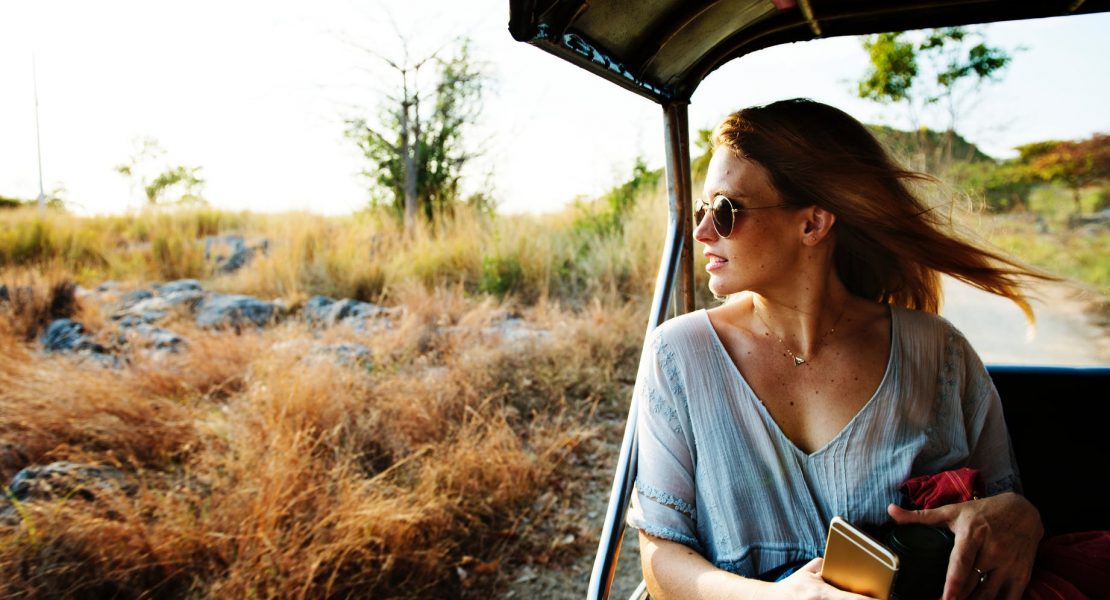
You can go far with some very easy-to-remember travel phrases and words.
You’ll likely use “I want,” “I like” and “Do you have…?” quite often. If you don’t know the noun, you can simply point at the object or show a photo.
You can also say a lot of things with very simple verbs we’re about to introduce. It may not be the sophisticated way you speak in English, but you will be understood.
- Quiero / No quiero — I want / I don’t want
- Me gustaría ; Quisiera — I would like (more polite)
- ¿Dónde está…? — Where is…? Since dónde ends in e and está starts with one, these two words flow into each other, almost like they were a single word.
- ¿Cuánto cuesta? — How much does it cost?
- ¿Qué hora es? — What time is it?
- ¿Tiene…? — Do you have…?
- Tengo / No tengo — I have / I don’t have
- Entiendo / No entiendo — I understand / I don’t understand
- ¿Entiende? — Do you understand?
- Quiero un boleto — I want a ticket
…un hotel — …a hotel
…un taxi — …a taxi
- No funciona — It doesn’t work
That last one is an all-purpose word . You can use this for a million circumstances! Just point at the shower or whatever and say “ ¡No funciona!”
What we’ve seen so far is basic survival Spanish, so even if you can only remember these words and phrases, they’ll still help a great deal.
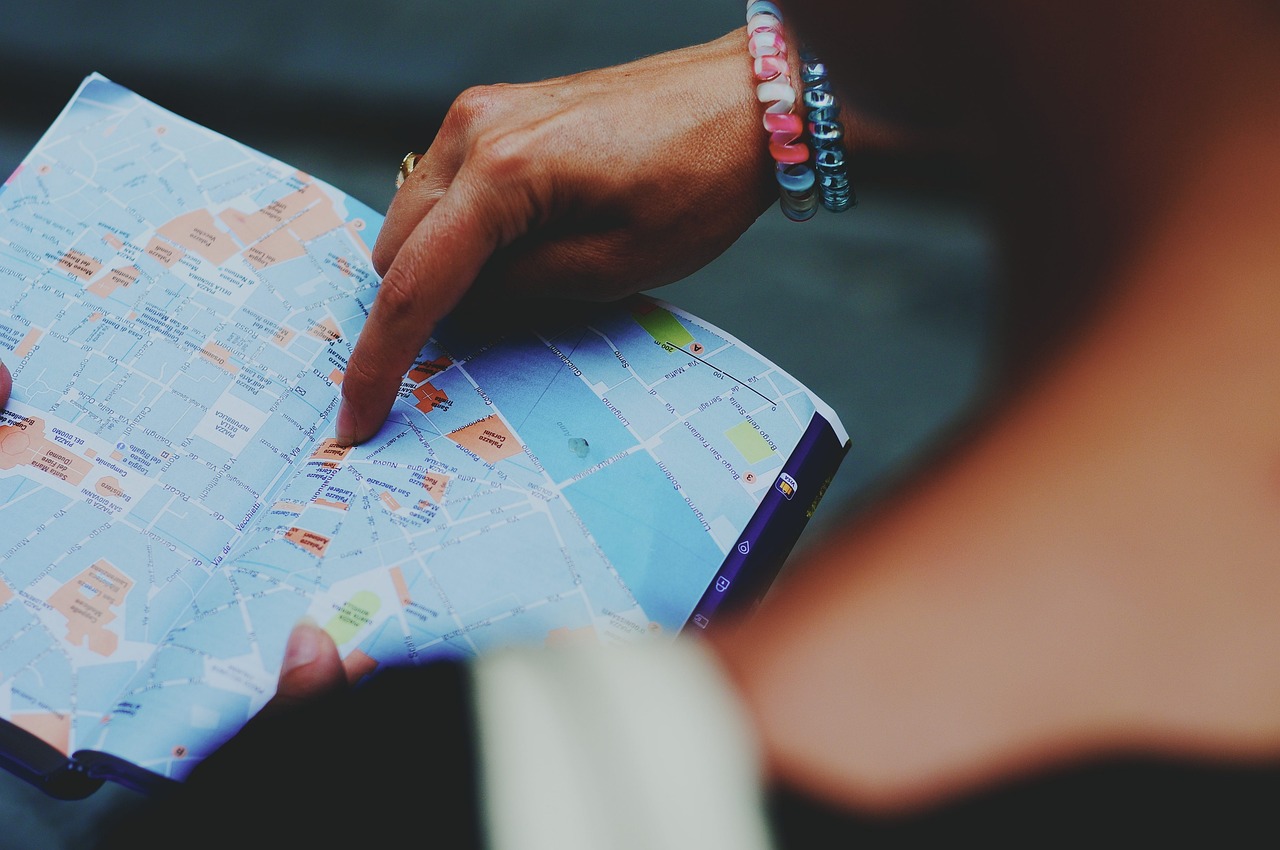
If you get a bit lost or unsure of how to get somewhere, “¿dónde está?” is the simplest way of asking for directions. Here are a few more phrases, locations and other directions in Spanish that will be helpful on your trip:
- ¿Dónde está la estación de ferrocarril? — Where is the railway station?
- ¿Dónde hay un restaurante? — Where is a restaurant?
- Un tren — A train
- La calle… — The street…
- Un banco — A bank
- El baño — The bathroom
- Busco un hotel — I’m looking for a hotel
- Necesito un hotel — I need a hotel
…un cuarto — …a room
…un cuarto con baño — …a room with a bathroom
- ¿Dónde hay una casa de cambio? — Where is the currency exchange?
- ¿Dónde está el banco? — Where is the bank?
- Dinero — Money
Once you have asked a question, someone will answer you in Spanish. Listen for these key words:
- A la derecha — To the right
- A la izquierda — To the left
- Derecho — Straight ahead
- En la esquina — At the corner
- A una cuadra — In one block
…dos cuadras — …two blocks
…tres cuadras — …three blocks
…cuatro cuadras — …four blocks
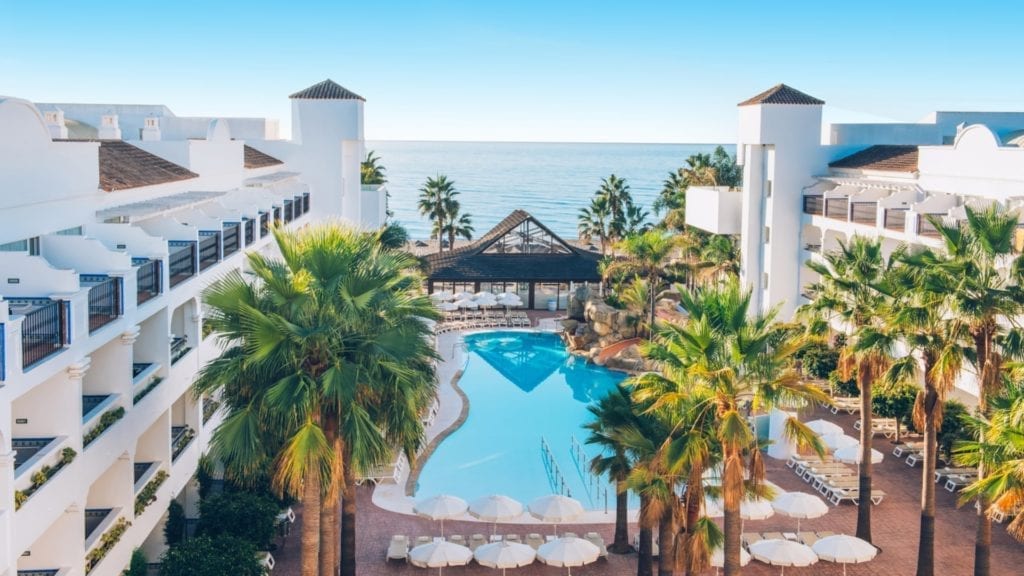
You’ve finally found your hotel and you’re ready to check in!
Staff at international chains will probably be able to communicate in English with you, but these phrases and questions will come in handy for local hotels, hostels, bed and breakfasts, etc.
These will also be helpful when you need to make adjustments to your reservation or are curious about other hotel amenities.
- Tengo una reserva a nombre de… — I have a reservation under the name of…
- Estadía de tres noches — Three-night stay
- Una habitación para dos personas — A room for two people
- Una habitación con una cama de matrimonio — A room with a double bed As you can see, habitación is a synonym of cuarto . You can use either term when booking a room.
- ¿Dónde está la piscina? — Where is the pool?
- ¿A qué hora es el desayuno? — What time is breakfast?
- ¿Puedo solicitar una salida tardía? — Can I request a late check-out?
- ¿Tiene servicio de habitaciones? — Do you have room service?
- ¿ Cuál es la contraseña de WiFi ? — What is the WiFi password?
- Una cama supletoria — An extra bed
- Vista al mar — Ocean view
- Vista a la ciudad — City view
- Un balcón — A balcony
- La terraza — The rooftop / terrace
- El gimnasio — The gym
- La playa — The beach
- El vestíbulo — The lobby

Probably the most useful travel phrases you will need are the ones you would use in a restaurant. Let’s go over some basic restaurant vocabulary in Spanish :
Ask for anything by using quiero or quisiera — “I want” or “I would like.” And remember to say por favor and gracias!
- Una mesa — A table
- Una mesa para dos — A table for two
…tres — …three
…cuatro — …four
- Un menú / Una carta — A menu
- Sopa — Soup
- Ensalada — Salad
- Hamburguesa — Hamburger
- Con salsa de tomate — With ketchup
…mostaza — …mustard
…tomate — …tomato
…lechuga — …lettuce
- Una entrada — An appetizer
- Un postre — Dessert
- Una bebida — A drink
- Agua — Water
- Vino tinto / Vino blanco — Red wine / White wine
- Cerveza — Beer
- Un café — Coffee
- ¡Señor! / ¡Señorita! — Mister / Miss (when calling a waiter or waitress)
- La cuenta — The check
- Una tarjeta de crédito — A credit card
- Una tarjeta de débito — A debit card
- Pagar en efectivo — Pay in cash
Note that many places in smaller towns still don’t take credit cards , so make sure you have enough cash with you.
You can ask if a place takes credit cards by using the noun with a question. For example, you can pull out your credit card and say: ¿Tarjeta de crédito? They will understand.
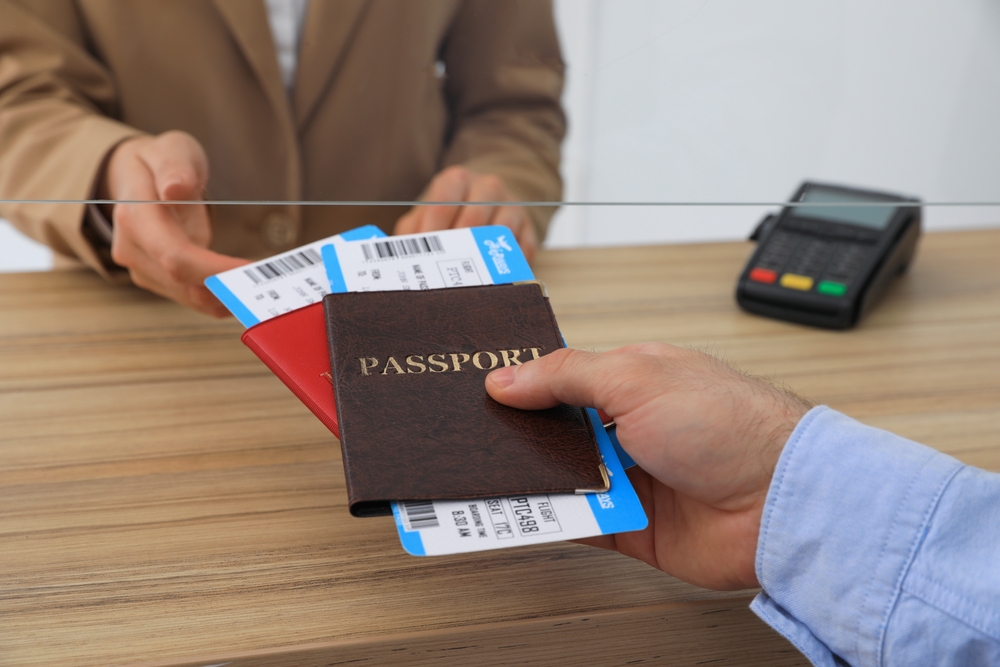
It’s time to soak in some culture ! Whether you want to go see a show, check out an art exhibit, watch a local movie or visit the next town (or country) over, you’ll need to buy some sort of ticket.
We’ll start with some airport-specific vocabulary —bearing in mind that many of these phrases are versatile and can be used in various situations—followed by more general vocabulary.
- Su pasaporte, por favor — Your passport, please
- Quisiera cambiar mi reserva — I would like to change my reservation
- ¿Podría elegir mi asiento? — Could I choose my seat?
- Quisiera cambiar mi asiento — I would like to change my seat
- Este es mi equipaje de mano — This is my carry-on luggage
- ¿Se ha cancelado el vuelo? — Has the flight been canceled?
- ¿Dónde está la terminal internacional? — Where is the international terminal?
- ¿Dónde está la puerta de embarque? — Where is the boarding gate?
- ¿A qué hora es el embarque? — What time is boarding?
Earlier we defined entrada as an “appetizer.” Entrada has multiple meanings related to “start” or “entry,” so you can also use it to say “ticket.”
- ¿Cuánto cuesta una entrada? — How much does a ticket cost?
- Dos boletos de ida y vuelta — Two roundtrip tickets
- ¿ Tiene un pase de un día ? — Do you have a one-day pass?
- ¿A qué hora sale el próximo tren ? — What time does the next train leave?
- ¿De qué plataforma sale? — Which platform does it leave from?
- ¿Qué puerta? — Which gate?
For more specific situations, here are some words and phrases you might need when purchasing tickets:
- El espectáculo — The show / performance
- El teatro — The theater
- La exposición — The exhibit
- El cine — The cinema
- Una película — A movie
- Un vuelo — A flight
- Viaje de ida — One-way trip
- Viaje de ida y vuelta — Return trip / round trip
- El asiento de pasillo — The aisle seat
- El asiento de ventanilla — The window seat
- La primera fila — The first row
La segunda fila — The second row
La tercera fila — The third row
La cuarta fila — The fourth row
Also, as you’ve likely noticed, for anything dealing with money or quantities, you’ll want to be familiar with numbers in Spanish .
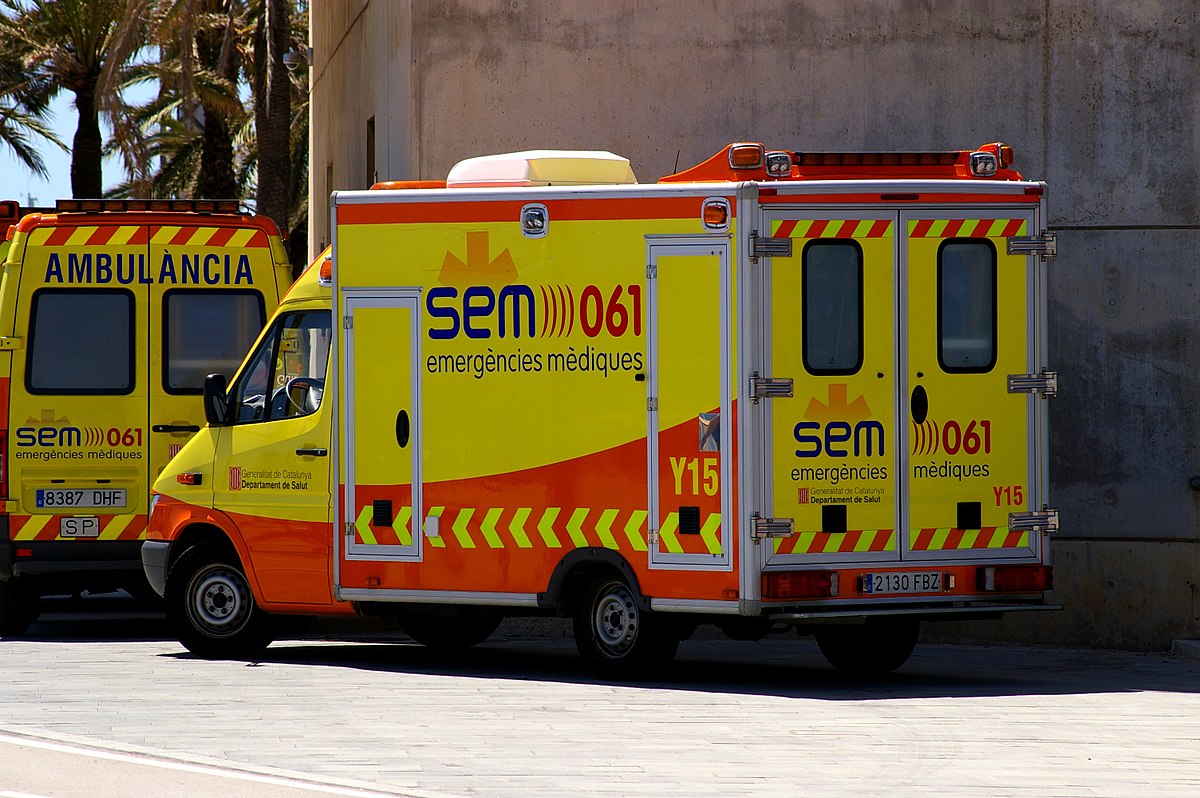
A smart traveler always comes prepared with some emergency over-the-counter meds. After all, you never know what could happen when you’re overseas.
But when those aren’t enough, these are the phrases that will help with your health-related concerns when in a Spanish-speaking country:
- ¿Dónde está la farmacia? — Where is the pharmacy?
- ¿Dónde está el hospital más cercano? — Where is the nearest hospital?
- Seguro de salud internacional — International health insurance
- No me siento bien — I feel sick / I don’t feel well
- ¿El doctor habla inglés? — Does the doctor speak English?
- ¿Necesito una receta? — Do I need a prescription?
- ¿Qué medicina necesito? — What medicine do I need?
- La cita médica — Doctor’s appointment
- La cita de seguimiento — Follow-up appointment
If you need help explaining your symptoms, these terms will help you out. With the exception of the last phrase, start off by saying tengo , followed by any of the below:
- Un resfriado — A cold
- Dolor de garganta — Sore throat
- Tos — Cough
- Fiebre — Fever
- Dolor de cabeza — Headache
- Dolor de estómago — Stomachache
- Dolor de espalda — Backache
- Resaca — Hangover
- Me gotea la nariz — I have a runny nose

Of course, a trip to a Spanish-speaking country wouldn’t be complete without a little ¡fiesta! (carnival; party). If you’re keen to hit the town, here are a few phrases to help you get your groove on.
- ¡Salud! — Cheers!
- ¿Hay algún bar por aquí? — Is there a bar around here?
- ¿Dónde están las discotecas? — Where are the clubs?
- ¿A qué hora abren las discotecas? — What time do the clubs open?
- ¿Me recomienda un lugar para bailar? — Can you recommend me a place to dance?
- ¿Quieres bailar conmigo? — Do you want to dance with me?
- ¡Bailemos! — Let’s dance!
FluentU takes authentic videos—like music videos, movie trailers, news and inspiring talks—and turns them into personalized language learning lessons.
You can try FluentU for free for 2 weeks. Check out the website or download the iOS app or Android app.
P.S. Click here to take advantage of our current sale! (Expires at the end of this month)

Try FluentU for FREE!
Do you feel more prepared for your trip now? Pack these Spanish travel phrases with the rest of your essentials and you’ll be sure to get the most from your vacation!
If you've made it this far that means you probably enjoy learning Spanish with engaging material and will then love FluentU .
Other sites use scripted content. FluentU uses a natural approach that helps you ease into the Spanish language and culture over time. You’ll learn Spanish as it’s actually spoken by real people.
FluentU has a wide variety of videos, as you can see here:

FluentU brings native videos within reach with interactive transcripts. You can tap on any word to look it up instantly. Every definition has examples that have been written to help you understand how the word is used. If you see an interesting word you don’t know, you can add it to a vocab list.

Review a complete interactive transcript under the Dialogue tab, and find words and phrases listed under Vocab .

Learn all the vocabulary in any video with FluentU’s robust learning engine. Swipe left or right to see more examples of the word you’re on.

The best part is that FluentU keeps track of the vocabulary that you’re learning, and gives you extra practice with difficult words. It'll even remind you when it’s time to review what you’ve learned. Every learner has a truly personalized experience, even if they’re learning with the same video.
Start using the FluentU website on your computer or tablet or, better yet, download the FluentU app from the iTunes or Google Play store. Click here to take advantage of our current sale! (Expires at the end of this month.)
Enter your e-mail address to get your free PDF!
We hate SPAM and promise to keep your email address safe


Enhance Your Travel Experience

While it's true that many people in popular tourist areas in Spain speak English, venturing beyond the beaten path and immersing yourself in the rich tapestry of Spanish culture can be greatly enhanced by speaking a few key phrases in the local language.
Whether you're ordering tapas at a lively bar in Barcelona , exploring the stunning Alhambra in Granada , or strolling through the charming streets of Seville, knowing some basic Spanish phrases will not only make your trip more enjoyable but also show respect for the local culture and its people.
Here are a few reasons why it's important to learn some essential Spanish phrases when travelling to Spain:
Bridge the Communication Gap:
Even though English is widely spoken in some areas, there are still many instances where locals may not be fluent in English or feel more comfortable conversing in their native language.
By learning essential Spanish phrases, you'll bridge the communication gap and be able to express your needs, ask for directions, or engage in simple conversations with ease.
Connect on a Deeper Level:
Speaking a few words in Spanish goes beyond mere communication—it shows a genuine interest in the local culture and a willingness to connect with the people you meet.
When you make an effort to speak Spanish , even if it's just a few phrases, locals will appreciate your gesture and often respond with warmth, friendliness, and a desire to share their culture with you.
Navigate with Confidence:
Travelling in a foreign country can sometimes be challenging, especially when it comes to navigating transportation systems, asking for help, or understanding important signs and announcements.
By familiarising yourself with some basic but essential Spanish phrases, you'll navigate with confidence, whether it's ordering a ticket at the train station, checking into your accommodation, or seeking assistance from locals.
Discover Hidden Gems:
Knowing basic Spanish phrases can unlock doors to hidden gems that may not be on the typical tourist radar.
When you engage in conversations with locals, they may recommend off-the-beaten-path attractions, recommend authentic local eateries, or provide insider tips for a truly immersive experience.
By tapping into the local language, you'll uncover the true essence of Spain.
Show Cultural Respect:
Learning essential Spanish phrases showcases respect for the local culture and demonstrates your willingness to adapt to your surroundings.
The effort you put into learning a few basic phrases shows that you value the local language and customs, and it helps create a positive impression among the locals you encounter.
99 Essential Spanish Phrases

- Hello/Hi - Hola
- Goodbye - Adiós
- Please - Por favor
- Thank you - Gracias
- You're welcome - De nada
- Excuse me - Perdón/Disculpe
- I'm sorry - Lo siento
- Do you speak English? - ¿Habla inglés?
- I don't understand - No entiendo
- Could you please repeat that? - ¿Podría repetirlo, por favor?
- Where is...? - ¿Dónde está...?
- How much does it cost? - ¿Cuánto cuesta?
- Can you help me? - ¿Puede ayudarme?
- I need a doctor - Necesito un médico
- Where is the restroom? - ¿Dónde está el baño?
- Can I have the menu, please? - ¿Puede darme la carta, por favor?
- I would like... - Me gustaría...
- Cheers! - ¡Salud!
- Where can I find a taxi? - ¿Dónde puedo encontrar un taxi?
- What time is it? - ¿Qué hora es?
- I'm lost - Estoy perdido/a
- Can you help me with directions? - ¿Puede ayudarme con las indicaciones?
- I would like to make a reservation - Me gustaría hacer una reserva
- Is there free Wi-Fi here? - ¿Hay Wi-Fi gratis aquí?
- How do I get to...? - ¿Cómo llego a...?
- Can I pay with credit card? - ¿Puedo pagar con tarjeta de crédito?
- What is your name? - ¿Cuál es tu nombre?
- Where can I buy tickets? - ¿Dónde puedo comprar boletos?
- Is there a pharmacy nearby? - ¿Hay una farmacia cerca?
- Could you take a picture of me, please? - ¿Puedes tomar una foto de mí, por favor?
- I'm allergic to... - Soy alérgico/a a...
- What is the weather like today? - ¿Cómo está el clima hoy?
- Can I try this on? - ¿Puedo probármelo?
- Is there a public restroom here? - ¿Hay un baño público aquí?
- Do you have any vegetarian options? - ¿Tienen opciones vegetarianas?
- Can you recommend a good place to visit? - ¿Puede recomendarme un buen lugar para visitar?
- Have a nice day! - ¡Que tenga un buen día!
- Is there a bank nearby? - ¿Hay un banco cerca?
- What is the best way to get to...? - ¿Cuál es la mejor manera de llegar a...?
- Can you recommend a good hotel? - ¿Puede recomendarme un buen hotel?
- Are there any discounts available? - ¿Hay algún descuento disponible?
- Can you speak slower, please? - ¿Puedes hablar más despacio, por favor?
- I would like a coffee, please - Me gustaría un café, por favor
- Can you help me find my hotel? - ¿Puede ayudarme a encontrar mi hotel?
- Where is the nearest ATM? - ¿Dónde está el cajero automático más cercano?
- I'm looking for a souvenir - Estoy buscando un recuerdo
- Is there a tourist information center nearby? - ¿Hay un centro de información turística cerca?
- What is the best time to visit? - ¿Cuál es la mejor época para visitar?
- I have a reservation - Tengo una reserva
- Is there a public transportation system? - ¿Hay un sistema de transporte público?
- Can I have the bill, please? - ¿Puede traerme la cuenta, por favor?
- Thank you for your help - Gracias por tu ayuda
- Where can I find a pharmacy? - ¿Dónde puedo encontrar una farmacia?
- Can you recommend a good restaurant? - ¿Puede recomendarme un buen restaurante?
- What time does the museum open? - ¿A qué hora abre el museo?
- Could you please take a photo of us? - ¿Podrías hacernos una foto, por favor?
- Can you show me on the map? - ¿Puedes enseñarme en el mapa?
- How far is it to the beach? - ¿A qué distancia está la playa?
- I have a food allergy - Tengo alergia a ciertos alimentos
- What is the weather forecast for today? - ¿Cuál es el pronóstico del tiempo para hoy?
- Is this seat taken? - ¿Está ocupado este asiento?
- Do you have a menu in English? - ¿Tienes un menú en inglés?
- Can you recommend any local specialties? - ¿Puedes recomendarme alguna especialidad local?
- How do I get to the train station? - ¿Cómo llego a la estación de tren?
- Can you call a taxi for me, please? - ¿Puedes llamar un taxi para mí, por favor?
- Where is the nearest bathroom? - ¿Dónde está el baño más cercano?
- I would like to try this dish, please - Me gustaría probar este plato, por favor
- Can you help me, please? - ¿Me puedes ayudar, por favor?
- What time is check-in/check-out? - ¿A qué hora es el check-in/check-out?
- Is there a public transportation system here? - ¿Hay un sistema de transporte público aquí?
- Excuse me, where is the nearest ATM? - Disculpa, ¿dónde está el cajero automático más cercano?
- What is the best way to get to the city center? - ¿Cuál es la mejor manera de llegar al centro de la ciudad?
- Do you accept credit cards? - ¿Aceptan tarjetas de crédito?
- Can you recommend a good place to stay? - ¿Puedes recomendarme un buen lugar para hospedarme?
- I need a doctor - Necesito un médico.
- What is the Wi-Fi password? - ¿Cuál es la contraseña del Wi-Fi?
- Can I have the bill, please? - ¿Me puedes traer la cuenta, por favor?
- Is there a nearby supermarket? - ¿Hay un supermercado cercano?
- What is your name? - ¿Cómo te llamas?
- I'm sorry, I don't speak Spanish well - Lo siento, no hablo bien español.
- Could you repeat that, please? - ¿Podrías repetirlo, por favor?
- Is there a vegetarian option? - ¿Hay una opción vegetariana?
- Where is the nearest tourist information office? - ¿Dónde está la oficina de información turística más cercana?
- Can I have a glass of water, please? - ¿Me puedes dar un vaso de agua, por favor?
- What is the best time to visit this attraction? - ¿Cuál es el mejor momento para visitar esta atracción?
- Can you recommend a good local wine? - ¿Puedes recomendarme un buen vino local?
- Can you recommend a traditional Spanish dish? - ¿Puedes recomendarme un plato tradicional español?
- Is breakfast included? - ¿Está incluido el desayuno?
- Can I have an extra pillow, please? - ¿Puedo tener una almohada adicional, por favor?
- Is there a safe in the room? - ¿Hay una caja fuerte en la habitación?
Essential Spanish Phrases

Buenos días - Good morning Buenas tardes - Good afternoon Buenas noches - Good evening Como estas? - How are you.
Que hora es? - What time is it?
10 Reasons why you should learn Spanish in Spain

Learning Spanish while staying in Spain is not only a great idea but also an enriching experience that can enhance your travel adventures in countless ways.
Here are ten reasons why learning Spanish in Spain is highly recommended:
Cultural Immersion:
When you learn Spanish in Spain, you immerse yourself in the local culture and gain a deeper understanding of the country and its people.
By communicating in the local language, you can connect with locals on a more personal level, participate in cultural activities, and appreciate the nuances of daily life.
Enhanced Travel Experience:
Knowing the local language allows you to navigate your way around Spain more confidently.
OYou can interact with locals, ask for directions, order food at local restaurants, and engage in conversations with ease. This opens up a whole new world of possibilities and enhances your overall travel experience.
Authentic Interactions:
Speaking at least the essential Spanish phrases enables you to engage in authentic interactions with locals, who will often appreciate your efforts to communicate in their native tongue.
Whether it's striking up conversations with shopkeepers, chatting with fellow travellers, or making friends with locals, your ability to communicate in Spanish will create more meaningful connections and memorable experiences.
Expanded Opportunities:
Learning Spanish in Spain can open doors to a variety of opportunities. If you plan to work or study in Spain, knowing the language will significantly increase your prospects.
Many employers and educational institutions value bilingualism and consider Spanish language skills a valuable asset.
Cultural Understanding:
Language is a gateway to understanding a culture on a deeper level. By learning Spanish, you gain insights into the customs, traditions, and values of the Spanish-speaking world.
You can appreciate literature, music, and art more profoundly and understand the historical and social context behind them.
Language Skills Development:
Immersing yourself in a Spanish-speaking environment is one of the most effective ways to develop your language skills.
You'll have the opportunity to practice listening, speaking, reading, and writing in real-life situations.
Native speakers can provide valuable feedback, helping you improve your pronunciation, vocabulary, and grammar.
Personal Growth:
Learning a new language challenges your brain and fosters personal growth.
It improves cognitive skills, enhances memory, and boosts problem-solving abilities. Additionally, it builds resilience, adaptability, and self-confidence as you navigate through the ups and downs of language learning.
Travel Flexibility:
Knowing Spanish allows you to explore beyond the popular Spanish tourist destinations . You can venture into smaller towns, rural areas, and off-the-beaten-path locations with greater ease.
You'll have the freedom to interact with locals, discover hidden gems, and immerse yourself in the true essence of Spain.
Language Diversity:
Spanish is one of the most widely spoken languages in the world.
By learning Spanish, you gain access to a vast network of Spanish-speaking countries and communities across the globe.
It opens up opportunities for travel, work, and cultural exchange in various Spanish-speaking countries beyond Spain itself.
Lifelong Skill:
Finally, learning Spanish is a lifelong skill that will continue to benefit you long after your visit to Spain.
Spanish is spoken by millions of people worldwide, and your language skills can be used in various personal and professional contexts for years to come.
Best Places To Learn Spanish in Spain

As the capital of Spain, Madrid boasts numerous language schools and universities that provide comprehensive Spanish language courses.
The city offers a vibrant atmosphere, rich cultural heritage, and a diverse range of activities to immerse yourself in the language.
Located in Catalonia, Barcelona is another fantastic destination to learn Spanish . The city offers a blend of Spanish and Catalan culture, making it an exciting and unique learning environment.
Barcelona is home to renowned language schools and offers a lively atmosphere with stunning architecture, beautiful beaches, and vibrant nightlife.
Known as the "City of Spanish," Salamanca is famous for its prestigious University of Salamanca and its language schools.
The city has a strong reputation for providing high-quality Spanish language programs, attracting students from around the world.
Salamanca's well-preserved historic center and vibrant student life create an ideal environment for language learning.
Nestled in the foothills of the Sierra Nevada mountains, Granada offers a captivating setting for learning Spanish.
The city's historic architecture, including the iconic Alhambra Palace , provides a unique backdrop for language immersion.
Granada is known for its warm and friendly atmosphere, making it an excellent choice for language learners.
Situated on the eastern coast of Spain, Valencia combines beautiful beaches with a rich cultural heritage.
The city offers a range of language schools that cater to international students.
Learning Spanish in Valencia allows you to practice the language while enjoying the city's Mediterranean climate, delicious cuisine, and vibrant festivals.
With its picturesque streets, vibrant flamenco scene, and stunning architecture, Seville Spain is an enchanting city to learn Spanish.
It boasts renowned language schools and a welcoming atmosphere. Immersing yourself in Seville's rich Andalusian culture provides an authentic and memorable language-learning experience.
Located on the Costa del Sol , Malaga offers a sunny and relaxed environment for learning Spanish.
The city combines beautiful beaches, a rich cultural heritage, and a thriving art scene. Malaga's language schools provide a range of programs suitable for all levels of Spanish learners.
Situated on the southeastern coast of Spain, Alicante is a popular destination for Spanish language learning.
The city offers a mix of traditional Spanish charm and modern amenities.
Its Mediterranean climate, stunning beaches, and vibrant nightlife make it an attractive choice for students.
As the largest of the Canary Islands , Tenerife provides a unique environment for learning Spanish.
The island's pleasant climate, beautiful landscapes, and laid-back lifestyle create an ideal setting for language immersion.
Tenerife is home to reputable language schools that offer Spanish courses for international students.
Known for the famous Running of the Bulls festival, Pamplona is also a great place to learn Spanish.
The city's historic charm, friendly locals, and rich cultural heritage make it a captivating destination for language learners.
These popular destinations offer a combination of quality language programs, cultural immersion, and exciting experiences, making them top choices for learning Spanish in Spain.
Each city has its own unique charm and attractions, ensuring that your language-learning journey will be both educational, fun and enjoyable.
- About Author
- Latest Posts

Hey there! I'm Matt, your friendly neighbourhood explorer extraordinaire! For the past 15 years, I've been gallivanting around Spain, soaking up all its wonders and uncovering hidden gems like a modern-day Indiana Jones (minus the hat and whip, unfortunately). So, buckle up, amigos! It's time to dive straight into the heart and soul of Spain. Welcome to my world of Spanish wonders!
Latest posts from Matt
- 4 Days in Valencia – The Ultimate Bucket List Itinerary - March 17, 2024
- Luxury Spain Holidays – The Ultimate Bucket List Travel Guide - March 9, 2024
- Easter in Spain – Semana Santa Holy Week Traditions - March 7, 2024
Recent Posts

4 Days in Valencia – The Ultimate Bucket List Itinerary
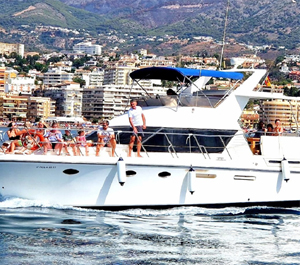
Luxury Spain Holidays – The Ultimate Bucket List Travel Guide
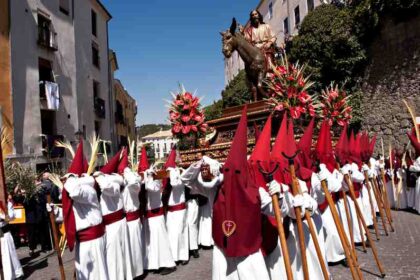
Easter in Spain – Semana Santa Holy Week Traditions

Barcelona Nightlife – Best Discos & Nightclubs Not To Be Missed

Making The Most Of Shore Sightseeing Excursions In Spain Whilst Cruising The Med

The Ultimate Spain Bucket List – 300+ Spanish Experiences

9 Great Cultural Sites to Visit in Madrid

16 Christmas Traditions in Spain You Should Know About
Leave a reply cancel reply.
Your email address will not be published. Required fields are marked *
This site uses Akismet to reduce spam. Learn how your comment data is processed .
Disclosure: Please note that some of the links included in the above content may be affiliate links. We may earn a commission if you make a purchase at no extra cost to you. Rest assured, we only recommend products and services that we personally use or have used and are happy to recommend. Any commission we earn helps toward the site's running costs.
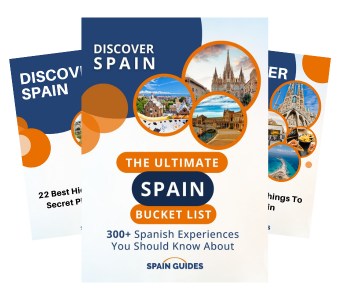
Travel Smarter - Not Harder
Download free e-guides and travel tips.
Start your Journey today and get access to exclusive FREE content.
Username or Email Address
Remember Me
- WHY VISIT SPAIN?
- TRAVELLING TO SPAIN
- SPAIN ON A BUDGET
- TRAVEL REQUIREMENTS – ETIAS
- SPAIN ENTRY REQUIREMENTS
- SPANISH CUISINE
- SPANISH FOOD
- HOLIDAY IDEAS
- PUBLIC HOLIDAYS
- TOURISM BOARDS
- AIRPORT GUIDE
- DRIVING IN SPAIN
- WEATHER IN SPAIN
- FREE WEB CAMS
- BEST BEACHES SPAIN
- FESTIVALS & FIESTAS
- MUSEUMS IN SPAIN
- CAMPING IN SPAIN
- MARINAS IN SPAIN
- SKIING IN SPAIN
- WATER PARKS
- UNESCO WORLD HERITAGE SITES
- 80 BEST ATTRACTIONS
- 71 BEST PLACES TO VISIT
- REGIONS OF SPAIN
- COSTA DEL SOL
- CANARY ISLANDS
- SAN SEBASTIAN
- Complete List:
- SAGRADA FAMILIA BARCELONA
- BARCELONA FC STADIUM TOUR
- BARCELONA FLAMENCO SHOW
- SEVILLE FLAMENCO SHOW
- SEVILLE CATHEDRAL
- GAUDI`S CASA BATLLO
- THE ALHAMBRA GRANADA
- SANTIAGO CATHEDRAL
- CITY OF ARTS & SCIENCE VALENCIA
- MOSQUE-CATHEDRAL CORDOBA
- CAMINITO DEL REY
- PRADO MUSEUM MADRID
- REINA SOFIA ART MUSEUM
- SCUBA DIVING
- BEST TAPAS TOURS
- BEST WINE TASTING TOURS
- TOUR GUIDES
- HOTELS IN SPAIN
- LUXURY HOTELS
- LUXURY BEACH HOTELS
- HOLIDAY RENTALS
- PARADOR HOTELS
- CHEAP FLIGHTS
- TRAVEL INSURANCE
- FREE TRAVEL BROCHURES
- WIN FREE HOLIDAYS

Basic Spanish Phrases for Travelers
Learn how to greet locals, ask for directions, and order food
It doesn't take much to be understood in Spanish—many people who speak it in Latin America and Europe are forgiving of errors and very helpful. A combination of sometimes silly pantomime and basic Spanish words and phrases are what you need most to travel in a Spanish-speaking country. "Please" and "thank you" go a long way, and a phrasebook is a big help.
Greeting People
If you only learn one phrase in Spanish before your trip, make it be how to say "hello." Locals will always appreciate your effort to speak their language, so learn how to greet them in Spanish.
- Hello: hola (oh-lah)
- Good morning: Buenos días ( bway-nos dee-ahs )
- Good afternoon: Buenas tardes ( bway-nahs tar-des)
- Good evening: Buenas noches ( bway-nahs noh-chess )
- How are you?: ¿Cómo está? (coh-moh es-tah)
- Good, thank you: Bien, gracias ( bee-ehn, grah-see-ahs )
- Can you speak English?: ¿Habla inglés? (hah-blah een-glays)
Asking for Directions
As a traveler , some of the most common phrases you can expect to use have to do with directions. You might need to ask someone where your hotel is, where the restroom is, or where you can get a meal. And, of course, you'll need to be able to understand their response, too.
- Where is...?: ¿Dónde está...? (Dhohn-dheh ehs-TAH)
- Where is a restaurant?: ¿Dónde hay un restaurante? (Dhohn-dheh eye oon rest-ore-rahn-tay)
- Where is the restroom? ¿Dónde está el baño? (Dhohn-dheh ehs-tah el ban-yo)
- How far?: ¿A que distancia? (Ah kay dhees-tan-syah)
- Right: A la derecha (Ah lah dey-ray-chah)
- Left: A la izquierda (Ah lah eez-key-ayr-dah )
- Ahead: Derecho ( De-rey-choh )
- Can you help me?: ¿Puede ayudarme? (Pweh-dhe ah-yoo-dh-AHR-meh)
- Please: Por favor (por fav-ore)
- Thank you: Gracias (gra-see-uhs)
Eating in a Restaurant
When you're not asking locals for directions, you'll most likely be asking for food and drinks in restaurants. After all, you'll find the best food at the places that don't have English menus for tourists. Learn the restaurant basics and you'll be all set to handle eating out in a foreign country.
- How much is it?: ¿Cuanto cuesta? (Kwahn-toh kweh-stah)
- The bill, please: La cuente, por favor (Lah kwhen-tah, por-fav-ore)
- That was delicious: Estuvo delicioso (est-ooh-vo del-ish-ee-oh-so)
- I am vegetarian: Soy vegetariano/a (soy veg-et-air-ee-an-oh/ah)
- A table: Una mesa (oona me-sah)
- A menu: Un menú (oon mey-noo)
- A drink: Una bebida (oon-ah beh-beed-ah)
- Beer: Cerveza (ser-vay-sah)
- Red or white wine: Vino tinto or blanco ( vee-noh teen-toh or blahn-coh )
- Water: Agua (ahg-wah)
- A coffee: Un café (uhn cah-fey)
- Sandwich: Torta (tore-tah)
- Burger: Hamburguesa (ham-burg-ess-ah)
- Chicken: Pollo (poy-oh)
- Spicy: Picante (pick-ant-ay)
Italian for Travelers to Italy
Phrases to Know for Your Trip to Greece
Essential Spanish Tips for Peru Travel
Fijian Phrases for Your South Pacific Vacation
Spanish Phrases to Learn Before You Go to Mexico
How to Say Hello in Japanese
Common Tahitian Words and Phrases for Travelers
Typical French Restaurant Vocabulary: How to Order in Paris
Basic German Words For Travelers
Useful Finnish Words and Phrases for Travelers
Useful French Travel Words and Expressions
Tenerife Guide: Planning Your Trip
When and What to Eat and Drink in Spain
Useful Words and Phrases in Norwegian
Icelandic Phrases for Travelers
The 10 Best Destinations in the Spanish Countryside

91 Top Spanish Travel Phrases & Words for Travelers
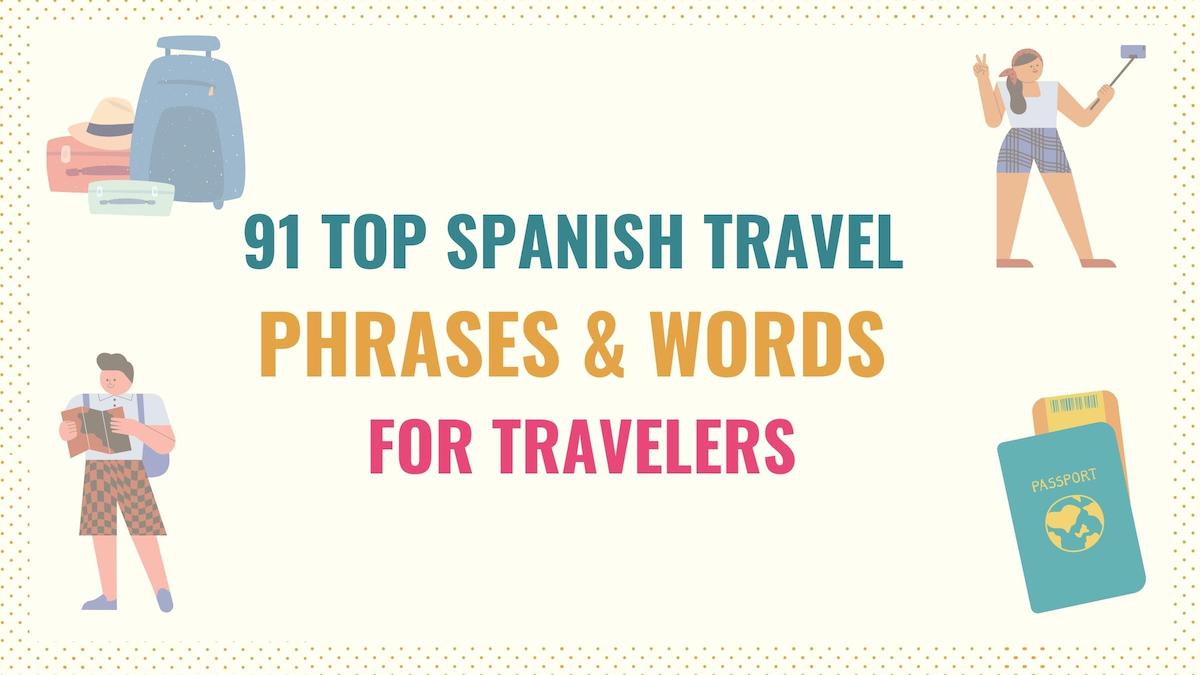
Are you planning a well-deserved vacation? Is your destination a Spanish-speaking country? If so, you may want to take the time to learn some essential Spanish travel phrases that can help you communicate.
There’s no doubt that English is a widely spoken language . But if you travel to a Spanish-speaking country, your chances of randomly finding someone who speaks enough English to help you aren’t that high. Trust me, I have seen enough confused tourists to know.
To avoid any communication issues, I’ve built a list of 91 crucial Spanish travel phrases that will help you get by on your vacation. Are you wondering how on earth you are supposed to pronounce them if you don’t speak Spanish? Fear not! I’ve also included the audio recordings to help you overcome this issue.
Here is a quick overview of the situations we’ll cover and the resources you’ll find in this guide:
- Common verbs for travel
- Phrases & Vocabulary for the Airport
- Phrases to Use in a Restaurant
- Phrases & Words to Ask for Directions
- Phrases to Use at a Hotel
- Downloadable PDF
Basic Spanish Travel Phrases, Questions & Words
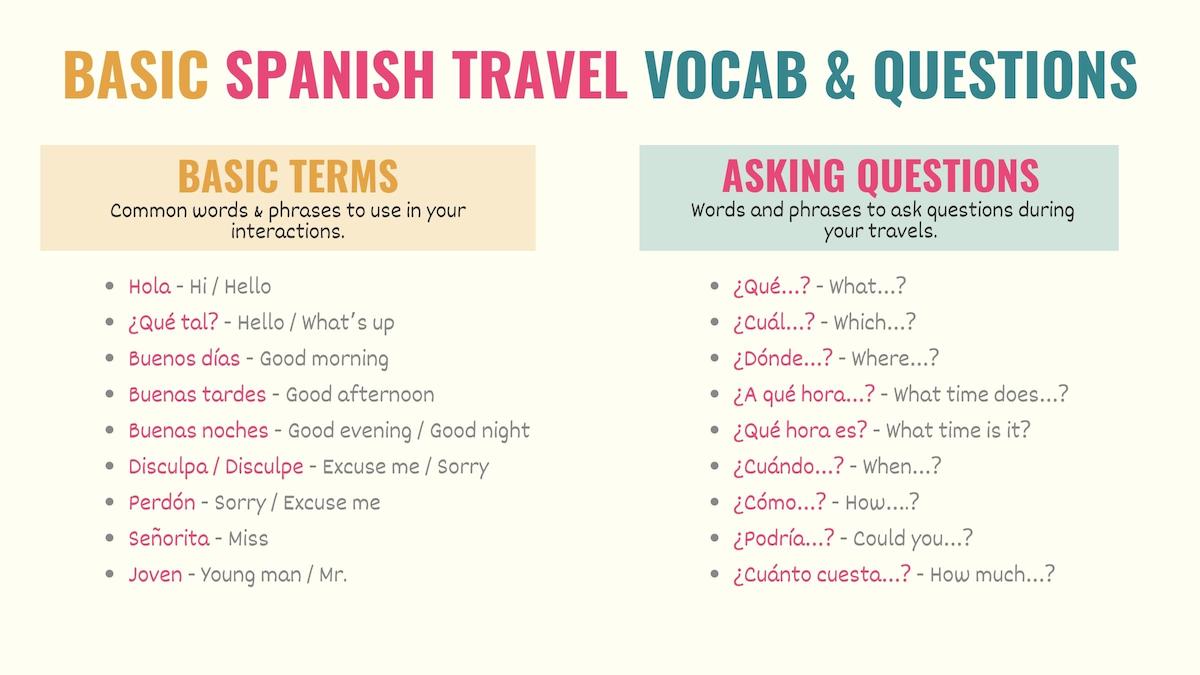
When it comes to Spanish vocabulary for travelers, there are some essential words that you’ll use more frequently or that can help you sound more polite when addressing a native speaker. Let’s start with some greetings and expressions to catch a person’s attention.
As you’ll see in the examples I’ve provided, these words are usually placed at the beginning of the sentence.
- Hola – Hi / Hello
- ¿Qué tal? – Hello / What’s up
- Buenos días – Good morning
- Buenas tardes – Good afternoon
- Buenas noches – Good evening / Good night
- Disculpa / Disculpe – Excuse me / Sorry
- Perdón – Sorry / Excuse me
- Señorita – Miss
- Joven – Young man / Mr.
The following question words and expressions can also be useful when you travel:
- ¿Qué…? – What…?
- ¿ Cuál …? – Which…?
- ¿Dónde…? – Where…?
- ¿ A qué hora …? – What time does…?
- ¿Qué hora es? – What time is it?
- ¿Cuándo…? – When…?
- ¿Cómo…? – How….?
- ¿Podría…? – Could you…?
- ¿Cuánto cuesta…? – How much…?
Hola , ¿ cuánto cuesta el llavero? Hi , how much is the keychain?
Disculpe , ¿ dónde está la catedral? Excuse me , where is the cathedral?
Señorita, ¿ podría darme otro formulario? Miss, could you give me another form?
Buenos días , ¿ a qué hora abre el museo? Good morning, what time does the museum open?
Basic Spanish verbs for traveling
Many simple Spanish travel phrases are built with the verbs querer , gustar and poder , which we use to make requests. These are the most common forms that you’ll need:
- Quiero … – I want…
- Quisiera … – I would like…
- Me gustaría … I would like…
- ¿Puede…? – Can you…?
- Tiene / Tengo … – Has / Have
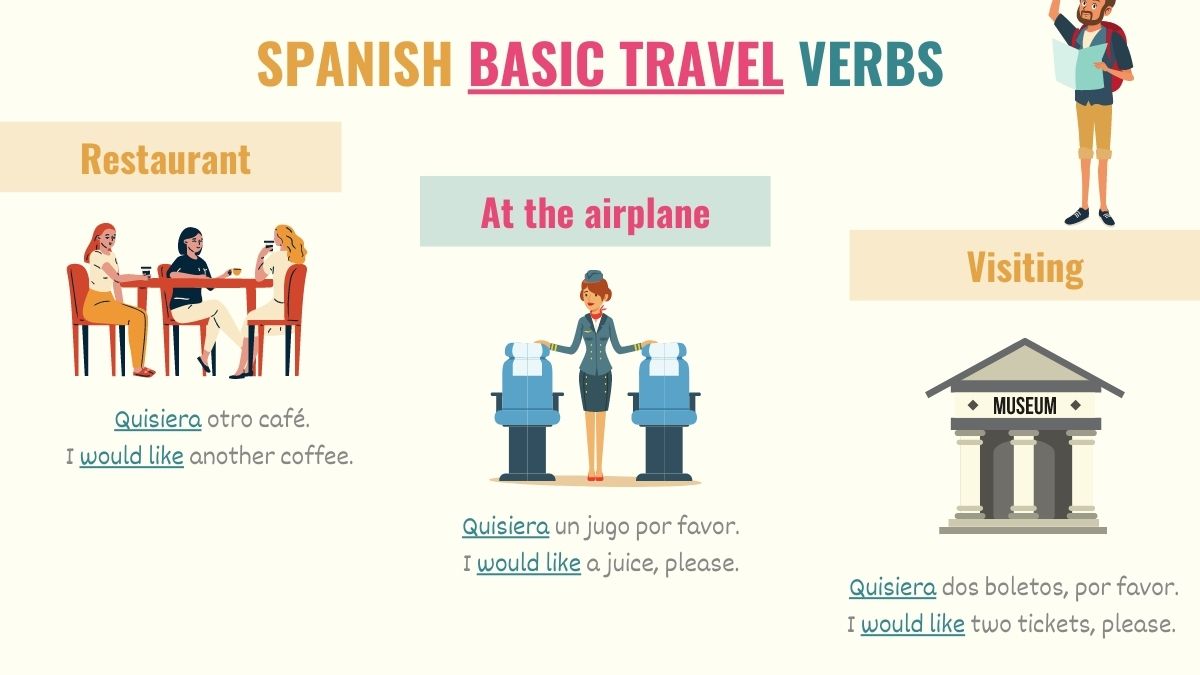
As you can imagine, these expressions are very versatile because they can be combined with different words for tourists:
Quiero dos boletos. I want two tickets.
No tengo cambio. I don’t have change.
Me gustaría una habitación con vistas al mar. I would like a room with an ocean view.
Quisiera visitar el museo de artes. I would like to visit the art museum.
¿ Puede decirme dónde está la parada? Can you tell me where the bus stop is?
Disculpe, ¿ podría ayudarme? Excuse me, could you help me?
Travel Phrases & Spanish Vocabulary for the Airport
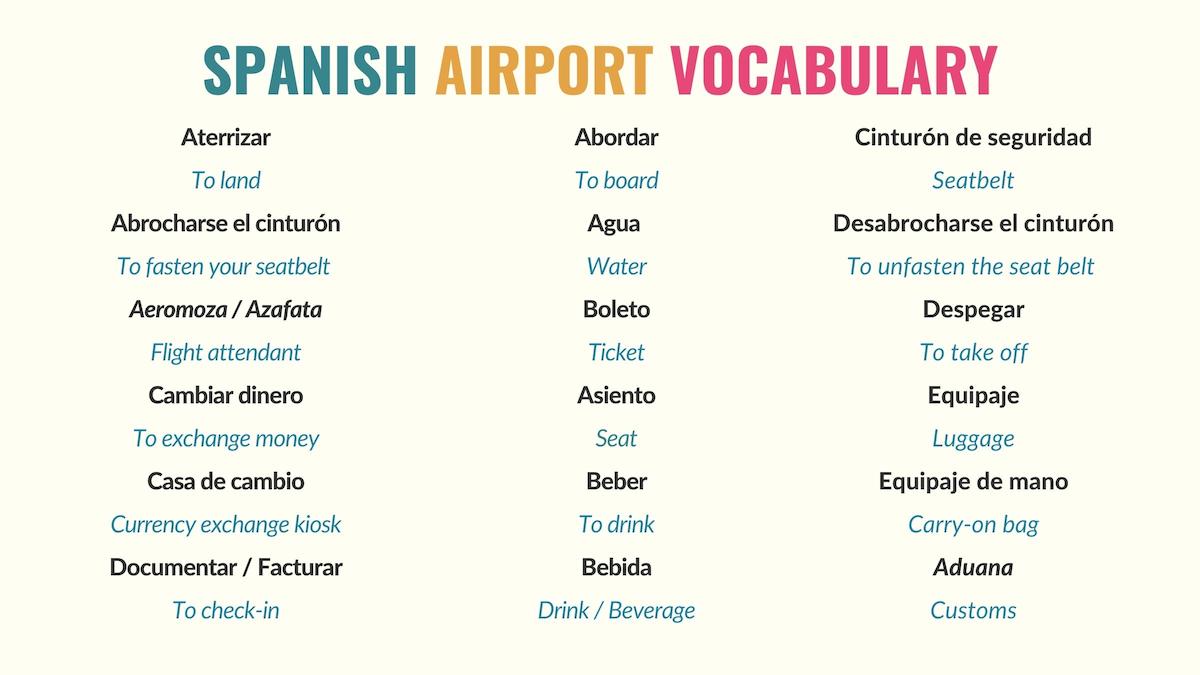
You’re likely to find more than one person who speaks English at the airport. However, this is an excellent opportunity to start practicing your Spanish. Here are some common phrases that you’re probably going to encounter or use while at the airport:
- ¿Va a documentar su maleta? – Are you going to check your bag?
- ¿Me permite su pasaporte? – Can I have your passport?
- Por favor, abroche su cinturón – Please, fasten your seatbelt
- ¿Desea algo de beber? – Would you like something to drink?
- Por favor, regrese a su asiento – Please, go back to your seat
- Llene este formulario, por favor – Please, fill in this form
- ¿Cuál es el motivo de su visita? – What’s the reason for your visit?
- ¿Dónde puedo cambiar dinero? – Where can I exchange money?
- ¿Dónde están los baños? – Where are the restrooms?
In addition to these phrases, here are some words that may be useful in this situation. Remember that you can combine the words below with the expressions and questions you learned in the previous section.
[Basic Spanish expression] + [airport vocabulary]
Quisiera un asiento en el pasillo . I would like an aisle seat .
Disculpe, ¿a qué hora aterrizamos ? Excuse me, what time do we land ?
¿Podría ayudarme? Mi equipaje está perdido . Could you help me? My luggage is missing .
¿Cuántas maletas va a documentar ? How many bags are you going to check ?
Buenos días, ¿tiene café ? Good morning, do you have coffee ?
Spanish Phrases for Tourists in a Restaurant
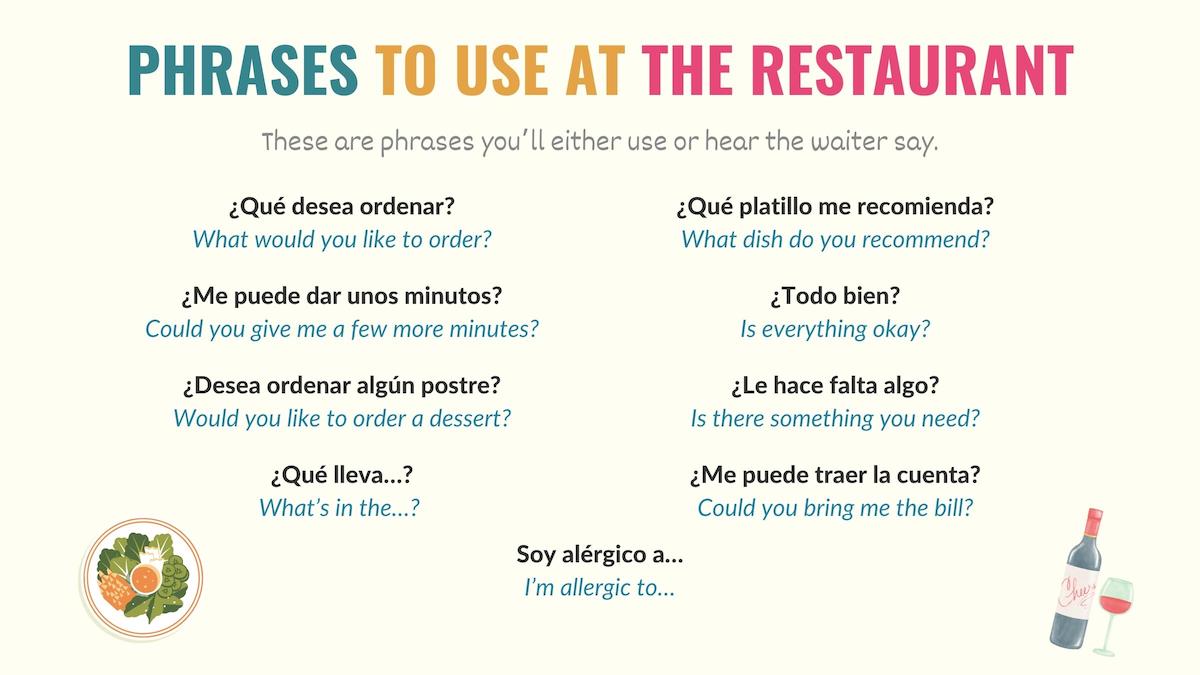
As a tourist, you’re probably going to spend some time trying different foods at restaurants. Here are some common phrases you can use and are likely to hear at a restaurant.
- ¿Qué desea ordenar? – What would you like to order?
- ¿Me puede dar unos minutos? – Could you give me a few more minutes?
- ¿Desea ordenar algún postre? – Would you like to order a dessert?
- ¿Qué lleva…? – What’s in the…?
- ¿Qué platillo me recomienda? – What dish do you recommend?
- ¿Todo bien? – Is everything okay?
- ¿Le hace falta algo? – Is there something you need?
- ¿Me puede traer la cuenta? – Could you bring me the bill?
- Soy alérgico a … – I’m allergic to…
Here are other terms that can be useful in this type of situations:
Joven, ¿cuál es la especialidad de la casa? Young man, what’s the specialty of the house?
Quisiera ordenar dos postres, por favor. I would like to order two desserts, please.
Disculpe, ¿qué platillo me recomienda? Excuse me, what dish would you recommend to me?
¿Me podría traer un cuchillo y un vaso de agua? Could you bring me a knife and a glass of water?
Take Note: If you want to learn more about this topic, I recommend you check this guide on ordering food in Spanish .
Spanish for Visiting the City & Asking for Directions
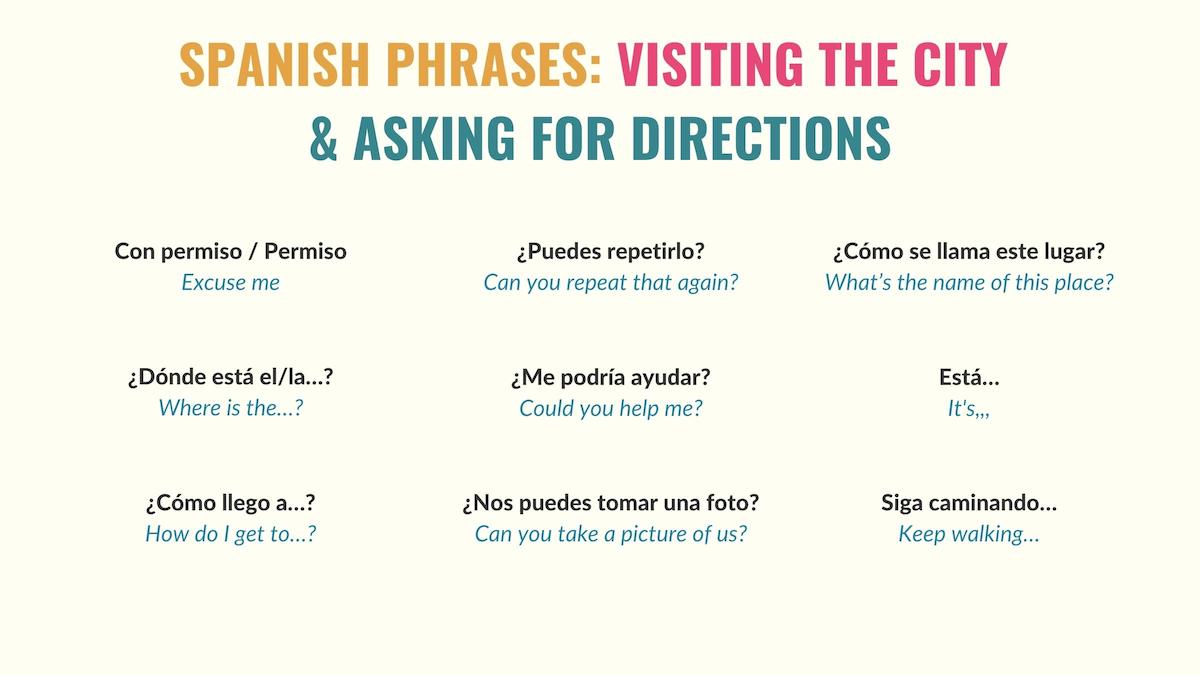
One of the biggest challenges you may face is communicating with native speakers when visiting the city or a tourist attraction. Here are some of the most common Spanish phrases for travel that you may need in this situation:
- Con permiso / Permiso – Excuse me
- ¿Dónde está el/la…? – Where is the…?
- ¿Cómo llego a…? – How do I get to…?
- Estoy buscando… – I’m looking for
- No hablo mucho español – I don’t speak Spanish very well
- ¿Hay algún/alguna… por aquí? – Is there…around here?
- ¿Hablas inglés? – Do you speak English?
- ¿ Puedes repetirlo? – Can you repeat that again?
- ¿Me podría ayudar? – Could you help me?
- ¿ Nos puedes tomar una foto? – Can you take a picture of us?
- ¿ Nos puedes tomar otra ? – Can you take another one of us?
- ¿ Dónde puedo tomar…? – Where can I take…?
- ¿Por aquí pasa el camión…? – Is this place on the bus route? / Does the bus come by here?
- ¿ Cómo se llama este lugar? – What’s the name of this place?
Take Note: Con permiso is a polite way to ask people to let you through. So, we use this phrase in crowded places or when walking on the street.
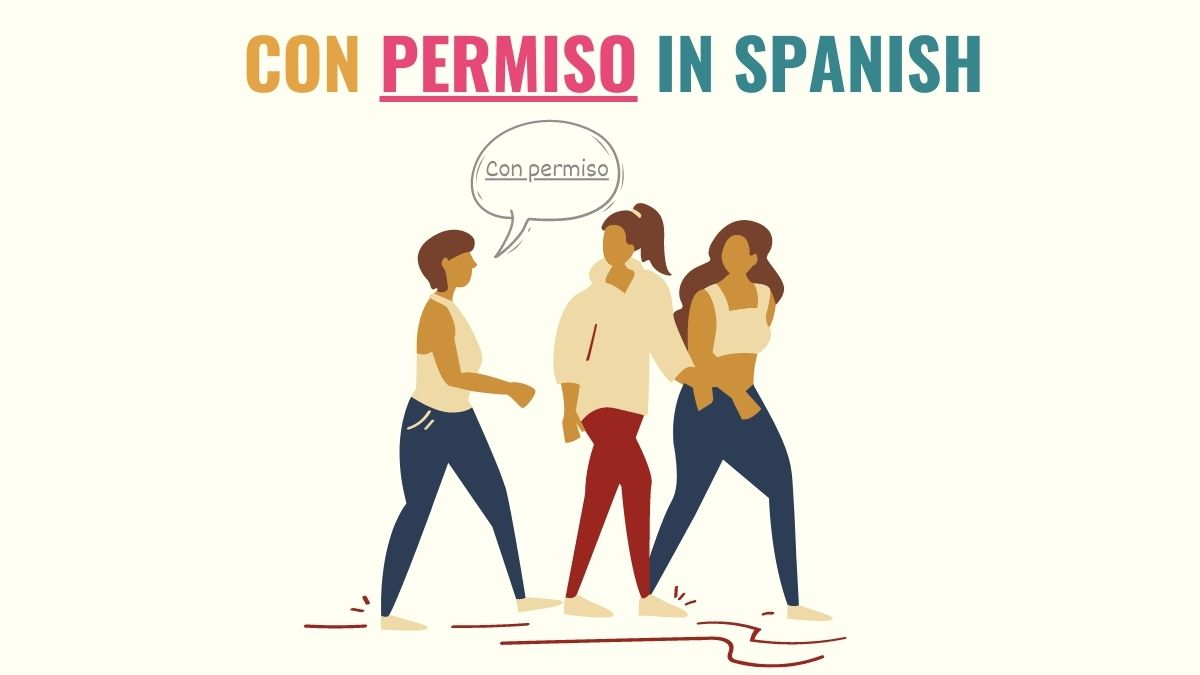
On the other hand, people are likely to give you the following answers:
- Está… – It’s…
- Siga caminando …- Keep walking…
- De vuelta a/en – Turn…
- Siga derecho – Go straight…
- Camine – Walk…
Additionally, here are some basic words that you can use or might hear when visiting the city:
Here are some examples of how to use these Spanish words and expressions:
Disculpe, ¿ dónde está la estación de tren? Excuse me, where is the train station?
Buenas tardes, estoy buscando el museo. Good afternoon, I’m looking for the museum.
Camine dos cuadras y dé vuelta a la izquierda. Walk two blocks and turn left.
Perdón, ¿ hay algún restaurante por aquí? Excuse me, is there a restaurant around here?
Hola, ¿ me podría ayudar ? Quiero ir al museo. Hi, could you help me ? I want to go to the museum.
Spanish Phrases for Hotels & Accommodations
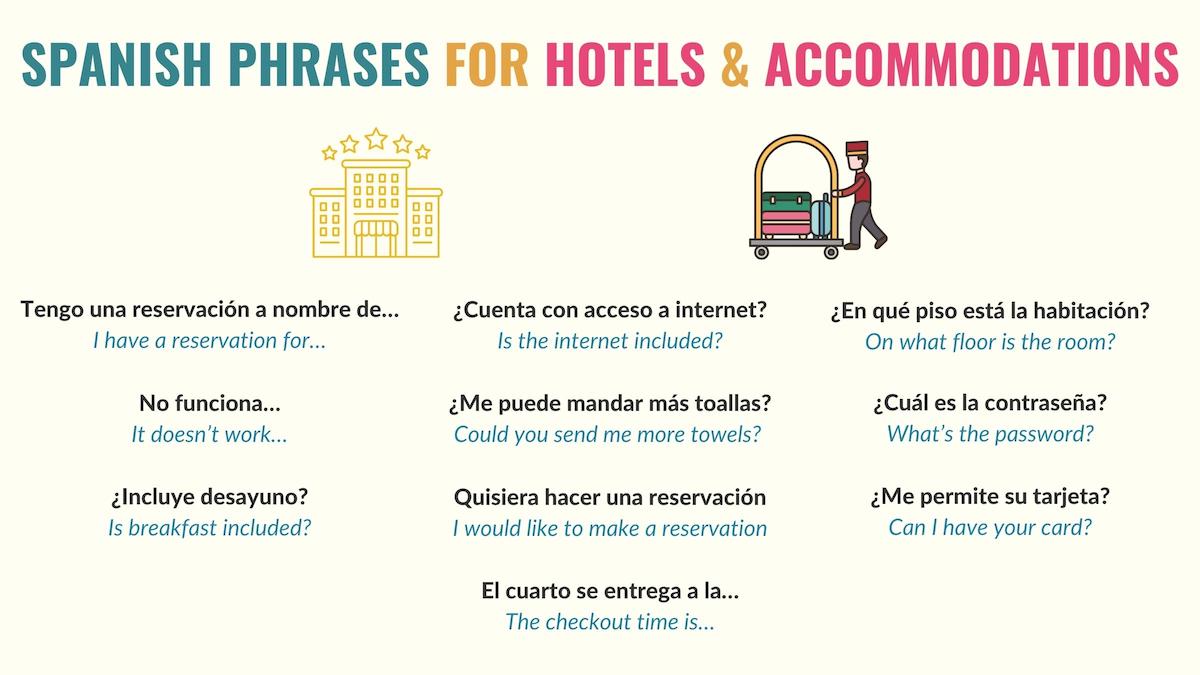
Although nowadays it’s easier to make reservations before your trip, there may be some situations where you need to speak Spanish to communicate with staff and others in your hotel. Here are some essential phrases applicable to this context:
- Tengo una reservación a nombre de … – I have a reservation for…
- Quisiera hacer una reservación – I would like to make a reservation.
- No funciona … – It doesn’t work…
- ¿Me puede mandar más toallas? – Could you send me more towels?
- ¿Incluye desayuno? – Is breakfast included?
- ¿ Cuenta con acceso a internet? – Is the internet included?
- ¿Cuál es la contraseña? – What’s the password?
- ¿En qué piso está la habitación? – On what floor is the room?
- ¿Me permite su tarjeta? – Can I have your card?
- El cuarto se entrega a la … – The checkout time is…
As for vocabulary, these are some of the words that you may want to keep in mind:
Señorita, ¿dónde está el elevador ? Miss, where is the elevator ?
Buenos días, la regadera no funciona . Good morning, the shower doesn’t work .
¿A qué hora termina el servicio a la habitación ? What time does room service end?
Spanish Expressions for Souvenir Shopping
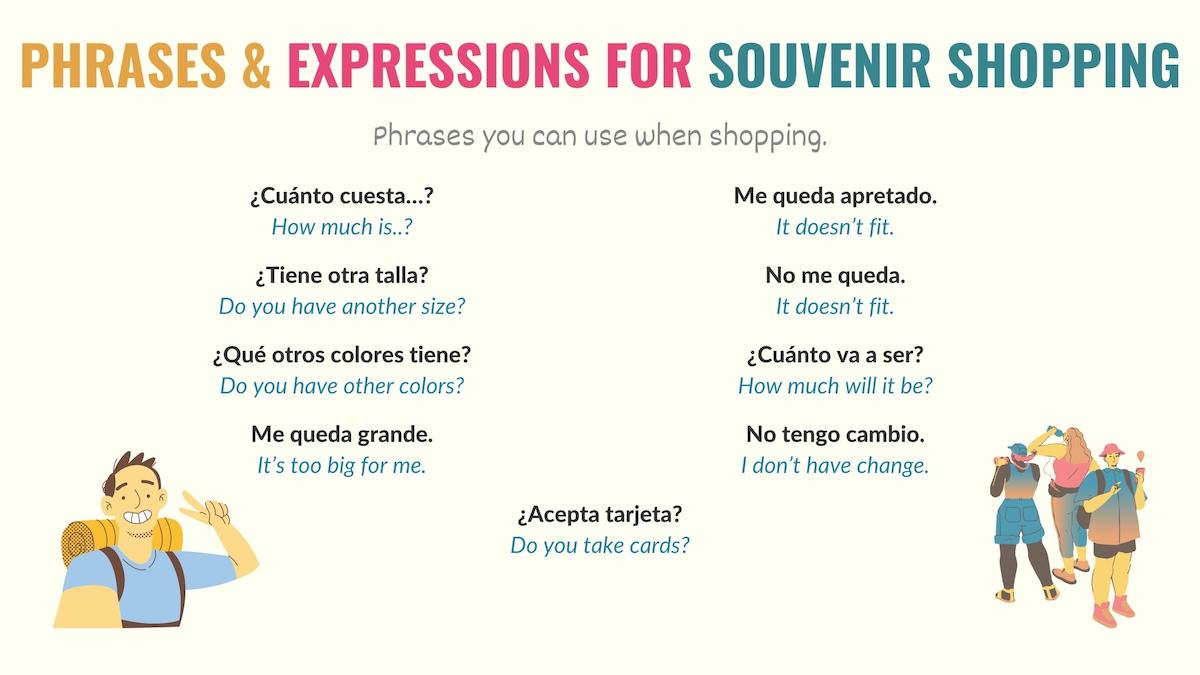
Even if you’re not a big spender, it’s likely that at some point you may want to do some shopping. These are the key expressions that you need in this situation:
- ¿Cuánto cuesta…? – How much is..?
- ¿ Tiene otra talla? – Do you have another size?
- ¿Qué otros colores tiene? – Do you have other colors?
- Me queda grande – It’s too big for me.
- Me queda apretado – It doesn’t fit.
- No me queda – It doesn’t fit.
- ¿Cuánto va a ser? – How much will it be?
- No tengo cambio – I don’t have change.
- ¿Acepta tarjeta? – Do you take cards?
On the other hand, these are some of the expressions that the clerk may use with you:
- ¿En qué le puedo ayudar? – How can I help you?
- Pregunte/Vea sin compromiso – You can ask/see, without any obligation.
- ¿Buscaba algo en especial? – Are you looking for anything in particular?
- ¿En qué talla? – What size?
- ¿Cómo le quedó? – How does it fit?
- ¿Buscaba algún color en especial? – Were you looking for a particular color?
- ¿Quiere que le muestre algo? – Would you like me to show you something?
- Es el último que me queda – It’s the last one.
- ¿Tiene un billete más pequeño? – Do you have a smaller bill?
- ¿Qué tamaño buscaba? – What size were you looking for?
- Aquí tiene – Here you go.
As for vocabulary, here are some common objects that you may find during your trip:

Check the examples below. Notice that you can combine this specific vocabulary with the basic words and questions you learned at the beginning of this article.
¿Tiene dulces típicos ? Do you have traditional candies ?
¿Podría darme tres llaveros ? Can you give me three keychains ?
Final Points: Spanish for Travelers
Many tourists visiting Spanish-speaking countries face communication difficulties. Let’s face it, there might be some people that speak English and will be able to help you. But chances are that, at some point, you’ll need to use some Spanish. When in Rome, do as the Romans do, right?
To help you with this, I’ve prepared this guide for tourists with basic expressions, questions and words that you’ll use in most traveling situations. Just remember that:
- Many of these travel phrases are built with ‘ querer’, ‘gustar’, ‘poder’ and ‘tener’ .
- Questioning words can take you pretty far if you combine them with the appropriate vocabulary.
- You use greetings and words to address people to sound more polite.
Hopefully, this guide will help you keep basic conversations. ¡Buena suerte and (disfruta) enjoy your vacation!
Spanish Resources for Tourists & Travelers
To make your trip as enjoyable as possible and get the most out of speaking Spanish, I recommend checking out the free resources below. Here’s my pro tip: Quickly read them and write down a “script” of the most common Spanish phrases, words and expression you’ll need to use while you travel.
Download the PDF with Spanish Phrases & Vocabulary for Traveling
Learning Spanish can be an incredible experience. But it can also be challenging at times, especially when you’re visiting a new place. I’ve created a free PDF for this guide which you can download with the key Spanish phrases, expressions and words you need to start speaking the language while still enjoying your vacation.
Related Guides & Spanish Vocabulary
If you’re traveling to Mexico or another Latin American, Spanish-speaking country then this guide will show you all the vocabulary and phrases you need to interact and order your food at a restaurant .
One of the best ways to get ready for a day of speaking a foreign language is by achieving an easy win as soon as possible at the start of the day. Here are different expressions that native speakers use to say ‘good morning’ in Spanish , which is easy to incorporate into your conversations as well as common Spanish greetings and farewells .
How to Ask for & Reserve a Hotel Room in Spanish : In this article you’ll find different questions and phrases that you and the hotel staff are likely to use when booking a hotel room.
Daniela Sanchez
¡Hola! Soy Daniela Sanchez, I've been studying Spanish professionally as well as teaching it in Mexico and online for over 10 years. I’ve taught Spanish to a wide array of foreigners from many backgrounds. Over the years, I've made it my mission to work hard on refining many challenging to understand grammar topics to make my students' learning experiences easier, faster and more enjoyable. Read More About Me
Recent Posts
Verbs Like Gustar in Spanish: Conjugations + Must-Know List
Gustar and verbs like gustar convey the feelings and emotions that the subject provokes on someone or something. Their key differentiator is that they inverse the sentence order. Unlike most...
Muy vs Mucho: Key Differences Explained (+ Examples)
Muy means ‘very’. It intensifies the qualities described by an adjective or another adverb. Mucho is the equivalent of ‘a lot’ or ‘very much’, and it conveys the intensity or degree of an...
Pin It on Pinterest

The Ultimate Guide to Spanish Travel Phrases: 95 Expressions You Need to Learn
If you’re looking to learn some basic Spanish for a trip to a Spanish-speaking country, going the whole “grammar and word list” route is a bit complex and time-consuming.
Good news: learning Spanish travel phrases instead won’t only help you learn Spanish you can use right away in conversations…
Contrary to what many people think, such phrases aren’t even just a quick “hack” but a valid long-term strategy to learn Spanish and other languages (as I outline in my article about Spanish for beginners ).
Anyway, more on that in a bit. First, let’s teach you some Spanish travel phrases!
1. Spanish Travel Phrases to Use Upon Arrival
First things first. If you’re planning to go to a Spanish-speaking country, learning how to greet people and be polite is a must. Otherwise, starting a Spanish conversation can be difficult.
No matter what kind of transportation you use to get to a Spanish-speaking place, you probably will have to deal with different kinds of workers.

The best thing you can do if you want to ask for information, or just catch some worker’s attention, is to be polite and show respect.
Keep in mind that if you want to be formal, you’ll say and conjugate verbs using “ usted ”. If you’re just talking with friends or someone you know, it’s enough to use “ tú ”.
Now, let’s see some chunks that will help you be ready on Arrival at your destination.
Spanish phrases to use upon arrival
Since you’re trying to improve your Spanish, we would recommend not to use “¿Habla ingles?” as the first alternative. If you do it, natives will try to find someone that could speak with you in English.
Yet, if you find that communicating becomes complicated, it may save your day.
On the other hand, using “ ¿Me puede ayudar? ” is among the best alternatives if you need help when arriving at the airport or any place. People will know immediately that you require assistance to do or get something.
If you use transportation like Taxis or Buses, dealing with luggage isn’t a challenge. But, if you take an airplane, and finding your luggage isn’t that easy, you can take advantage of the last phrase above.
No matter what your needs are, you should always use the following chunks if someone helps you or you ask for help.
Ask for help with these chunks
Saying “ Por favo r” and “ Gracias ” will not only help you to show respect. Also, they will indeed help you to “open” doors as people will always be willing to help you one more time.
For more airport Spanish, watch this video by Paulisima from Spring Spanish (a YouTube channel I co-founded):
2. Spanish Travel Phrases When You Need or Want Something
When traveling, Necesitar and Querer are two Spanish verbs that will help you in several situations.

There are plenty of Spanish chunks you can learn and use with Necesitar and Querer . However, we will stick to the most important.
Travel vocabulary in Spanish: Necesitar and Querer
With these Spanish travel phrases, you’ll get any problem solved. From your basic needs to things on your bucket list like going partying in a Spanish-speaking country.
3. Spanish Travel Phrases for Partying
Latin American people are among the most cheerful people all over the world, and hanging out with them is an unforgettable activity.
You could learn the following Spanish phrases when you’re out having the best time of your life! 😉
Spanish Phrases for When You’re Partying
There are plenty of other Spanish phrases for travel you could learn… and in general, learning as many fixed phrases as possible (or chunks, as we call them) will help you speak Spanish more effortlessly in all kinds of situations.
You can learn them through actual conversation, but also through Spanish podcasts, Spanish YouTube channels , or check out the best Spanish shows on Netflix.
If you’d like to learn more about learning Spanish through chunks, go ahead and request your free Spanish Chunking Starter Pack.
4. Spanish Travel Phrases When Asking for Directions
Although most Spanish speakers are quite friendly because of their culture and way of living, getting along with them on the streets may not be as simple as that. It’s because some people feel that talking to strangers isn’t appropriate or just “not safe”.
When approaching someone you don’t know on the streets, you must keep your distance and use some of the following Spanish phrases.
Approach someone with these chunks
The approach is the most important step. After, it’s time to ask or request what you need. If you’re lost and you need an address or need help, the following chunks will help you get the job done.
Travel tips: Get help with these Spanish chunks
After you get all you need and it’s time to move forward, saying “ Gracias ” to the ones who helped you is essential.
It’s always important to say thanks. It will help you end the conversation and leave an “ open door ” to ask for help again if necessary.
Time to see some of these phrases/chunks in action! Here’s Maria Fernanda, one of the Spring Spanish teachers:
5. Spanish Travel Phrases for the Hotel
If you’re a traveler there’s no doubt that you’ll face some challenges when looking for accommodation. Let’s imagine you need to get a room and you have to talk to the staff of a hotel. Depending on your needs, there are several things you’ll have to ask.

For example, room type, if the price includes breakfast, or other things like if you have access to the pool.
Solve challenges at a hotel with these Spanish phrases
Please note that if you have made a reservation, you’ll need either your name or a reservation number. If you get a reservation number, you would say “ Hice una reserva con número…. ” instead of “ Tengo una reserva a nombre de… ”. Learn all the Spanish numbers .
Getting a room with breakfast included is generally a great option. In that scenario, you could say “ Quiero el servicio de desayuno incluido ” (I want breakfast included). No matter what you ask or need, remember to use formal language and make use of “ usted ”.
Here’s a good video about checking into a hotel, brought to you by Paulisima from Spring Spanish :
6. Spanish Travel Phrases for the Restaurant
After you managed to pack out everything in your hotel, you might want to grab something at the restaurant. Learning the basic travel phrases to order food will definitely help you when you’re hungry!

Useful travel phrases in a restaurant
7. Spanish Travel Phrases for the Hospital
Smart travelers always keep some medical supplies in their bags to face any kind of emergency. However, sometimes taking some pills won’t solve the problem, and learning Spanish travel phrases to deal with these situations is essential.

The following Spanish travel phrases will help you with your health-related concerns.
Spanish travel phrases: Health-related concerns
Although the Spanish chunks above will help you deal with most medical situations, sometimes, it’s necessary to explain any symptoms you might have. You can use “ Yo tengo ” before any of the Spanish words for travel shown below.
They’ll help you explain your symptoms and any Spanish-speaking doctor will have no problem at the moment of giving you the right prescription.
Explain symptoms with Spanish chunks
Tip: To make yourself understood to native speakers, especially in more complex situations like this, this article on Spanish connectors will come in handy. It’s an often-overlooked part of language learning but it can help you a lot.
Another tip: Want to see (and hear) all those phrases in action? Watch this video by Spring Spanish teacher Maura:
8. Spanish Travel Phrases for Everyday Situations
Although we provided you with the most important phrases for every possible situation, there are still some useful phrases left. Check out the following table to learn some of the most used Spanish travel phrases for everyday situations.

Use these phrases in everyday situations
9. Spanish Travel Phrases: Your Key to Effortless Conversations in Any Spanish-Speaking Country
No matter what Spanish-speaking country you visit, keeping these Spanish phrases for travel will indeed help you deal with any scenario.
Let’s check out a Spanish conversation with some basic Spanish travel phrases:
Ana : Hola, disculpe… (Hello, excuse me…) Berta : ¡Hola! ¿En qué puedo ayudarte? (Hello! How can I help you?) Ana : ¿Sabe cómo llegar a esta dirección? (Do you know how to get to this address?) Berta : Sí, claro. ¿A qué dirección necesitas ir? (Yes, of course. What address do you need to go to?) Ana : Un hotel en la Calle Principal. (A hotel on Main Street.) Berta : Está cerca. Camina dos cuadras hacia el oeste. (It’s nearby. Walk two blocks west.) Ana : Hice una reserva con número 16. (I made a reservation with the number 16.) Berta : Perfecto. Disfruta tu estadía. (Perfect. Enjoy your stay.) Ana : ¡Gracias! (Thank you!) Berta : De nada. ¡Que tengas un buen día! (You’re welcome. Have a nice day!)
LISTEN TO THE WHOLE CONVERSATION :
Of course, if communicating becomes too complex, don’t hesitate to use the old life-saving phrase “ ¿Habla ingles? ”.
Requesting your free Spanish Chunking Starter Pack from Effortless Conversation is the best you can do if you’re planning to visit a Spanish-speaking destination. You’ll build your confidence and will feel much more comfortable when speaking Spanish.
Lukas is the founder of Effortless Conversations and the creator of the Conversation Based Chunking™ method for learning languages. He's a linguist and wrote a popular book about learning languages through "chunks". He also co-founded the language education company Spring Languages, which creates online language courses and YouTube content.
Similar Posts

Vegetables in Spanish: 100+ Words for Vegetables & Healthy Life
Whether you’re a foodie, a Spanish learner, or planning to travel to a Spanish-speaking country, knowing the words for fruits and vegetables in Spanish can…

5 TED talks in Spanish to learn Spanish: for beginner and intermediate learners
Are you looking for an entertaining and enriching way to learn Spanish? TED Talks (Technology, Entertainment, Design) in Spanish are an excellent option. These shot…

Complete guide to the Spanish alphabet: Pronunciation of 27 letters
¡Hola! Are you ready to learn Spanish? Well, what better way to start this journey than to learn the ABC (el abecedario) of the Spanish…

6 Best Ways to Learn Spanish While Driving: Radio, Podcasts, Audiobooks & More!
Do you want to make the most of your time in the car and learn Spanish while driving? In this blog post, we will share…

Easy Spanish sentences: your beginner’s guide to effortless language learning and speaking Spanish
Welcome to Easy Spanish Sentences, your beginner’s guide to effortless language learning! Whether you’re a traveler, student, or someone looking to brush up on Spanish,…

The Ultimate Guide To The Spanish Verb Estar: Conjugation + Examples
When studying Spanish, one of the trickiest topics that shows up in your way is the use of two verbs ser vs estar, instead of…
Leave a Reply Cancel reply
Your email address will not be published. Required fields are marked *


Travel Spanish: 70+ Essential Phrases for Your Trip
Updated on January 28, 2024 by Lou Mac
So you’re planning to visit a Spanish-speaking country (woohoo!). But how much language prep have you done for your trip?
Knowing basic travel Spanish is essential for any trip: for communicating with locals to find the best restaurants, asking for directions, and perhaps most importantly, in any emergency situation.
So, we’ve compiled this list of Spanish words and phrases that will be useful for when you immerse yourself in Hispanic culture.
If you’re unsure about the pronunciation of these phrases, this guide to Spanish pronunciation will help you understand all the basics!
Essential Travel Spanish Basics
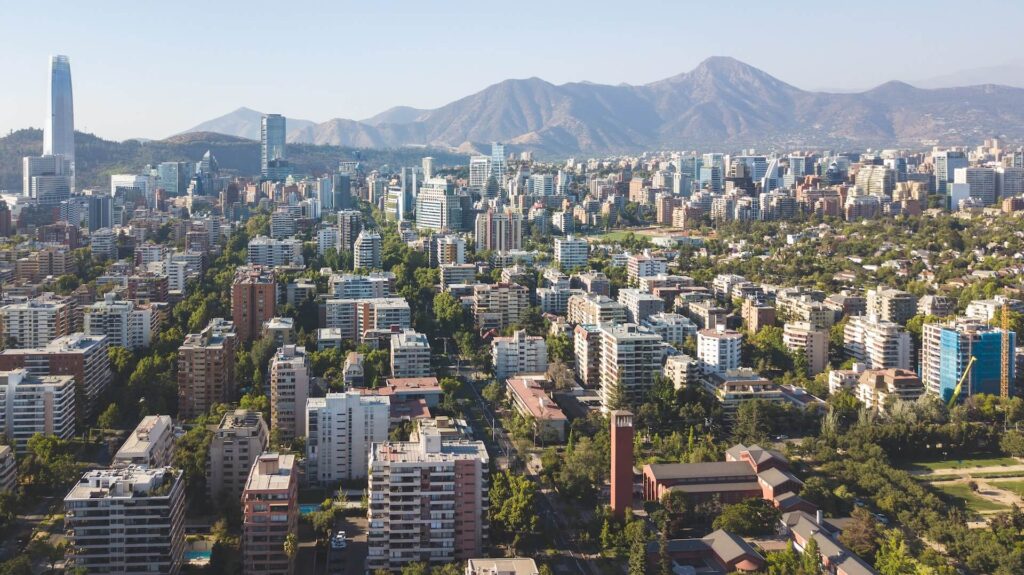
The following words and phrases are worth going over and over until you can say them pretty much automatically, as they will be some of the basic building blocks to your Spanish knowledge.
- Hablo español / No hablo español . — I speak Spanish / I don’t speak Spanish.
- ¿Tiene…? — Do you have…?
- Tengo… no tengo… — I have… I don’t have…
- Entiendo, no entiendo — I understand, I don’t understand
- ¿Entiende? — Do you understand?
- Quiero, no quiero — I want…, I don’t want… E.g. quiero un boleto, un taxi, un hotel — I want a ticket, a taxi, a hotel…
- Me gustaría, no me gustaría… — I would like…, I wouldn’t like… (This one is more polite)
- ¿Dónde está…? — Where is… ?
- ¿Cuánto cuesta? — How much does it cost?
- ¿Qué hora es? — What time is it?
How to Ask for Directions in Spanish
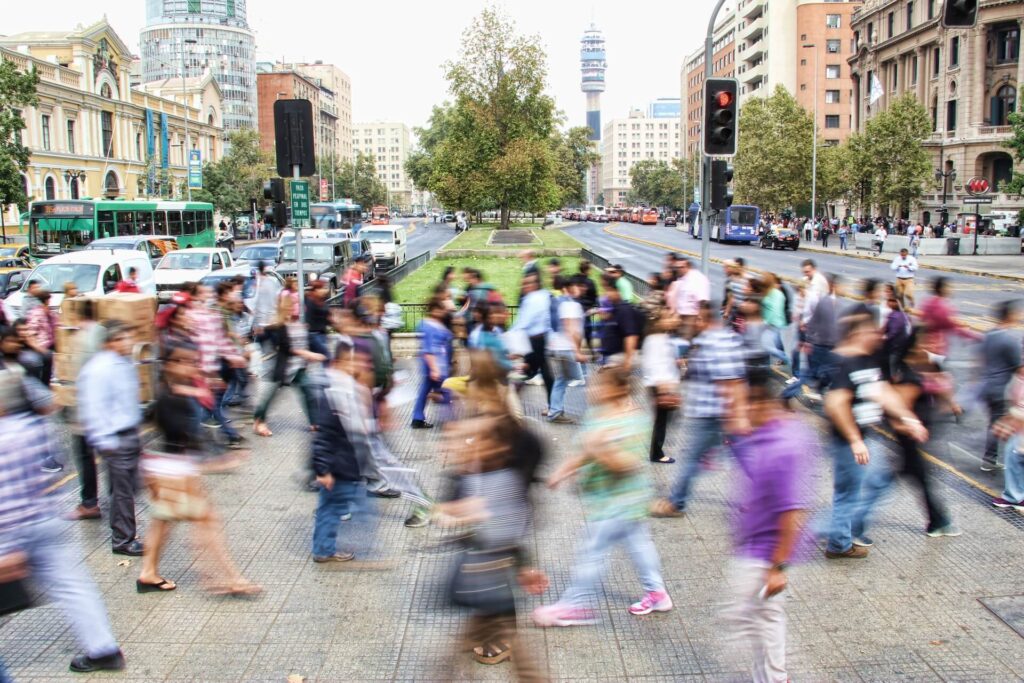
Learning how to ask for directions is perhaps not as essential as it was twenty years ago, before the development of the internet and Google Maps.
However, if you find yourself in a situation where you can’t use your cellphone (which can easily happen!), you should know the basic Spanish phrases and vocabulary for finding your way around.
- ¿Dónde está…? — Where is the…?
- ¿ Cómo llego al centro? — How do I get to the centre/downtown?
- ¿Hay un restaurante bueno por aquí? — Is there a good restaurant around here?
- Busco un hotel/hostal — I’m looking for a hotel/hostal
With the phrases above you can ask for directions to other places, such as the bank, a bathroom etc. Here is some useful vocabulary to substitute into these phrases:
- El baño — the bathroom
- Un tren — a train
- La calle — the street
- Un cajero automático — an ATM
And lastly some practical vocab to help you understand the helpful directions people give you:
- A la derecha — to the right
- A la izquierda — to the left
- Derecho — straight ahead
- Una cuadra — a block
- Sigue… — keep going…
How to Ask for Help in Spanish

While there are many things you must learn if you want to speak Spanish, knowing how to ask for help is key to surviving in a Spanish-speaking country.
A few phrases or words will make things much easier if an emergency occurs or you are in trouble, including the following:
Note: These examples use the “formal” way of speaking to people.
- ¿Puede ayudarme? — Can you help me?
- ¡Ayuda! — Help!
- Necesito ayuda — I need help
- ¡Llame a la policía! — Call the police!
- ¡Llame a la ambulancia! — Call the ambulance!
- Ayúdeme, por favor . — Help me, please
- ¿Podría ayudarme, por favor? — Could you help me, please?
- ¿Podría explicarlo, por favor? — Can you explain it to me, please?
- ¿Cómo se escribe…? — How do you write…?
- ¿Cómo se dice…? — How do you say…?

Spanish for Medical Emergencies

It’s also important to know words in Spanish that can help us deal with a medical emergency.
- No me siento bien — I don’t feel well
- ¿Dónde está el hospital más cercano? — Where is the nearest hospital?
- ¿Puede llamar a la ambulancia? — Can you call the ambulance?
- ¿Dónde está la farmacia? — Where is the drugstore/pharmacy?
- ¿El doctor habla inglés? — Does the doctor speak English?
- ¿Necesito medicinas? — Do I need medication?
- ¿Qué medicina necesito? — What medicine do I need?
- Tengo un seguro de salud internacional — I have international health insurance
Navigating Your Accommodation in Spanish
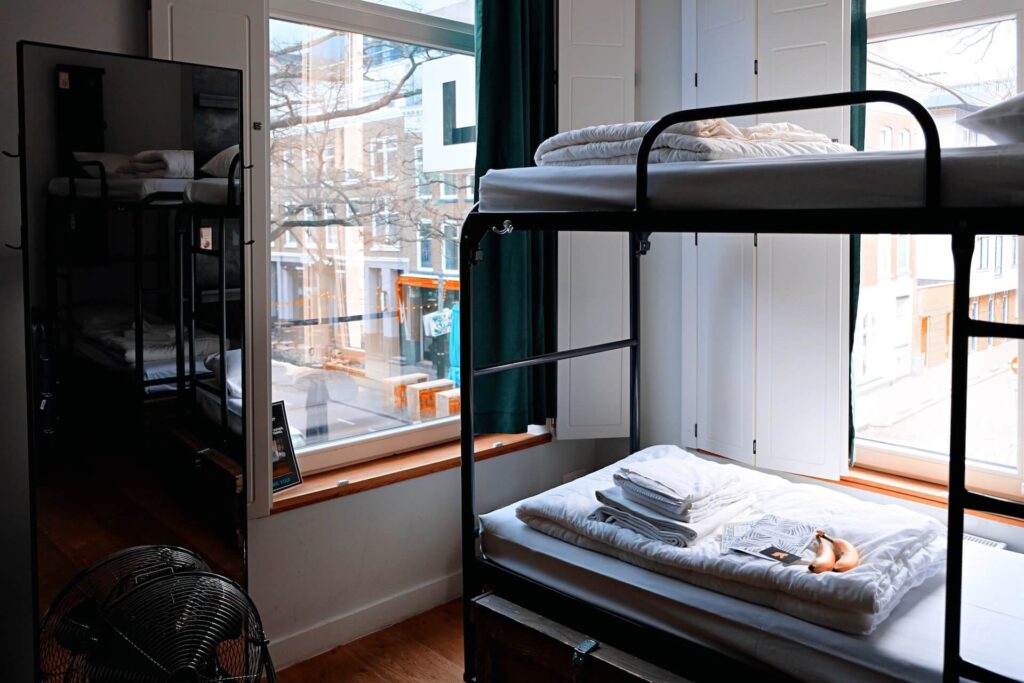
Once you’ve found the perfect place to stay, here’s how to get yourself checked in and comfortable:
- Tengo una reserva a nombre de Harry Potter — I have a reservation under the name Harry Potter
- Necesito un hotel / un cuarto / un cuarto con baño — I need a hotel / a room / a room with a bathroom
- Me gustaría quedarme por dos noches — I would like to stay for two nights
- ¿Tiene una habitación doble? — Do you have a double room?
- ¿Dónde está la piscina / gimnasio? — Where is the pool/gym?
- ¿A qué hora es el desayuno? — What time is breakfast?
- ¿Cuál es la contraseña de WiFi? — What is the WiFi password?
Essential Spanish for Eating Out

The most important travel Spanish phrases to add to your mental toolbox are those surrounding eating out—either because we are hungry (obviously) or we want to experience the wonderful local gastronomy.
This list of expressions and words could save your life (well, your stomach) on your next adventure in a Spanish-speaking country.
In addition to the vocabulary below, a useful resource are these scenario podcast episodes we did about ordering vegetarian food in Spanish , and ordering coffee in Spanish .
To make things easier, we have divided these restaurant-related words and phrases into several categories. Check them out below:
When Arriving or Booking a Table
- Quisiera reservar una mesa — I would like to book a table
- Quisiera reservar una mesa para dos — I would like to book a table for two
- ¿Tiene alguna mesa disponible? — Is there any available table?
- Tengo una mesa reservada a nombre de Hermione Granger — I have booked a table under the name of Hermione Granger
When Ordering
- ¡Camarero / garzón! — Waiter !
- ¿Podría traerme el menú, por favor? — Could you bring me the menu, please?
- ¿Qué me recomienda? — What do you recommend?
- ¿Podría recomendarme un plato local, por favor? — Can you recommend me a local dish, please?
- Para beber, me gustaría… — To drink, I would like…
- Como entrada, me gustaría.. . — As a starter, I would like …
- Como plato principal, me gustaría… — For the main course, I would like…
- De postre, me gustaría… — For dessert, I would like…
During the Meal
- Perdone, ¿podría traerme…? — Excuse me, could you bring me…?
- Perdone, ¿podría traerme más servilletas? — Excuse me, could you bring me some more napkins?
- Perdone, ¿podría traerme otra copa de vino ? Excuse me, could you bring me another glass of wine? (learn this one by heart 🍷)
- La comida está muy rica . — The food is delicious
- La carne está demasiado hecha — The meat is overcooked
- La carne está poco hecha — The meat is undercooked
When Paying and Leaving
- La cuenta, por favor — The bill, please
- Estaba todo muy rico, gracias — Everything was very tasty, thanks
- Quisiera pagar con tarjeta — I’d like to pay by card
- Quisiera pagar en efectivo — I’d like to pay in cash
- Creo que hay un error — I think there’s a mistake
Lastly, if you’re a foodie like me, you might want to know some food recommendations. Click here to learn about the different foods you must try if you’re visiting Chile!
Resources to Learn More Travel Spanish
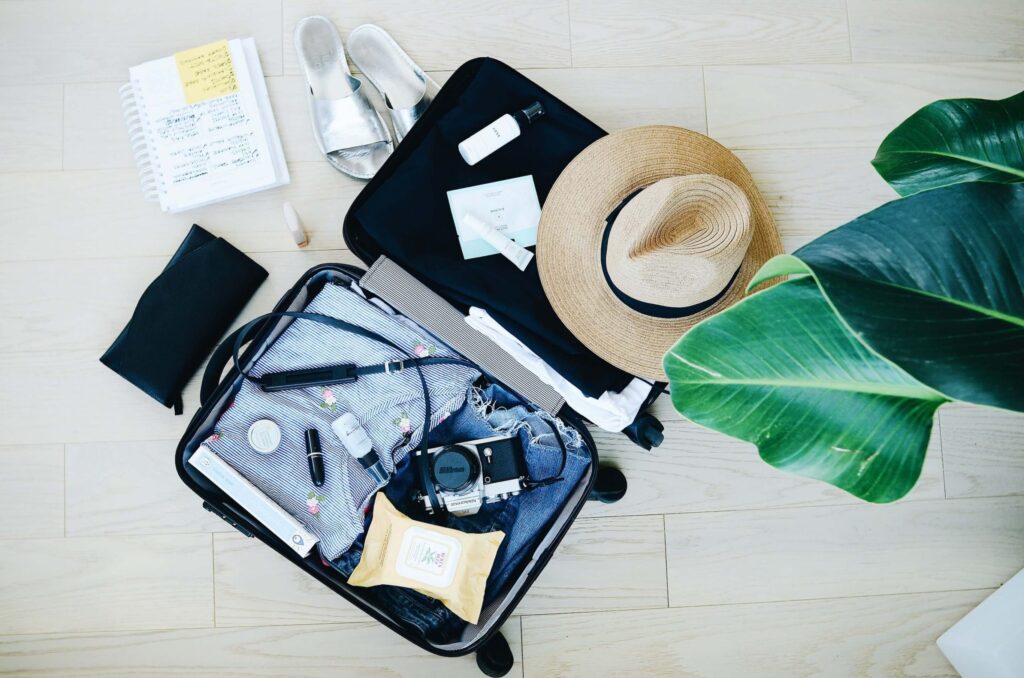
If you’ve decided you want to know a bit more than just the survival Spanish, here are a few resources to kick-start your Spanish journey.
- Seeing in Spanish Podcast. Our own language learning and travel podcast aims at helping you self-learn Spanish to make your travels unforgettable. To start, check out this episode on how to learn Spanish on your own .
- Duolingo. I think it’s safe to assume you know what Duolingo is! While it often gets a bad rap, it’s all about how you use Duolingo which makes the difference!
- YouTube Videos. Videos such as this video on top 20 travel Spanish phrases you should know are a great way to hear how phrases we learnt in this article are actually pronounced.
It’s also worth remembering that Spanish changes depending on what country you’re in, so you might also want to consider learning a specific Spanish dialect.
With these survival Spanish words and phrases, your next trip will be much easier and more memorable.
Now you can move on to getting excited for your adventure!
Top 50 Spanish Phrases for Tourism and Travel
Discover the top 50 spanish phrases for tourism and travel. learn essential spanish expressions for your next trip. useful phrases for tourists in spanish., introduction.
Planning a trip to a Spanish-speaking country? Familiarizing yourself with some essential Spanish phrases can greatly enhance your travel experience. In this article, we have compiled the top 50 Spanish phrases for tourism and travel that will help you communicate effectively and navigate various situations during your trip.
- 1. Hello/Hi - Hola
- 2. Good morning - Buenos días
- 3. Good afternoon - Buenas tardes
- 4. Good evening - Buenas noches
- 5. Please - Por favor
- 6. Thank you - Gracias
- 7. You're welcome - De nada
- 8. Excuse me - Disculpe
- 9. I'm sorry - Lo siento
- 10. Yes - Sí
- 11. No - No
- 12. I don't understand - No entiendo
- 13. Do you speak English? - ¿Hablas inglés?
- 14. Could you help me, please? - ¿Podrías ayudarme, por favor?
- 15. Where is...? - ¿Dónde está...?
- 16. How much does it cost? - ¿Cuánto cuesta?
- 17. Can you recommend a good restaurant? - ¿Puedes recomendar un buen restaurante?
- 18. I would like... - Me gustaría...
- 19. Can I have the bill, please? - ¿Me puedes traer la cuenta, por favor?
- 20. I need a taxi - Necesito un taxi
- 21. Where is the bathroom? - ¿Dónde está el baño?
- 22. I'm lost - Estoy perdido/a
- 23. Is there a pharmacy nearby? - ¿Hay una farmacia cerca?
- 24. Can you show me on the map? - ¿Puedes mostrarme en el mapa?
- 25. What time is it? - ¿Qué hora es?
- 26. How do I get to...? - ¿Cómo llego a...?
- 27. Can I use your Wi-Fi? - ¿Puedo usar tu Wi-Fi?
- 28. Is it safe here? - ¿Es seguro aquí?
- 29. Can I try this on? - ¿Puedo probármelo?
- 30. Can you take a picture of me, please? - ¿Puedes tomarme una foto, por favor?
- 31. I'm allergic to... - Soy alérgico/a a...
- 32. Where can I buy tickets? - ¿Dónde puedo comprar boletos?
- 33. Do you accept credit cards? - ¿Aceptan tarjetas de crédito?
- 34. Is there a bank nearby? - ¿Hay un banco cerca?
- 35. Can you recommend a good hotel? - ¿Puedes recomendar un buen hotel?
- 36. What's the weather like today? - ¿Cómo está el clima hoy?
- 37. Can you speak slower, please? - ¿Puedes hablar más despacio, por favor?
- 38. What is your name? - ¿Cómo te llamas?
- 39. Nice to meet you - Mucho gusto
- 40. Where are you from? - ¿De dónde eres?
- 41. I love this place - Me encanta este lugar
- 42. Can you help me with my bags? - ¿Puedes ayudarme con mis maletas?
- 43. Is there a tourist information center nearby? - ¿Hay un centro de información turística cerca?
- 44. Can you recommend any local attractions? - ¿Puedes recomendar alguna atracción local?
- 45. Is this seat taken? - ¿Está ocupado este asiento?
- 46. Can you call a taxi for me? - ¿Puedes llamar un taxi para mí?
- 47. Can you repeat that, please? - ¿Puedes repetir eso, por favor?
- 48. Can I have a menu, please? - ¿Puedo tener un menú, por favor?
- 49. What's your recommendation? - ¿Cuál es tu recomendación?
- 50. Have a nice day! - ¡Que tengas un buen día!
Learning a few key phrases in Spanish can make your travel experience more enjoyable and rewarding. With these top 50 Spanish phrases for tourism and travel, you'll be able to communicate effectively, ask for assistance, and engage with locals during your journey. Start practicing these phrases and embrace the rich culture and language of your destination!

Discover a better way to learn Spanish online.
Regular conversation practice is the key to fluency. There's no better way to build confidence, develop comprehension skills and an authentic accent. It's fun, effective and guaranteed to get you talking.
Start for free today. We've helped thousands of students learn a new language online and we can help you too.

Ayami Hamakawa
Radu Titirca

David Askill
John Barton

Sharyn Doherty
Daniel Moore
Get Started Today Bring Learning Spanish to Life
Native teachers, great pricing, ultimate flexibility.
Sign up and take a free trial lesson with no obligation. No credit card required.
SPANISH TOPICS
Success stories, learning spanish.
Get a free trial lesson with a native speaking online Spanish tutor today.
Unconventional language hacking tips from Benny the Irish polyglot; travelling the world to learn languages to fluency and beyond!
Looking for something? Use the search field below.
Home » Articles » 60+ Really Useful Spanish Phrases for Conversation and Travel
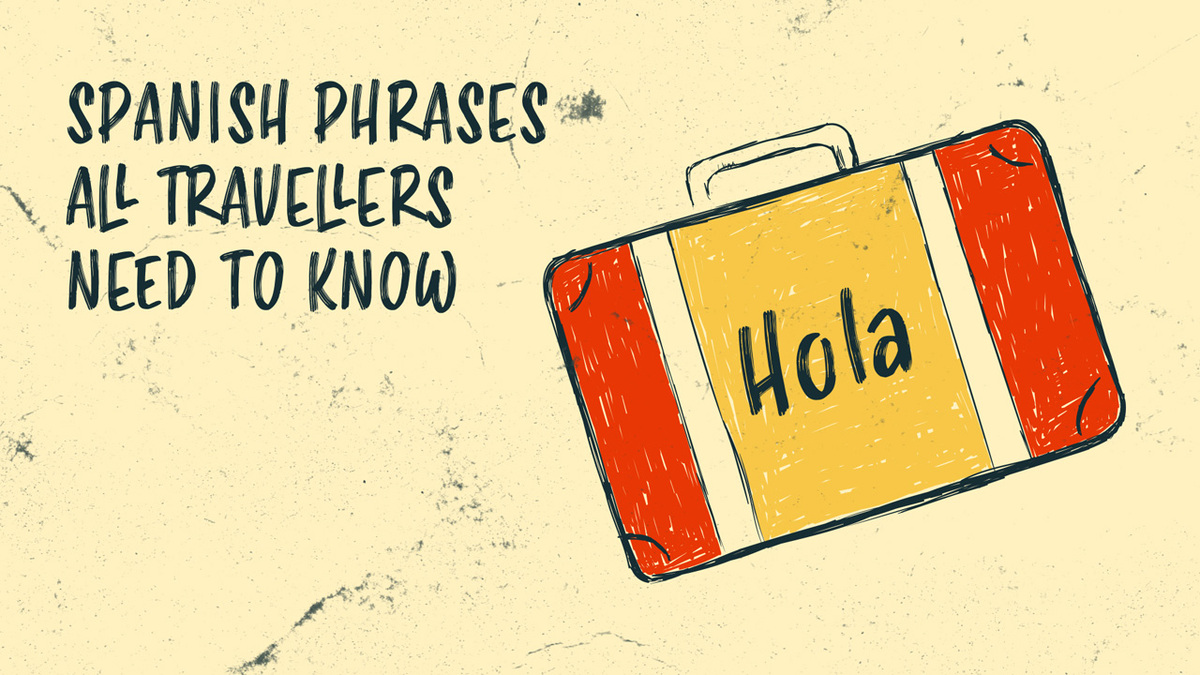
Full disclosure: This post contains affiliate links. ?
written by Benny Lewis
Language: Spanish
Reading time: 15 minutes
Published: Mar 18, 2022
60+ Really Useful Spanish Phrases for Conversation and Travel
Planning a trip to a Spanish-speaking country? Or prepping for a Spanish conversation on Skype ? Then you need to get some simple, really useful Spanish phrases under your belt!
There are tons of benefits in learning to speak the local language when you travel, even if you just learn a few phrases. People really appreciate it when you speak to them in their own language, and there’s a good chance you’ll make memories you can treasure for life .
I started out learning Peninsular Spanish (mainland Spain), but through my travels I’ve grown accustomed to various dialects of Spanish . It always made these adventures much more enjoyable.
By learning a few basic Spanish phrases for travel, you can create lasting friendships all over the world. Making friends, enjoying the culture, and learning about the best spots only locals know – that’s the real dream of travelling, isn’t it?
So let’s get you prepared!
Table of contents
Basic spanish vocabulary for travel, “good morning” in spanish, “nice to meet you” in spanish, “my name is…” in spanish, “what’s your name” in spanish, “have a good day” in spanish, “see you soon” in spanish, “goodbye” in spanish, “please” in spanish, “thank you” in spanish, “you’re welcome” in spanish, “excuse me” in spanish, “i’m sorry” in spanish, “how are you” in spanish, “what’s up” in spanish, “what are your hobbies” in spanish, “i like…” and “i don’t like…” in spanish, “where are you from” in spanish, talking about the weather in spanish, “i would like…” in spanish, “can i see a menu, please” in spanish, “check/bill, please” in spanish, “cheers” in spanish, “how much does it cost” in spanish, “do you have…” in spanish, “i need…” in spanish, “i want…” and “i don’t want…” in spanish, “where is…” in spanish, direction words in spanish, “what time is it” in spanish, “what is this” in spanish, the 5 w’s in spanish, “how” in spanish, “can you help me” in spanish, “can you say that again” in spanish, the 5 best words and phrases to know when traveling to a spanish speaking country, speak. experience. enjoy. use the spanish travel phrases you know.
Before we jump onto the Spanish phrases you will need to use in your travels, you might want to learn a couple of basic Spanish words related to travel.
“Travel” in Spanish is viaje , which is also used for “trip”. If you wanted to say “road trip”, for example, you could say viaje or viaje de carretera .
The verb “to travel” is viajar . Luckily, it’s one of the regular Spanish verbs, meaning that its conjugation follows the pattern of other verbs ending in -ar . (You can read this post on basic Spanish conjugation if you want to learn how to conjugate viajar .)
Now you’re ready to discover 60+ more Spanish phrases for travel.
How to Say “Hello!” in Spanish
Of course, you can’t start a conversation without knowing some Spanish greetings. So here are some common Spanish phrases to get started.
This is the most common greeting is hola . You can use this one at any time of day, and it always sounds natural.
You can also try the following:
To greet someone in the morning ( la mañana ), you say buenos días . During the afternoon ( la tarde ), you can switch to buenas tardes (“good afternoon”), which is also in the plural form.
Related Learning: Hello in Spanish: “¡Hola!” and 70+ More Spanish Greetings for All Occasions
When you’re introduced to someone, you can say mucho gusto . It translates as “pleasure”, like “It’s a pleasure”. But that’s a bit formal in English, so a more accurate translation would be “Nice to meet you”. In extra formal situations, you can say un placer .
When you introduce yourself, you can start by saying Me llamo _____. My favourite conversation starter is Hola, soy Benny (“Hi, I’m Benny”). This version is a more conversational way to say your name, but me llamo is more straightforward.
Once you’ve introduced yourself, you should ask what the other person’s name is (if they don’t beat you to it). To ask someone else’s name, you say ¿Cómo te llamas?
Say goodbye by saying ¡Tenga un buen día! to wish someone well with the rest of their day. If it’s someone you’re close to, you can say it more casually: que tengas un buen dia .
If you’ve made plans to meet with someone again, throw in a friendlier phrase: ¡Hasta luego!
You can say adiós for “goodbye”, or cuídate to say “take care”.
Related Learning: 65+ Ways to Say “Goodbye” in Spanish
Being Polite in Spanish as You Travel
Naturally, you want to make sure you can express yourself in a polite way so you don’t offend anyone. So memorize these important phrases to mind your manners.
When asking for something, make sure to include por favor to say “please”. It usually gets added on at the end of a sentence, much like in English.
Make sure to always say thank you! You can say gracias , or muchas gracias if you want to say “thank you very much”.
If someone says thank you, you can reply with de nada which means “you’re welcome” or “no problem”. You could also use mucho gusto here to say “it was my pleasure”.
There are a few main ways to say this in Spanish, depending on how you use it. If you need a favour, you say perdone . And if you need to get by someone, you would say perdón , disculpe or con permiso (this is a bit more polite, like “pardon me”).
Related Learning: ¡Lo Siento! and 25 More Ways to Say “Sorry” in Spanish
If you did something wrong or need to apologise for something, say lo siento . As in English, you can also use disculpe (“excuse me”) for an apology in some situations.
Chit Chat Phrases in Spanish
Now it’s time to start diving into useful Spanish phrases for conversation!
I’m covering some light small talk to get you going, but make sure to check out my Spanish conversation starters to get into deeper discussions.
There are several ways to ask how someone is doing, but the most common and direct translation is ¿Cómo estás? or ¿Cómo está usted? (which is more polite). If someone asks you this question, you can reply bien for “I’m well” or así así for “so-so”. Follow with ¿Y tú? (“And you?”) to keep the conversation going.
For a more casual greeting, you can use the expression ¿Qué tal? You’ll hear this one quite a bit, as it’s more natural in everyday conversation – like “what’s up” or “how’s it going?” When someone says this to you, you can answer the same way as above: bien (or muy bien , meaning “very well”).
Start getting to know others by asking what they like to do in their spare time. You can ask ¿Cuáles son tus aficiones? for “What are your hobbies?” Un hobby and un pasatiempo are other common ways to say “hobby”. You can also ask ¿Qué haces para divertirte? which means “What do you like to do for fun?”
You asked them about their interests, and now they’ve asked you. So how do you express what you like? You say me gusta (“I like”) or no me gusta (“I don’t like”). For instance, me gusta viajar (“I like to travel”) or No me gusta la pizza (“I don’t like pizza”). Just kidding with that last one – who doesn’t like pizza?
Another small talk question that helps to keep the chit-chat going. You can ask someone where they’re from by saying ¿De dónde eres?
Weather talk isn’t exactly what you would think of when learning Spanish phrases for travel. However, it’s always handy to know a few words or phrases about the weather, as it’s universal small talk.
The word for “weather” is el clima or el tiempo , and you can say things like ¡Buen clima hoy! (“Nice weather today!”). Or, the opposite: El mal tiempo hoy, eh (“Bad weather today, huh”).
Other phrases you can use are hace calor hoy (“It’s hot today”) and hace frío hoy (“It’s cold today”).
Related Learning: Talking About the Weather in Spanish: 77 Spanish Weather Words (and Phrases) that are Good to Know
Out on the Town & Getting Around: Key Spanish Phrases for Tourists
When you’re travelling, it helps to know how to express yourself when you’re out to eat, shopping, or trying to find your way around!
If you want to ask for something, use me gustaría… as the basic Spanish stem to get started. A few common things you might ask for: food, drinks, or to buy something.
If you want to ask for something to eat, say me gustaría comer… For something to drink, you say me gustaría beber… And to say what you would like to buy, you say me gustaría comprar…
Add the word for what you’re trying to get at the end, like Me gustaría comprar un periódico (“I would like to buy a newspaper”).
To make it even easier, you could always point to what you want and say esto for “this.” So in that last example, you could hand the cashier the newspaper you want to buy and say Me gustaría comprar esto (“I’d like to buy this”).
If you’re out to eat and trying to figure out what you want to ask for, you can first ask to see the menu. Un menú, por favor (“A menu, please”) will do the trick.
Related Learning: Spanish Food Vocabulary: A Guide to Spanish Cuisine and Spanish Eating Culture — with Lots of Spanish Vocab
When you’re finished with your meal, you’ll need to ask for the check/bill. You can ask for it by saying La cuenta, por favor.
Of course, you need to know how to toast at happy hour! Whenever you meet with someone over drinks, say ¡Salud! for “Cheers!”
When you’re out shopping, you’ll likely want to know how much everything is. To ask the price, say ¿Cuánto cuesta eso? which is “How much does it cost?”
To ask if someone has something you need, you can say ¿Tienes…? followed by the word for what you need. Are you at the hotel and in need of toiletries, like toilet paper? Ask the receptionist ¿Tienes papel higiénico?
Or, you could say “I need” to express what you’re looking for. You say necesito… and then whatever word you need. Like in the last example, you could say Necesito papel higiénico (“I need toilet paper”).
If you remember those old Taco Bell commercials with the little Chihuahua , you probably already know this one: Yo quiero Taco Bell . Any time you want something, you can say yo quiero and any time you don’t want something, you say yo no quiero .
When you’re travelling, it’s easy to get a bit lost or unsure of where things are located. You can use the phrase ¿Dónde está…? to ask for directions or where something is. Some basic Spanish sentences that may be helpful:
- ¿Dónde puedo encontrar un taxi? (“Where can I find a taxi?”)
- ¿Dónde hay un banco? (“Where is a bank?”)
- ¿Dónde está ____ hotel? (“Where is (your hotel’s name) hotel?” )
- ¿Dónde está el baño? (“Where is the bathroom?”)
If you’re going to ask where something is located, it’s helpful to know the words to understand the answer. Here are some basic direction words you should know:
- Izquierda (“Left”)
- Derecha (“Right”)
- Siga recto (“Go straight ahead”)
- Gire (“Turn”)
- Aquí (“Here”)
- Allí (“There”)
- Adelante (“Up ahead”)
- Deténgase aquí (“Stop here”)
Don’t have a watch? Ask someone for the time by saying ¿Qué hora tienes? You can also ask more casually with ¿Qué hora es?
One of the most useful basic Spanish phrases you can know when learning the language: ¿Qué es esto?
Anytime you don’t know the word for something, you can ask by saying “What is this?” Then you can keep expanding your Spanish vocab!
Ask the Important Questions
To really find your way around or continue a conversation, you need to know how to ask questions. From asking about a person to trying to understand what someone is saying, these words are crucial to communication, learning, and building your Spanish sentences.
Who, what, when, where, why. If you know these words, you can get the answers you need.
- ¿Quién…? (“Who”)
- ¿Qué…? (“What”)
- ¿Cuándo…? (“When?”)
- ¿Dónde…? (“Where?”)
- ¿Por qué…? (“Why?”)
To ask “how,” you say ¿Cómo…? And to ask how many, you ask ¿Cuántos? Plus, if you need to know which things, you can ask ¿Cuál? means “Which?”
If you’re in need of help while out, you can ask ¿Puede ayudarme? This is a good one to remember, too, because if you’re lost or you’re shopping and have a question, you can get their attention with Disculpe. ¿Puede ayudarme?
For an emergency, shout ¡Auxilio! (“Help!”)
When you’re starting out learning a language, it’s hard to keep up with native speakers sometimes. If you didn’t catch what they said, you can ask ¿Puede repetirlo, por favor? (“Can you say that again, please?”).
If you still can’t understand, try asking them to say it slowly by asking ¿Puedes hablar más despacio? (“Can you speak more slowly?”)
If all else fails, you can ask ¿Hablas inglés? (“Do you speak English?”) Although, I believe the smartest decision you can make to gain fluency is to aim for full immersion and avoid English when possible.
If you’re already on a plane towards Cancún or Barcelona, you might not have the time to learn 60+ Spanish Phrases for travel.
Assuming that you know the basics ( hola , adiós , sí , no , por favor , gracias ), these are the five phrases I would recommend you learn before landing:
- ¿Cuánto cuesta? – “How much is it?”
- ¿Puede hablar más despacio? – “Can you speak more slowly?”
- _¿Dónde está ___ ? – “Where is _____?”
- ¿Puede ayudarme? – “Can you help me?”
- Me gustaría ______ – “I would like ______”
Now you’re ready for your travels and prepared to start having some basic Spanish conversations! The locals will appreciate your efforts, and you’ll have a more meaningful cultural experience.
If you need help with your pronunciation, check out this online pronunciation dictionary called Forvo . And if you’d like more prep leading up to your travels (or for deeper studying!), check out my tips for Spanish home immersion .
- The 10 Best Ways to Learn Spanish (Be Fluent Faster!)
- Spanish Uncovered Review — An Honest, Detailed Review on Learning Spanish with Story
- ¡Lo Siento! and 25 More Ways to Say “Sorry” in Spanish
- Best Podcast to Learn Spanish? SpanishPod101 In-depth Review With Pros and Cons
- Things in Spanish: 137 Spanish Words You Need to Know for Everyday Stuff
Benny Lewis
Founder, Fluent in 3 Months
Fun-loving Irish guy, full-time globe trotter and international bestselling author. Benny believes the best approach to language learning is to speak from day one .
Speaks: Spanish, French, German, Italian, Portuguese, Esperanto, Mandarin Chinese, American Sign Language, Dutch, Irish
Have a 15-minute conversation in your new language after 90 days

A Useful Guide to Spanish Travel Phrases

Written by Diana Luciana
August 25, 2022.
Are you planning a long-awaited trip to a Spanish-speaking country? 🌎
Your trip can be so much more fun and meaningful if you know how to say travel in Spanish, and communicate with the locals—how many times have you missed out on a secret spot because you didn’t speak the language?—and find your way around with this guide to Spanish travel phrases and words. From getting to the airport to ordering food in Spanish at the restaurant, we got you covered.
How do you say travel in Spanish?
We put together a list of essential Spanish travel phrases, need-to-know vocabulary, and tips for traveling in Spanish. Keep in mind that you don’t need to speak Spanish fluently to get the most out of your trip and have meaningful interactions. A basic travel Spanish vocabulary will get you a long way, and the locals would definitely appreciate the effort. And when you don’t understand or aren’t sure of what’s being said, simply ask ¿Habla inglés? (Do you speak English?)
Key phrases in Spanish for travelers
Here are some key Spanish phrases and greetings you should know. You can use them in any situation (asking for directions in Spanish, asking questions in Spanish, meeting new people in Spanish, and so on.) It’s a mini Spanish 101 lesson:
Spanish greetings
- Buenos días — Good morning
- Buenas tardes — Good afternoon
- Buenas noches — Good evening
- ¿Cómo te llamas? — What’s your name?
- Me llamo… — My name is…
- Mucho gusto. Encantado — It’s a pleasure to meet you.
- ¿Cómo te va? / ¿Qué tal? / ¿Qué hay? — How’s it going?
- ¿Cómo estás? — How are you?
- Bien, gracias / Muy bien, gracia s — Good, thank you / Very well, thank you
- Por favor — Please
- Perdón / Lo siento — Sorry
- ¿Habla inglés? — Do you speak English?
- No hablo español. — I don’t speak Spanish.
- No entiendo bien el español. — I don’t understand Spanish well.
- ¿Tiene…? — Do you have…?
- ¿Entiende? — Do you understand?
- Yo entiendo / yo no entiendo — I understand / I don’t understand
- Hágame el favor de hablar más despacio. — Speak more slowly, please.
- Escríbalo, por favor. — Write it down, please.
Essential Spanish
- ¿Dónde está…? ¿Dónde están…? — Where is…? Where are…?
- ¿Por dónde se va a…? / ¿Cómo puedo llegar a…? — How do you go to…?
- ¿Dónde estamos aquí en el mapa? — Where are we on the map?
- ¿Está lejos? ¿Está por aquí? — Is it far away? Is it near here?
- Busco… — I’m looking for…
- ¿Me podría ayudar? — Can you help me?
- Estoy perdido (for men) / perdida (for women) . — I’m lost.
- ¿Hay alguien que hable inglés? — Is there anyone who speaks English?
- Disculpe / Con permiso / Perdóname — Excuse me
- ¿Quién? — Who?
- ¿Qué? — What?
- ¿Cuándo? — When?
- ¿Cómo? — How?
- ¿Cuánto? — How much?
- ¿Cuántos? — How many?
- ¿Por qué? — Why?
- ¿A qué hora? — What time?
- ¿Por cuánto tiempo? — How long?
- ¿Cada cuánto? — How often?
- Yo quiero / yo no quiero — I want / I don’t want
- Yo tengo / yo no tengo — I have / I don’t have
How to say airport in Spanish
Imagine yourself getting off the plane ( el avión )—new place, new language, new everything—ready to start your vacation. Even though English is widely spoken, knowing the basic Spanish travel vocabulary for airports and planes will make your trip easier. And you will start your vacation on the right foot, confident that you can find your way in any situation.
Essential travel vocabulary in Spanish for when you are at the airport ( el aeropuerto ):
Spanish travel vocabulary
Airport-specific vocabulary in Spanish
- la aduana — customs
- la aerolínea / la linea aerea — airline
- el asiento — seat
- el auxiliar de vuelo, la azafata — flight attendant
- el baño — bathroom
- el boleto — ticket
- confirmar una reservación — to confirm a reservation
- el destino — destination
- el equipaje — luggage
- el horario, el itinerario — schedule
- la maleta — suitcase
- el pasajero, la pasajera — passenger
- el pasaporte — passport
- el regreso — return
- la salida — departure, exit
- la tarifa — price
- la tienda libre de impuestos — duty-free shop
- el viaje — journey, trip
- el vuelo — flight, wing
Spanish travel phrases
Useful phrases at the airport in Spanish
- ¿Cuándo sale el avión? — When does the plane leave?
- Mi vuelo es a las … en punto. — My flight is at … o’clock.
- ¿A qué hora es el embarque? — What time is boarding?
- ¿Cuándo llega el avión? — When does the plane arrive?
- Quisiera cambiar mi reserva / asiento. — I would like to change my reservation / seat.
- Querría anular mi reserva. — I would like to cancel my reservation.
- Necesitamos ayuda para subir al avión. — We need help to get on the plane.
- ¿Podría elegir mi asiento? — Could I choose my seat?
- Este es mi equipaje de mano . — This is my carry-on luggage.
- ¿Se ha cancelado el vuelo? — Has the flight been canceled?
- ¿Dónde está la terminal internacional / a puerta de embarque ? — Where is the international terminal / boarding gate?
- ¿Dónde puedo cambiar dinero? — Where is there a currency exchange desk?
- ¿Dónde está el baño? — Where is the bathroom?
How to ask for directions in Spanish
You are finally in the city, ready to explore! Next on the list is learning how to ask for directions in Spanish. In this section, we’ll also cover the topic of transportation and finding a hotel in Spanish, and show you the most common travel phrases. Let’s delve into it:
- ¿Dónde está la estación de ferrocarril? — Where is the railway station?
- ¿A qué hora sale el tren? — What time does the train leave?
- ¿A qué hora sale el próximo tren? — What time does the next train leave?
- ¿De qué plataforma sale? — Which platform does it leave from?
- ¿Dónde puedo tomar un taxi / un autobús? (Latin America) / ¿Dónde puedo coger un taxi / un autobús? (Spain) — Where can I catch a taxi / a bus?
- ¿Tiene un pase de un día? — Do you have a one-day pass?
- ¿Cuánto cuesta un billete al aeropuerto? — How much is a ticket to the airport?
- ¿Cómo llego a…? — How do I get to … ?
- Gira a la izquierda/derecha. — Turn left/right.
- ¿Dónde hay un supermercado? — ¿Where is there a supermarket?
- ¿Dónde hay una casa de cambio? — Where is the currency exchange?
- ¿Dónde está el banco? — Where is the bank?
- ¡Disculpe! Soy turista y estoy perdido/a. — Excuse me! I am a tourist and I am lost.
- ¿Dónde hay un restaurante? — Where is a restaurant?
- Me podrías recomendar un restaurante? — Do you have any restaurant recommendations?
12 Spanish travel phrases for the hotel
- Busco un hotel . — I’m looking for a hotel.
- Yo necesito un hotel / un cuarto / un cuarto con baño. — I need a hotel / a room / a room with a bathroom.
- Una habitación para dos personas . — A room for two people.
- Yo tengo una reserva a nombre de… — I have a reservation under the name of…
- He reservado una habitación. — I have booked a room.
- ¿Puedes darme la llave de mi habitación? — Can you give me the key to my room?
- ¿Cuándo es la hora límite de salida? — When is check-out time?
- ¿Puedo solicitar una salida tardía? — Can I request for late check-out?
- ¿Cuál es la contraseña de Wifi? — What is the Wifi password?
- ¿Tiene servicio de habitaciones? — Do you have room service?
- ¿A qué hora es el desayuno? — What time is breakfast?
- Esta habitación es demasiado ruidosa. — This room is too noisy.
How to order food in Spanish
After a long day of walking and exploring, it’s time to take a break and have a bite. Maybe try out the local Spanish cuisine. Whether you are ordering food or drinks, these phrases will come in handy. And if you want to learn more about how to say food in Spanish, check out this post . (You also have an entire section about ordering food in Spanish.) Start with these phrases:
- Una mesa para… dos, tres, cuatro . — A table for… two, three, four.
- ¿Cuál es el menú de hoy? — What is today’s menu?
- Me gustaría probar la especialidad del cocinero. — I would like to try the chef’s specialty.
- ¿Qué me recomienda? — What do you recommend?
- Me gustaría algo de postre. — I would like some dessert.
- La cuenta, por favor. – The check, please.
- ¿Acepta tarjeta de crédito? — Do you accept credit card?
- Tengo alergia a … — I am allergic to…
- Soy alérgico. — I’m allergic.
- Soy vegetariano/a. — I’m a vegetarian.
Now you’re all set for your Spanish travels! I hope this guide will enhance your travel experience, and that you will enjoy speaking Spanish—from asking for directions to ordering breakfast at the local cafe. If you want more free Spanish lessons , check out my YouTube channel and blog .
What’s your favorite travel destination? ✈️🧳 Drop your answer in the comments.
P.S. Do you know how to say safe travels in Spanish? Learn 3 ways you can say safe travels in Spanish: Te deseo que tengas un buen viaje (I wish you safe travels), Ojalá que tengas un buen viaje (I hope you have a good trip) and the formal option of Le deseo que tenga un buen viaje (I hope you have a good trip.) Now you know how to say safe travels in Spanish.
- Click to share on Facebook (Opens in new window)
- Click to share on Twitter (Opens in new window)
- Click to share on LinkedIn (Opens in new window)
- Click to share on Telegram (Opens in new window)
- Click to share on WhatsApp (Opens in new window)
- Click to share on Pinterest (Opens in new window)
- Click to share on Pocket (Opens in new window)
- Click to print (Opens in new window)
- Click to email a link to a friend (Opens in new window)
You May Also Like…

Let’s talk about the weather in Spanish
Dec 12, 2023
Work on your language skills and learn how to talk about the weather in Spanish. Whether it’s small talk or striking up a new conversation, these Spanish dialogues will help you improve your Spanish.

What’s the difference between “un” and “uno” in Spanish?
Dec 5, 2023
Do you know what’s the difference between un and uno in Spanish? Let’s work together on your Spanish skills with these dialogues!

Do You Know How to Use “Me Gusta” in Spanish?
Nov 16, 2023
Do you know how to use “me gusta” in Spanish? Test your Spanish with these conversations and learn how to say “I like” in Spanish.
Get free Spanish lessons!
Join the mailing list for updates, special offers, and a $1 conversation class!
You have Successfully Subscribed!

- Books / Audiobooks
- Learning Method
- Spanish Culture
- Spanish Grammar
- Spanish Travel
- Spanish Vocabulary and Expressions
- Study Guide
50 Essential Spanish Phrases for Travelers
0 Comments
January 10, 2018
Follow Us Now
Your bags are packed and everything’s all set. But wait--before you leave for a Spanish-speaking destination, make sure you’re armed and ready with this list of the very basic Spanish travel phrases.
Just a few essential phrases are enough to tide you over during your trip, so make sure to have this list handy or better yet, memorize them! Don’t worry, it’s super easy, and the pronunciation won’t trip you up at all.
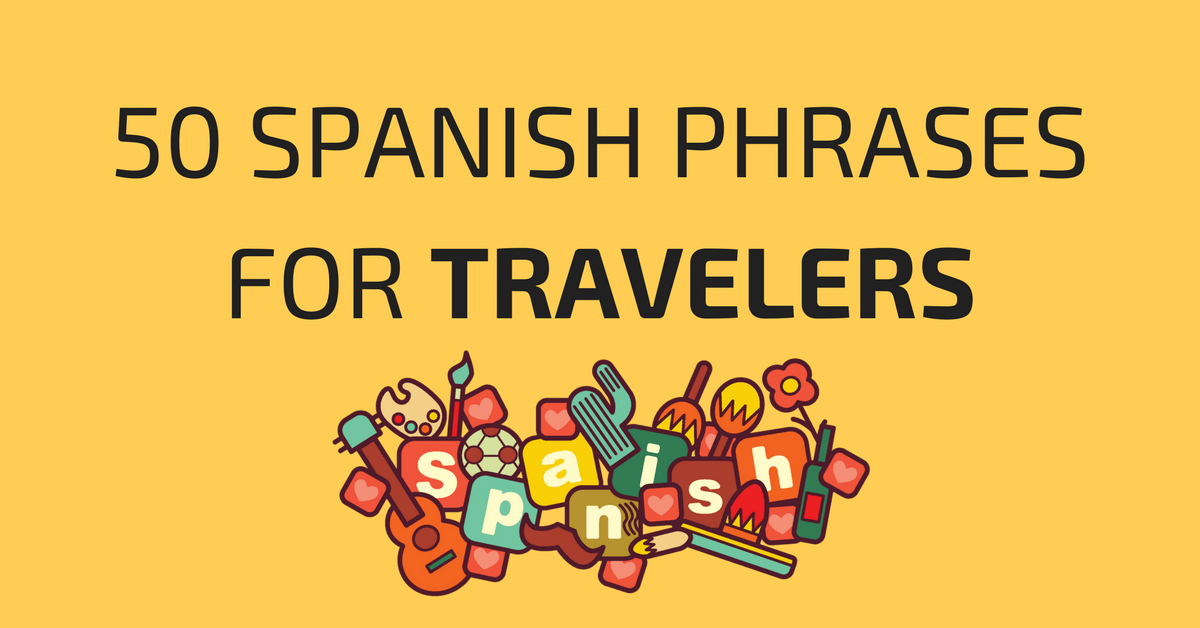
Get this list in PDF format
You can also download this list in a printer-friendly PDF version. Simply click the download button below.
So are you ready?
Here is your list!
Common Spanish Travel Phrases

there you have it---your list of the most common Spanish travel phrases.
You can also read some related articles here:
[Quiz] Do you know these common Spanish phrases?
50 Common Spanish Phrases
For a more complete list of Spanish phrases, grab your copy of the Spanish Phrasebook by My Daily Spanish! It’s got all the phrases you need to survive---and even thrive---in a Spanish-speaking environment.
Make your travel hassle-free with this e-book that covers all possible scenarios while traveling in a Spanish-speaking country. Check it out below!
About the author
Janey is a fan of different languages and studied Spanish, German, Mandarin, and Japanese in college. She has now added French into the mix, though English will always be her first love. She loves reading anything (including product labels).
Session expired
Please log in again. The login page will open in a new tab. After logging in you can close it and return to this page.
Not sure which program to pick? Compare programs
105 Spanish Travel Phrases To Know For Your Next Trip

Get our free email course, Shortcut to Conversational.
Have conversations faster, understand people when they speak fast, and other tested tips to learn faster.
Traveling to a Spanish speaking country without knowing at least a few Spanish travel phrases is a bad idea.
Even the simplest of situations can become an ordeal, whether it’s understanding directions, ordering food in a restaurant, or if worse comes to worst, handling an emergency situation.
That’s not to say that you won’t have a good trip – just that it’s more likely to come with added stress when you can’t speak the local language.
On the flip side, you don’t need to speak perfectly fluent Spanish in order to communicate.
Learning even a couple of basic Spanish travel phrases and words will go a long way in preparing you for most scenarios you’ll encounter when traveling.
Not to mention automatically be treated better by the locals who’ll appreciate the effort you’re making to speak their language.
Plus, nobody wants to be “that tourist ” who makes zero effort to speak Spanish, and is resigned to speaking painfully slow English and using excessive pointing as a last resort to be understood.
We put together a list of useful Spanish travel phrases and vocabulary for people who find themselves in a Spanish speaking environment and quickly need to learn survival Spanish.
Below, you’ll find vocab and native audio pronunciations for:
- Basic phrases
Getting around
- Understanding directions
- Ordering food in a restuarant
- Dealing with an emergency
- Question words
- Telling the time

Basic Spanish Phrases
Hola – Hello
Buenos días – Good day/Good morning
Buenas tardes – Good afternoon
Buenas noches – Goodnight
¿Cómo estás? – How are you?
Por favor – Please
Gracias – Thank you
Me llamo… – My name is…
¿Habla inglés? – Do you speak English?
No hablo español – I don’t speak Spanish
¿Cómo se llama? – What is your name?
Disculpe – Excuse me/I’m sorry
No sé – I don’t know
¿Cómo se dice? – How do you say this?
No entiendo – I don’t understand
¿Qué hora es? – What time is it?
Hable más lento – Speak slowly
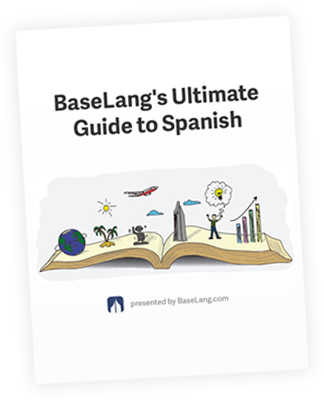
Download the expanded guide to read later
This page gives you a great overview of the most important concepts and strategies, but for the full, expanded guide, click the button below:
These are likely to be your go-to Spanish travel phrases when getting around. Even when you don’t know the Spanish for the subject, these phrases can be combined with gentle pointing, and still come across as very polite.
Me gustaría – I would like
Quiero – I want
Necesito – I need
¿Dónde queda? – Where is?
¿Cuánto cuesta?– How much does it cost?
¿Qué precio tiene? – How much does it cost?
¿Tiene..? – Do you have..?
Yo tengo- I have
Yo no tengo – I don’t have
Qué significa (subject)…? – What does…(subject).. mean?
¿Como llego a..? – How do I get to…?
You’ll want explore your new surroundings, so best to memorize the Spanish for some key places.
El aeropuerto – Airport
El banco – Bank
La biblioteca – Library
La cafetería – Café
El hotel – Hotel
El terminal – Terminal
La estación de bomberos – Firestation
La estación de ferrocarril – Railway station
El estadio – stadium
La farmacia – Pharmacy
La gasolinera – Petrol station
El hospital – Hospital
La librería – Bookshop
El mercado – Market
El museo – Museum
La parada – Bus stop
La policía – Police station
El restaurante – Restaurant
La tienda – Shop, store.
El Centro Comercial – shopping centre
Understanding Directions in Spanish
Understanding directions in a different language is always a challenge, but knowing a couple of these key phrases will help you if the situation calls for it. Either that, or you’ll end up with a general idea of where you need to go.
¿Entiende? – Do you understand?
A la derecha – To the right
A la izquierda – To the left
Derecho – Straight ahead
En la esquina – At the corner
A una cuadra – One block away
Hacia el Norte/Sur/Este/Oeste – To the North/South/East/West
Small talk is an essential part of everyday life, and Spanish speaking countries are no different.
Use these Spanish phrases to break the ice when you meet a local.
¿Cómo te va? – How’s it going?
¿Cómo te ha ido? – How’ve you been?
Estoy bien ¡Gracias! – I’m fine, thanks
¿Y tú? – And you?
Bien/Más o menos. – Good/So-so
¿Qué tal? – How are you?
¿Qué pasa? – What’s happening?
¿Qué haces? – What are you doing?
Ordering Food In Spanish
For obvious reasons, it’s always a good idea to be polite to your waiter in a restaurant.
¿Me trae…? – Could I have …?
¿Cuál es el menú de hoy? – What is today’s menu?
¿Qué me recomienda? – What do you recommend?
¿Acepta tarjeta de crédito? – Do you accept credit card?
La cuenta, por favor – Check, please
Soy alérgico – I’m allergic
Soy vegetariano – I’m vegetarian
Emergency Spanish
Knowing a couple of key emergency phrases will make things much easier if worst case scenario happens, and you find yourself in trouble.
¿Puede ayudarme? – Can you help me?
Necesito ayuda – I need help
¡Ayuda! – Help!
Estoy perdido – I’m lost
¡Llame a la policia! – Call the police!
¡Llame una ambulancia! – Call an ambulance!
Quiz: Places, Directions, and Emergency
Before we move on, why don’t you see how much you remember from these three sections by watching this quiz video. You’ll be shown a selection of Spanish travel phrases and given a few moments to think of its English equivalent before we reveal the translation. Good luck!

Question Words In Spanish
Just like the “Getting Around” phrases, these Spanish question words will be useful even when you don’t know how to say the subject of the sentence in Spanish.
¿Qué…? – what?
¿Cómo…? – how?
¿Cuándo…? – when?
¿Dónde…? – where?
¿Quién…? – who?
¿Por qué…? – why?
¿Cuál? – which?
¿Qué quieres hacer hoy? – What do you want to do today?
¿Como te sientes? – How are you feeling?
¿Cuándo vienes de nuevo? – When are you coming back?
¿Dónde está el museo? – Where is the museum?
¿Quién es? – Who is it?
¿Por qué quiere visitar este país? – Why do you want to visit this country?
¿Cuál prefieres? – Which one do you prefer?
Telling The Time
While almost everyone who travels has a smartphone these days, it’s still useful to know how to ask a stranger for the time, even if it’s only a tactic to break the ice and start a proper conversation.
¿Puede decirme la hora? – Can you tell me what time is it?
…En punto – O’ clock
…Y media/Y treinta – …And a half
…Y un cuarto/Y quince – …Plus fifteen/quarter past
Faltan … para las … – It’s … until …
Medianoche – Midnight
Mediodía – Noon
Son las doce y treinta – It’s 12.30pm
Es la una y un cuarto – It’s 1.15pm
Faltan diez para las tres – It’s 2.50pm
Son las nueve de la mañana – It’s nine in the morning
Son las tres en punto – It’s three o’clock sharp.
Falta un cuarto para el mediodía – It’s quarter to midday
Related: If you want to learn more than these basics, then read our in-depth guide on how to tell the time in Spanish.
And that’s it.
Memorize these Spanish travel phrases before visiting a Spanish-speaking country for more comfortable, stress-free interactions in Spanish.
If you are serious about learning Spanish, then I recommend reading our 119-page Ultimate Guide to Spanish , which includes 10 principles behind learning Spanish fast, strategies to learn vocabulary and grammar, achieve perfect pronunciation and much more.
You can download the entire guide, for free, right below
Get our FREE 7-day email course, Shortcut to Conversational
The exact strategies you need to become conversational in Spanish this year. Join the course now, before we come to our senses and charge for it!

Break-up lines in Spanish: 20 phrases for ending a relationship
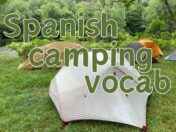
Camping in Spanish: Essential vocab for your outdoor adventure

Spanish Captions for Instagram: Level up your content en español
This blog is presented by BaseLang: Unlimited Spanish Tutoring for $179 a Month. Learn more here.
Your First Week Is Just $1.
After that, it’s just $179/mo for unlimited one-on-one tutoring.
Remember, the worst case scenario is you get a few free classes, don’t like it, and end up with an extra $20 in the bank.
Subscribe to BaseLang Bites
Supercharge your Spanish with our short weekly email, with bite-sized lessons and tips 🚀
BIENVIENDOS A BASELANG BITES!
Keep an eye out for the first lesson coming to your inbox shortly 🙌

Download BaseLang's Ultimate Guide to Spanish!
Get Access Now!
Sign up today so you can get instant access to this product bundle!
101 Common Spanish Phrases for Travel
It’s time to travel! Are you going to a Spanish speaking country? These 101 common Spanish phrases for Travel will help your trip go smoothly, and your journey will be much more enjoyable. If you can memorize these phrases before your trip, that’ll be ideal.
But let’s face it, you are busy. Most likely, you’ll be even busier as your departure date gets closer. But don’t worry, I have created this common Spanish phrases for travel pdf for you! It contains all the travel phrases and words that appear in this post.
Sign up to get your copy of our common Spanish travel phrases pdf for free!
Get Your Free Copy of the Survival Spanish Phrases for Travel!
Signup to receive our freebies and newsletter!
You have successfully joined our subscriber list. Please check your email.
101 Common Travel Phrases in Spanish PDF
Be sure to download it right now so you’ll have it on your cell phone, tablet, or laptop when you are abroad. It’s always a good idea to have it saved on your device, just in case you don’t have access to the Internet when you need it. You can sign up below to get a link to download the basic common Spanish phrases for the travel pdf file sent to you.
As an Amazon Associate, I earn from qualifying purchases. See our disclosure here .
What are the Common Spanish Phrases for Travel?
Here, we’ll cover 101 common Spanish phrases for travel that you will definitely want to know.
First, let’s start with basic greetings and pleasantries, and move on to some of the very common and super useful Spanish verbs. Then we’ll talk about some Spanish travel phrases for getting around and shopping.
Also, you’ll learn common Spanish phrases and words you will need at restaurants or hotels, and tourist activities.
Lastly, we finish up with the important Spanish phrases for emergencies, just in case. So, let’s begin!
What are the Spanish words for travel?
First, what are the words for travel in Spanish? Below are the words that mean travel or a trip.
To travel – Viajar
To go on a trip – Ir de viaje
A trip – un viaje
Basic Spanish Phrases for Travel: Greetings and Pleasantries
When you are traveling to a Spanish-speaking country, learning some basic Spanish phrases goes a long way. Even if you don’t pronounce them correctly or make mistakes, most people would appreciate the time and effort you put into learning their language. So let’s start with some very basic Spanish phrases for travelers.
Hi – Hola
You can use this any time of the day as it means “Hi” or “Hello”, but people usually say this and then say one of the other greeting phrases below depending on the time of the day. So, for example, you might say, “Hola, Buenos días.”
Good morning
Buenos días
This is normally used in the morning hours before 12 noon.
Good afternoon
Buenas tardes
Then you would switch to “ buenas tardes ” in the afternoon until it gets dark outside.
Buenas noches
People would start saying “buenas noches” when it’s dark outside…maybe around 6pm-ish.
Good Bye – Adiós
A typical goodbye in any Spanish-speaking country in the world.
See you later.
Hasta luego.
Even though you may not be seeing each other for a long time or ever like a store clerk, it is common to say “hasta luego ” especially in Spain.
Excuse me (Can I have your attention?) / (Can I pass by?)
Discúlpe / Con permiso
So “ Discúlpe” is used to get someone’s attention. “ Con permiso ” basically means “with your permission.” You would say this when you walk in front of someone or need to pass by people in a crowded place because they are blocking your way. It’s like saying, “Excuse me, I’m passing by you.”
It’s always polite and good etiquette to say “please” in any country, right?
Don’t forget to show your gratitude and appreciation when someone did something nice for you.
No thank you
If you are not interested, you can politely decline by saying, “no gracias.”
What is your name? – ¿ C ó mo se llama usted?
This is a formal version and an informal version is “ ¿C ómo te llamas?” In Mexico or Latin America, it would be better to use the formal version. In Spain, the informal version is pretty common unless you are speaking to someone who is much older than you or a government official, doctor, police officer, etc., you get the idea. A general rule of thumb is if your conversation partner looks about your age or younger, then it’s safe to use the informal version.
My name is ________. – Me llamo ______.
This means literally, “I call myself _______.” You can also say “Soy + your name.”
Nice to meet you. – Mucho gusto (Mexico), Encantado/a (Spain)
In most Latin American countries, “mucho gusto” is the most common way to say “nice to meet you.” In Spain, if you are female, you would say “encantada” ; and if you are male, you would say “encantado.”
How are you? – ¿ C ó mo est á usted?
This is a formal way to ask how a person is. If you are talking to a friend or someone about your age or younger, you can say, “ ¿C ómo est ás?”
I’m good. – Estoy bien.
Just a simple “bien” would work as well. However, to be more polite, you can add “gracias,” so it’ll be “estoy bien, gracias” or “bien, gracias.”
Do you speak English? – ¿Habla inglés?
If you are asking this question to someone, you probably don’t know this person. So it would be appropriate to use this formal form. If you are asking a child or someone who is about your own age or younger, you can use an informal form and say, “ Hablas inglés? “
I don’t speak Spanish. – No hablo espa ñ ol.
Yes / No – Sí / No
I’m sure you’ve heard of these before. Yes!
Traveling soon? Don’t forget to check out this list of 75 Best Travel Accessories to see if you already have them! Many of them are Anti-Theft Products to help protect you and your belongings!
Can you speak slowly? – ¿ Puede hablar m á s despacio?
Natives seem to speak really fast when you first start learning a new language. So you can ask them to speak slowly.
Can you repeat it? – ¿Puede repetirlo?
You can also ask them to repeat what they have just said by saying this phrase.
I understand – Entiendo.
If you understand what they are saying, you can say “entiendo.” If not, you can say the following…
I don’t understand – No entiendo.
Well, if you don’t understand what they are saying, don’t just agree. Make sure you understand what they are saying by asking them to write it down. Once it’s written down, you can use Google to translate it!
Can you write it down, please? – ¿Puede escribirlo?
Yup, ask them to write it down or at least confirm by repeating what was said. You might want to keep a pen in your purse when traveling.
A little – un poco
You may hear other versions like “un poquito” or “un poquit ín” meaning a little tiny bit.
A lot – mucho
Also, you can use “un montón” meaning “A LOT!”
Nothing – Nada
Well, I have nothing to add…ha ha ha, sorry… (by the way, in Spanish, ha ha ha is written “ja ja ja”)
What time is it? – ¿Qu é hora son? (Mexico), ¿ Qu é hora es? (Spain)
For some reason, in Mexico, hora (hour) is used as a plural form, that’s why “son” is used instead of “es.”
Common Spanish Verbs for Travel: Need, Want, and Have
I need ________.
Necesito ________.
I don’t need _____.
No necesito _______.
I want ________.
Quiero_________.
I don’t want _______.
No quiero ________.
Do you have ______?
Tiene ______?
I have _______.
Tengo ________.
I don’t have _______.
No tengo ______.
Spanish Phrases for Transportation and Getting Around
Where is the bus stop? – ¿D ónde est á la parada de autob ús?
If you are looking for a bus station/terminal where many buses meet, you can use “Central de autobuses”, “Terminal de autobuses”, or “Estaci ón de Autobuses.” The last one is more common in Spain.
Do you go to downtown? – ¿Va al centro?
If you are unsure about which bus to take, you can always ask the bus driver if his/her bus goes to where you intend to go before you get on.
How do I get to the Museum of Natural History? – ¿C ómo llego al museo de histor ia natural?
You can use this phrase to ask for directions to some place.
Is it close? – ¿Est á cerca?
This is a bit tricky one because in most Spanish-speaking countries, people often tell you “it’s close,” but that doesn’t really mean it’s close! It could be, but you just never know how a person feels about a distance.
Is it far? – ¿Est á lejos?
If it’s far, you can also ask “ ¿Cu ánto tiempo se tarda en llegar allí?” – How long does it take to get there? to clarify how far it is.
What time does the train leave? – ¿A qu é hora sale el tren?
Whether it’s your train, bus, or flight, you can use this phrase to ask its departure time. The bus is “el autob ús” and the flight is “el vuelo.”
It leaves at 8:30 in the morning. – Sale a las ocho y media de la mañana.
More about the numbers a little bit further down. If it’s in the morning, “ de la mañana” and in the afternoon and early evening, “de la tarde.” And at night, “de la noche” and in the really early morning would be “de la madrugada.”
What time does it arrive? – ¿A qu é hora llega?
So this is referring to the transportation or a third person (he/she/it). What time do we arrive? Would be “ ¿A qu é hora llegamos?”
It arrives at 3 in the afternoon. – Llega a las tres de la tarde.
If you want to say “We arrive” then use “Llegamos.”
Where can I buy tickets? – ¿ D ó nde puedo comprar boletos? (Mexico), ¿ D ó nde puedo comprar billetes?
In Mexico, tickets are called “boletos” ; but in Spain, they are called “billetes.” “Billetes” also meansbills in both countries. For example, “un billete de d ólar” means a dollar bill.
Round trip/one way – Viaje redondo / viaje sencillo (Mexico), ida y vuelta / S ó lo ida (Spain)
I would like 2 tickets. – Me gustar ía dos boletos. (First class, Economy class – premera clase, clase econ ómica )
Again, tickets are “billetes” in Spain. One ticket would be “un boleto” or “un billete.”
I missed my flight. – Perd í mi vuelo.
Literally, it means “I lost my flight.” So, you can swap the noun and say “Perd í mi maleta” – “I lost my suitcase” as well.
Here’s my passport. – Aqu í est á mi pasaporte.
Another similar phrase is “ Aqu í lo tiene,” basically meaning “here you have it” or “here it is.”
I’m here on vacation/on holiday. – Estoy aqu í de vacaciones.
In Spanish, vacation is usually plural “vacaciones.”
I’m going to stay for one week. – Me voy a quedar una semana (two weeks – dos semanas).
Staying only for a few days? Then you can say, “Me voy a quedar unos d í as.” “ Day” in Spanish is “d ía” (singular) and “d ías” (plural) and month in Spanish is “mes” (singular) and “meses” (Plural).
Where is the baggage claim? – ¿ D ónde está el reclamo de equipaje?
There are several different words for baggage claim: la cinta de maletas, la cinta de equipaje, la cinta de recogida de equipaje , etc. “Equipaje” means luggage.
I can’t find my suitcase. – No encuentro mi maleta.
If you can’t find a person, then you would add “a” in front of the person’s name. For instance, “No encuentro a Maria.”
How much does it cost to take me to________? (Taxi) – Cuanto por lleverme a _______?
Ask a cab driver how much it costs to take you to your destination before getting on the cab to avoid any unpleasant surprises. Researching how much a taxi to your destination should cost beforehand can give you a general idea.
Stop here, please. – Pare aqu í, por favor.
Wait a moment, please. – Espere un momento, por favor.
Is it free? (open/available) – ¿Est á libre?
Common Spanish Travel Phrases and Words for Shopping
I need to exchange dollars for pesos. – Necesito cambiar d ólares por pesos.
Banks in other countries tend to close earlier than the ones in the U.S. So if you think you might need to get some cash out, don’t forget to plan ahead.
Is there______? – ¿Hay _____?
This one is very easy but useful at stores, restaurants, and many other places.
What is that? – ¿Qué es eso?
You can point something and ask “ ¿Qué es eso?” If it’s right by you, then “ ¿Qu é es esto?” (What is this?).
Can I see it? – ¿Puedo verlo?
“ ¿Puedo?” means “Can I?” A very useful phrase. Definitely, it’s helpful to memorize this one.
I’m just looking. – Solo estoy mirando.
When you walk into a store and a store clerk asks you if they can help you find something. You can say , “ Solo estoy mirando. Gracias.” if you don’t intend to buy anything. At most department stores, store clerks work on commission, so they tend to be very eager to help you.
Can I try it on? – ¿Me lo puedo probar?
“El probador” means the fitting room.
Do you have size 40? – ¿Tiene talla cuarenta?
Clothing and shoe sizes are quite a bit different in each country, so be sure to check online before you go and get a general idea.
Numbers: 1, 2, 3, 4, 5, 6, 7, 8, 9, 10, 20, 30, 40, 50, 60, 70, 80, 90, 100
– N ú meros: uno, dos, tres, cuatro, cinco, seis, siete, ocho, nueve, diez, veinte, treinta, cuarenta, cincuenta, sesenta, setenta, ochenta, noventa, cien
This quick study guide is packed with useful information and has a section on numbers as well. It is a perfect reference flip chart for beginners.
You can also learn how to pronounce Numbers in Spanish in this post .
t’s too big/small – Es demasiado grande/chico (or chica).
“Grande” means big or large, and “chico(a)” means small (you can also use “peque ño(a)” ). I wouldn’t worry too much about whether the object you are referring to is a feminine or masculine noun at this point. People will understand you even if you don’t match the genders.
“Demasiado” means “too” something (adjective). So you can use it to say so many other things. For instance, “Es demasiado largo” (it’s too long), “Es demasiado corto” (It’s too short.).
How much is it? – ¿Cu ánto cuesta?
You can just point at something and say, “ ¿Cu ánto cuesta?” And if you are buying multiple ítems and want to know how much the total cost is, you can say, “ ¿Cu ánto cuesta en total?” or ¿Cu ánto es?
It’s too expensive. – Es demasiado caro.
Similar to the phrase above. “Caro(a)” means expensive, and “barato(a)” means cheap.
Can you give me a discount? – ¿ Me puede dar un descuento?
In Mexico and Latin America, if you are shopping at a local market, you can almost always get a discount. So it’s worth asking so you don’t end up paying tourist’s prices.
Do you have anything cheaper? – ¿Tiene algo m ás barato?
This is kind of similar to the one above. “Algo” means something or anything, and “m ás” means “more” and makes an adjective comparative when you put it before the adjective. Less is “menos.”
I’ll take it. – Me lo llevo.
If you like it and you’re going to buy it, then you’ll say “me lo llevo.” If you’re buying multiple items, a plural form of “ lo” which is “los” should be used. So you’ll say “me los llevo.” If you want to be super correct, select one of the followings “lo, la, los, or las” to match the gender of the item(s) you are purchasing…but that’s not crucial at all, so no worries.
Do you accept credit card? – ¿ Aceptan tarjeta de cr é dito?
Cash is “efectivo” and debit card is “tarjeta de d ébito” although most U.S. debit cards are not accepted at stores in foreign countries.
Check out these 75 Cool and Useful Travel Accessories You Can’t Leave without!
What time does it open? – ¿A qu é hora cierran?
In mid-to small-sized cities in Spain, many stores close for lunch for a few hours, then reopen after lunch. Their lunch is from about 2 pm to 4 or 5 pm.
What time does it close? – ¿A qu é hora abren?
Banks tend to close earlier than the ones in the U.S., and they often have different (shorter) business hours for Fridays and Summer months as well.
Useful Spanish at a Restaurant or Hotel
While traveling, these Spanish phrases will definitely come in handy. At a bar or café, you can just pick any available table, but I would recommend making a reservation if you are going to a restaurant.
I have a reservation. – Tengo una reservaci ón.
You can use this phrase at a restaurant or at a hotel when you check in.
Is there free wifi? – ¿Hay wifi grat ís?
“El Usuario” is the user name and “la contraseña” is the password.
I lost the key to my room. (at a hotel) – Perd í la llave de mi habitaci ó n.
It doesn’t work. – No funciona.
If something in your hotel room doesn’t work, you can say, “ No funciona + the thing that’s not working. ”
I would like _______. – Me gustar ía _______.
You can also say, “Quisiera______” “Quisiera” is a more polite form of “quiero” – I want.
I would not like_______. – No me gustar ía _______.
Is this spicy? – ¿Esto pica? or “Es picante?”
Mexican salsas can be super spicy, so I always ask before trying them…although they often say, “no, no pica nada!” – “no, it’s not spicy at all!” Spanish food is generally not spicy, though.
Is it sweet or salty? – ¿Est á dulce o salado?
If you are like me and enjoy trying new foods, you’ll need this phrase.
Gluten free – Sin gluten, Libre de gluten
Gluten-free products are not as common in Spain or Latin American countries as they are in the U.S. Or I should say most products are not labeled “gluten-free” as they are in the U.S.
The bill, please. – La cuenta, por favor.
You will need this phrase at restaurants.
Is tip included? – ¿ Est á incluído la propina?
In Spain, tipping is not customary at Tapas bars although appreciated. However, when dining at a restaurant in both Spain and Mexico, 10-15% of the bill is common if the service fee is not included.
Where is the bathroom? – ¿ D ó nde est á el ba ñ o? or “ ¿ D ó nde est án los ba ñ os? (plural)
Another word for the restroom is “ el servicio )” in Spain.
Occupied/busy – Ocupado
For example, “El ba ño est á ocupado.” – The bathroom is occupied.
“Estoy ocupado(a)” – I’m busy.
Vacant – Libre (bathroom), Vacante (hotel rooms)
“Libre” also means available or free.
Essential Spanish Phrases for Tourist Activities
Is it free? (no cost) – ¿Es grat ís?
Can I enter? (is it allowed to enter?) – ¿Se puede entrar?
If you are not sure if it’s okay to enter, it’s good to ask first, especially at religious places or semi-private tourist spots.
Is it safe? – ¿Es Seguro?
Is it dangerous? – ¿Es peligroso?
No smoking – No fumar.
Smoking is prohibited in enclosed public places in at least Spain and Mexico. So, bars, restaurants, nightclubs, etc. are non-smoking.
Do not touch – No tocar.
You’ll often see a sign with this phrase and an image of a hand crossed out at museums, historical buildings, etc.
I want to go to _______. – Quiero ir ______.
You can use this phrase for a taxi driver, a bus driver, someone when you are asking for a direction, etc.
Important Spanish Phrases for Emergencies
Can you help me? – ¿Me puede ayudar?
If you need help with your luggage or you are lost, this phrase will come in handy.
My wallet was stolen. – Me robaron mi caretera.
“Me robaron” + whatever the item that was robbed. Be extra careful of pickpockets, especially in big cities or in crowded places.
I don’t feel well. – No me siento bien.
When you feel better, you can say, “me siento mejor.” “Mejor” means better, and “peor” means worse.
My stomach hurts – Me duele el est ómago.
The basic structure of this sentence is “Me duele” + the part of your body that is hurting. You can also find more phrases and vocabulary about your physical conditions on this post.
I need to go to hospital. – Necesito ir al hospital.
Remember the “H” is silent. So, you would pronounce “hospital” as though it’s “ospital” with an accent on the “a”.
Help! – ¡Socorro!
Hopefully, you won’t need to use this one or any of these phrases in this emergency section while traveling, but it’s better to be prepared. So, don’t forget to memorize this word just in case.
Are You Ready to Use These Spanish Phrases for Travel?
I’m so excited for you that you are going to Spanish-speaking countries soon or planning a trip in the future. Hope you have a super fun adventure wherever and whenever you go! I hope these Spanish travel phrases help your trip be trouble-free and filled with wonderful, lasting memories.
Oh, did you download our free basic Spanish phrases pdf ? You can print it out and tuck it in your backpack pocket or save it on your digital devices. Here’s where you can download it.
Oh, one last thing…
How to say be safe in Spanish?
In Spanish, “Be safe!” can be translated as either one of these four phrases.
¡Que vuelvas sano y salvo! (Hope you return safe and sound)
¡Que regreses sano y salvo! (Hope you return safe and sound)
¡Que te vaya bien en tu viaje! (Hope everything goes well with your trip)
¡Que te salga bien en tu viaje! (Hope everything turns out well for your trip).
As you have noticed that their literal translations are a bit different, but these are the closest phrases in Spanish that there are to “be safe” in English.
Don’t forget to check out this post: How to say Airport in Spanish: Spanish words and phrases you need at the airport.
Have an amazing trip and Happy Spanish-ing!
Interested in Learning Conversational Spanish?
Try these posts and unlock your Spanish superpower!
- 30 Spanish Conversation Starters Every Spanish Learner Should know
- 15 Fun and Easy Spanish Learning Hacks I Used to Become F luent Fast
- Spain vs Mexico: What Are the Differences between Spain Spanish and Mexican Spanish?
- 20 Popular Songs in Spanish: Latin Music for Learning Spanish Fast!
- 101 Survival Spanish Phrases for Travel Every Traveler Needs to Know
- How to Introduce Yourself in Spanish
- Easy Spanish Greetings: How to Greet in Spanish
Pin it for Later!
Click here to see “75 Super Useful Travel Essentials Every Traveler Needs!”
Nice job! You got the basic Spanish phrases for greetings down. Now a little bit longer phrases, but don’t worry, they are not too complicated. Trust me, it’s worth learning these Spanish phrases.
© 2020 Spanish Unlocked
- Conversations
- Food & Drinks
- Privacy Policy
Join the journey: Click here to get our top tips for affordable travel!

The Essential Spanish Phrases for Travel PDF
As I mentioned in my post on the benefits of foreign language for travel , I think that learning the basics of the language to any country you visit is a great way to bettter experience the local culture. If you’ve read my post on Sagunto , you may know that I studied abroad there and speak it at about an intermediate (B2) level. I love this language, and seeing it’s popularity, I am glad that I spent time learning it.
As there are many countries around the world where Spanish is the primary language, it is pretty likely that you’ll hit one of these countries on your travels. This post will cover the basics of Spanish phrases for travel, which you can use as your pocket guide while traveling to any Spanish-speaking country!
Table of Contents
The Top Resources for Learning Spanish
- iTalki : Practice with Live Teachers at a low cost
- LingoPie : Learn the language by watching videos in Spanish
- Short Stories : Expand your Spanish vocabulary with easy to read short stories
START LEARNING TODAY!
Spanish Language Overview
Spanish is the second most spoken language in the world, after Mandarin! There are 442 million speakers of Spanish around the globe, and it is the official languages of 21 countries across Europe, Africa, and the Americas. These specific countries and territories include:
- Puerto Rico
It is a Romance language, meaning it comes from Latin. That means that learning Spanish will certainly help you with learning the other Romance languages. Particular in the areas of grammar and root words.

get your free download!
Spanish phrases pdf.
This free download includes all the key Spanish phrases that you will need for your travels throughout Spain, Mexico and any Spanish-speaking country. In addition, get details on the best resources to improve your speaking and listening skills as well.
History of the Spanish Language
The history of the Spanish language is shaped by centuries of cultural, political, and linguistic influences. Its roots can be traced back to the Roman Empire, when Latin was introduced to the Iberian Peninsula around the 3rd century BCE. Over time, Latin evolved into various dialects, blending with local languages spoken by native Iberian populations. However, it was during the medieval period, particularly after the Moorish conquest of Spain, that the foundations of modern Spanish began to take shape.
The influence of Arabic and other languages spoken by the Moors infused the evolving Romance dialects with new vocabulary, grammar, and pronunciation. The gradual reconquest of Spain by Christian kingdoms led to the unification of the language, and by the 13th century, a standardized version of Spanish, known as Castilian, emerged as the dominant dialect. With the colonization of the Americas by the Spanish, the language spread across the globe, becoming one of the world’s most widely spoken languages.
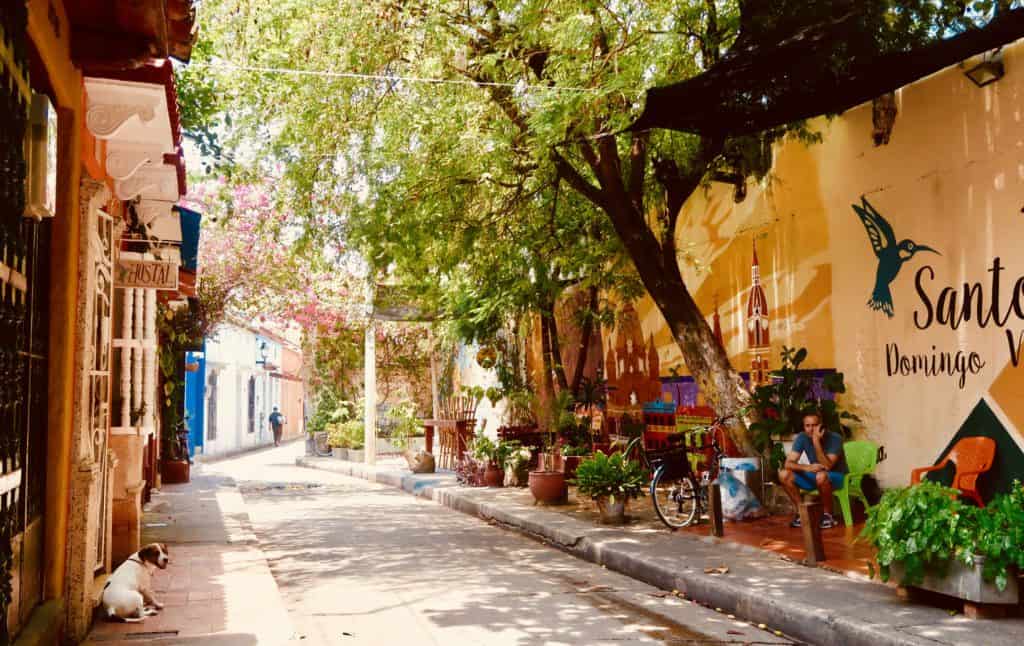
Spanish Pronunciation Tips
Spanish pronunciation can be a delightful challenge for language learners, but with a few key tips, mastering the sounds becomes more attainable:
- One important aspect is understanding that Spanish has a consistent sound-to-letter correspondence, meaning letters are usually pronounced the same way regardless of their position in a word. It is also crucial to pay attention to vowel sounds, as they are clear and distinct in Spanish. Mastering the five vowel sounds, namely “a,” “e,” “i,” “o,” and “u,” will greatly enhance pronunciation accuracy.
- Another tip is to focus on correctly pronouncing the rolled “r” sound, which is a unique feature of Spanish. Practicing tongue trills or tapping the tongue against the roof of the mouth can help achieve this sound.
- Additionally, being aware of syllable stress is crucial since Spanish is a syllable-timed language. Recognizing which syllables are stressed can improve both comprehension and fluency.
- Finally, listening to native Spanish speakers and immersing oneself in Spanish language media can greatly aid in developing an authentic and natural pronunciation.
Your Spanish Phrases for Travel Cheatsheet
Spanish greetings.
Below are basic Spanish greetings you’d use to greet or say goodbye to locals:
- Hello – Hola
- Hello/Goodbye – Chao
- How are you? – ¿Cómo estás?
- Good morning – Buenos días
- Good afternoon – Buenas tardes
- Good night / Good evening – Buenas noches
- Goodbye – Adiós
- What is your name? – ¿Cómo te llamas? / ¿Cómo se llama? (formal)
- My name is… – Me llamo…
- My name is… – Mi nombre es (less commonly used)
- Nice to meet you – Mucho gusto / Encantado(a) a conocerle
- Have a great day! – ¡Que tengas un buen dia!
- See you later – Hasta luego
- How are you? – ¿Como estás?
- What’s up? – Qué pasa?
- Very well – Muy bien
- I’m fine – Estoy bien
- Okay / So-so – Más o menos
- And you? – ¿y tú?
Essential Phrases
Essential phrases are those you’d use most frequently, outside of greetings of course.
- Yes – Sí
- No – No
- Thank you – Gracias
- Thanks a lot – Muchas gracias
- You’re welcome – De Nada
- Excuse me – Perdón / Disculpe / Permiso / Con permiso
- I’m sorry – Lo siento
- Do you speak English? – ¿Hablas inlgés?
- I don’t speak English – No hablo inglés
- I don’t understand – No entiendo
- Please – Por favor
- Slowly – Despacio
- Repeat – Repita
- Where is the bathroom? – ¿Dónde está el baño?
Days, Months, and Time
The days of the week and all other phrases related to telling time.
- Day – Día
- Week – Semana
- Sunday – Domingo
- Monday – Lunes
- Tuesday – Martes
- Wednesday – Miércoles
- Thursday – Jueves
- Friday – Viernes
- Saturday – Sábado
Months/Year
- Month – Mes
- Year – Año
- January – enero
- Februar y – febrero
- March – marzo
- April – abril
- May – mayo
- June – junio
- July – julio
- August – agosto
- September – septiembre
- October – octubre
- November – noviembre
- December – deciembre
Telling Time
- Minute – Minuto
- Hour – Hora
- Time – Hora / Tiempo
- What time is it? – ¿Qué hora es?
- It is 1:00 – Es la una
- It is 2:00 / 3:00 – Son las dos / tres
- What day is today? – ¿Qué día es hoy?
- Tomorrow – Mañana
- Yesterday – Ayer
- Morning – Mañana
- Midday – Mediodía
- Midnight – Medianoche
- Night – Noche
- (Three weeks) ago – Hace (tres semanas)
- Today – Hoy
- Now – Ahora
Phrases and words for getting around town.
- Where is…? – Dónde está…
- The bus stop – La parada de autobús
- The bank – El banco
- The museum – El museo
- The park – El parque
- The hospital – El hospital
- The airport – El aeropuerto
- The church – La iglesia
- How do you get to…? – ¿Cómo se va a…?
- Left – Izquierda
- Right – Derecha
- Straight – Derecho
- Turn to the.. . – Gira a la…
- How far away is…? – ¿Qué tan lejos está…?
- It is two blocks away – Está a dos manzanas.
- It is five minutes away – Está a cinco minutos.
- What is the address? – Cuál es la direccion?
Transportation
Phrases and words for traveling to further destinations.
- By bus – En autobús
- By train – En tren
- By car – En coche / en carro
- By plane – En avión
- By subway / metro – En metro
- Where is the train station? – ¿Dónde está la estación de tren?
- Where is the bus stop? – ¿Dónde está la parada de autobús?
Phrases and words to use when ordering food at a restaurant.
- Restaurant – El restaurante
- Breakfast – El desayuno
- Lunch – El almuerzo
- Dinner – La cena
- Appetizer – Entrada
- Main Course – Plato principal
- Desert – Postre
- What do you recommend? – ¿Qué nos recomienda?
- I would like (to order) – Querría…
- The bill please – La cuenta por favor
- I’m vegetarian – Soy vegetariano/a
- I’m allergic – Soy alérgica
- Red wine – Vino tinto
- White wine – Vino blanco

Phrases and words to use when out shopping.
- How much does it cost? – ¿Cuánto cuesta?
- Store – La tienda
- Price – El precio
- Money – El dinero
- Credit card – Tarjeta de crédito
- Do you accept credit cards? – Se acepta tarjetas de crédito?
- Cash – Dinero en efectivo
- Discount – El descuento
- Shirt – La camisa
- Blouse – La blusa
- Pants – Los pantalones
- Shoes – Los zapatos
- Suit – El traje
- Swimsuit – El traje de baño
Regional Spanish Differences
From Latin America to Spain, Spanish does remain intelligible, but there are some particularities that may be useful to know:
Spain Spanish
One of the most prominent differences lies in the pronunciation and accent. In Spain, the Spanish accent tends to be more sibilant and has a softer, lisping quality, particularly in regions like Andalusia. Latin American Spanish, on the other hand, often features a clearer pronunciation of consonants and is generally considered to have a more melodious cadence.
Vocabulary is another area where variations can be observed. While the core vocabulary remains largely the same, there are differences in terms of certain words and expressions used in Spain versus Latin America. For instance, words related to everyday objects, food, and slang can vary between the two regions. Moreover, grammatical variations exist as well. In particular, the “plural you” used in Spain is vosotros , instead of usted like it is in most of Latin America.
Rioplatense Spanish
Also known as River Plate Spanish, this term refers to the distinct variety of Spanish spoken in the areas surrounding the Río de la Plata region, which includes Argentina and Uruguay. This variant of Spanish exhibits several particularities that set it apart from other Spanish dialects. One notable feature is the pronunciation, characterized by a unique intonation and rhythm.
Rioplatense Spanish has a strong Italian influence, reflecting the significant Italian immigration to the region in the late 19th and early 20th centuries. As a result, speakers often pronounce “ll” and “y” as a “zh” sound, known as “yeísmo” or “sh” sound, which is distinct from the “y” sound in standard Spanish.
Additionally, the Rioplatense dialect includes a variety of local idioms, slang, and vocabulary that differ from other Spanish-speaking regions. Words borrowed from Italian, known as “lunfardo,” are prevalent in the dialect and contribute to its distinctive flavor.
Cuban Spanish
Also known as “Cubano” or “Cubanismo,” this dialect possesses a distinct set of particularities that make it stand out within the Spanish-speaking world. One notable feature of Cuban Spanish is its pronunciation. The “s” sound at the end of words and syllables is often softened or omitted, a phenomenon known as “seseo.”
Additionally, the “r” sound is often rolled or trilled more prominently, giving Cuban Spanish a melodic and vibrant quality. Another characteristic of Cuban Spanish is the frequent use of augmentatives and diminutives to convey emphasis or affection. These suffixes, such as “-ito” and “-ote,” are commonly added to nouns and adjectives.
Cuban Spanish also showcases a rich vocabulary influenced by Afro-Cuban, Caribbean, and African linguistic elements, along with borrowings from English and French. Furthermore, the dialect features distinctive idiomatic expressions, humor, and wordplay that reflect the unique cultural identity and wit of the Cuban people.
Mexican Spanish
This variety of Spanish is what is most often taught in the US, and is also known as “español mexicano” or “mexicanismo”. One notable feature of Mexican Spanish is its pronunciation. It is characterized by a softening or elision of certain consonants at the end of words, such as the “s” sound, a phenomenon known as “seseo” (like Cuba).
Another distinctive aspect is the pronunciation of the “x” sound, which is often pronounced as an “h” sound. Mexican Spanish also includes a vast array of unique vocabulary, idiomatic expressions, and regional slang, known as “mexicanismos.” These linguistic elements are deeply rooted in the country’s history, indigenous cultures, and influences from Nahuatl, the Aztec language, as well as other indigenous languages.
Moreover, Mexican Spanish has borrowed extensively from English, particularly in the realm of technology and popular culture.
Practicing Spanish
Here is a youtube video (and channel) that will be useful for practicing your Spanish:
The Spanish Travel Phrases PDF
Download this PDF so that you can have all the key Spanish phrases at your fingerprints. Practice will make you more confident, so here is your chance to start learning more now!
Spanish Phrases for Travel | Final Thoughts….
That completes my list of the basic Spanish phrases for travel! I hope that this list serves as a useful guide when you venture out to any of the 21 countries where Spanish is the official language! To get the most out of this list, you should practice often before taking your trip.
Even better than just using this list is practicing your new vocabulary with a real person! If this interests you, check out my favorite language resource, iTalki . You can use this site to practice with a tutor, formal teacher, or others just seeking to do a language exchange (for free!). The paid lessons have very cheap options, with some as low as $5 an hour. Check it out!
Travel Guides for Spanish Speaking Countries:
- Barcelona in Four Days
- Two Days in Granada
- One Day in Málaga
- What to Do in Cartagena, Colombia
- Lima Travel Guide
- What to do in Cusco
- Climbing Machu Picchu Mountain
Additional Language Guides:
- Portuguese for Travel
- French for Travel
- Italian for Travel
- Greek for Travel
- Thai for Travel
- Japanese for Travel
Don’t forget to pin this for later!
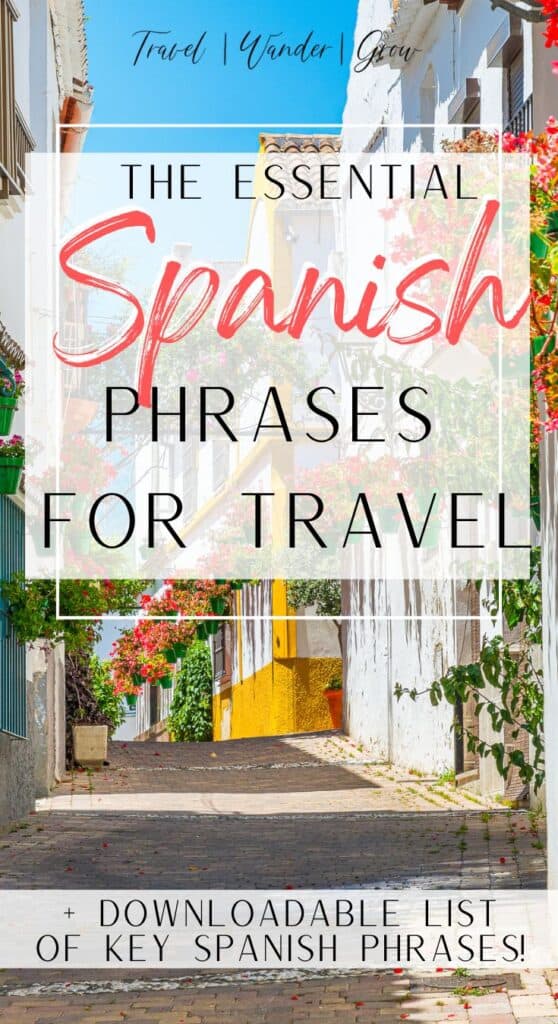
Christen Thomas is the founder of TravelWanderGrow, established in 2018. She has lived abroad and traveled extensively to over 30 countries. In addition, she is a certified Travel Advisor and is an expert in planning trips focused on city history and culture. As a frequent traveler, she also shares tips on how to prepare to travel well and how to save money while doing so.
12 Comments
Handy – I have a son who lives in Spain – be good to throw a bit of Spanish at him next time we talk on the phone
Ha! I like that idea Ron 🙂
Thanks for a great article with some key phrases! There is enough here to help you get by when on holiday. I always try my best to communicate with the natives it only seems polite to do so as you are a guest in their country!
My thoughts exactly, Andy!
This is so much great information.
I took Spanish in high school.. a couple years ago at least and I still do remember some phrases.
A really helpful phrase I used frequently when I was in Mexico last November was – Hablas ingles? It saved me and my husband’s bums when we almost got stuck in a different place because our tour bus left without us.
Thanks! Kahlua
Yes, that phrase is one of the best ones to know – can certainly help get you out of a bind, Kahlua!
I’m definitely pinning this! Spain will be a trip we take at some point and this is so handy. My husband studied abroad in Spain in college. ☺️
Glad you found this useful Laura!
Oh this is interesting! I wish I had the money to go abroad but I really love your posts!
Thanks, Audrey. Hope you can travel soon!
This is such a useful little post! Wish I read it about 6 weeks ago before I went on holiday lol
Haha – I understand that! You can always just use it for your next trip though 🙂
Leave a Reply Cancel reply
Your email address will not be published. Required fields are marked *
- Skip to main content
Additional menu
Latin American Spanish Cafe
Learn Latin American Spanish Online. Country accents, dialects, and vocabulary blogs and worksheets
Key Spanish Phrases for Travel: Latin America Style
Last Updated on September 30, 2023 by Keith Filed Under: Greetings , Language Learning , Travel
What do the awe-inspiring Iguazú Falls, the ancient citadel of Machu Picchu, the lush beaches of Cancún, and the picturesque streets of downtown Cartagena all have in common? They’re all located in Spanish-speaking countries of Latin America, of course! So if you’re planning to visit the amazing sights Latin America has to offer, you’ll need to speak Spanish once you’re there.
These useful Spanish travel phrases are going to help you get by when traveling in Spanish-speaking countries. In fact, they could be considered essential to learn, because you may need to use each and every one of them from the minute you land.
We’ve included basic Spanish phrases such as greetings, ordering food in a restaurant , checking into a hotel, transport, asking for and understanding directions , and some phrases you might need in case of an emergency. Fasten your seatbelts, muchachos , ¡porque nos vamos de viaje!
And do check our full guide to vocabulary and phrases for air travel to help make the travel experience easier but also more educational.
Table of Contents
Basic phrases
This first section of handy Spanish words is where you’ll learn the basic greetings , question words and common questions, and other common Spanish phrases you’ll need on a daily basis.
Making conversation and getting information is all about asking and answering questions, so memorizing the question words should be your first port of call! Here are the main question words presented in examples of common questions:
Please note: There’s a small, yet important difference between saying ¿ Cuánto está/cuesta? and ¿ Cuánto es? . You usually use ¿ Cuánto está / cuesta? if you’re asking about the price for a single item or service. You’d be more likely to use ¿ Cuánto es? when you’re asking about the total bill, for example at a supermarket, restaurant, or hotel.
Ordering food at a restaurant
Trying all the delicious local food is one of the best things about traveling. Latin America is home to many rich culinary traditions, so be sure to use the following phrases to order. (We decided not to include a long list of the actual names of foods because they can change from one Latin country to another–avocado is aguacate in some countries and palta in others, for example–and are often listed on the menu anyway.)
Here’s a food ordering conversation to help you practice:
Getting around
Exploring the city or town you’re visiting is the most exciting part of traveling, however, it can be a little daunting because you might have to ask someone for directions at some point. This would not be a good time to be stuck for words, so don’t forget to practice the phrases below several times to ensure they just roll off your tongue with no problem.
Let’s practice! Look at the map and read the conversation below where a tourist is asking a police officer for directions. You’re standing outside the museum.
Checking into a hotel
During your travels, you’ll inevitably stay at a hostel or a hotel, so you definitely need to master these common Spanish expressions and basic questions about your accommodation.
Problems and emergencies
We certainly hope you won’t need any of the phrases below during your travels, but they’re still part of the essential Spanish expressions that should be part of your vocabulary.
Review test
Time for a little test now to put your newfound vocabulary in practice! Choose the correct word to complete the sentence. (The answers can be found at the bottom of the article)
Congratulations! You’ve just gone from not even knowing how to say trip in Spanish (which is viaje, in case you’d missed it), to knowing several super important Spanish phrases to know when traveling. We hope you put these phrases to good use during your next adventure somewhere in Latin America. ¡Hasta la próxima, muchachos!
(Answers to the review test: 1-a / 2-a / 3-b / 4-a / 5-b / 6-b / 7-a / 8-b)
Share this post:
GET THE LATEST SPANISH LEARNING ARTICLES!
Dropped right into your inbox.
Reader Interactions
Leave a reply cancel reply.
Your email address will not be published. Required fields are marked *
Save my name, email, and website in this browser for the next time I comment.

7 things to do to protect yourself when heading to Mexico
- By Mr. Digital Fingers
- Apr 24, 2024

Traveling to Mexico offers a vibrant tapestry of rich history, stunning landscapes and diverse cultures. Whether you’re planning to bask on the sandy beaches of Cancun, explore the historic streets of Mexico City or delve into the mysteries of ancient ruins in Yucatan, it’s crucial to stay safe and prepared. Here, we’ll explore seven essential strategies to protect yourself and ensure a hassle-free and enjoyable Mexican adventure.
1. Travel insurance
Protect your trip.
Before setting foot on Mexican soil, ensure you have comprehensive travel insurance . This should cover medical expenses, theft and trip cancellations. Health care in Mexico can be expensive for tourists, and with the unpredictability of travel, insurance is not just a safety net but a necessity.
2. Health precautions
Stay healthy and alert.
Vaccinations are your first line of defense against potential health risks. Consult with a travel health clinic a few months before your departure. Common recommendations include shots for hepatitis A and B, typhoid and rabies, depending on your itinerary. Additionally, always drink bottled water to avoid stomach ailments, a common issue for travelers.
3. Safety in transportation
Choose safe transit options.
When traveling between cities or within large metropolitan areas like Mexico City, opt for authorized taxi services or reputable ride-sharing apps. Avoid hailing taxis on the street, especially at night. For longer distances, consider using first-class bus lines, which are generally safer and more comfortable.
4. Secure your belongings
Keep your possessions safe.
Petty theft and pickpocketing can happen, particularly in crowded tourist spots. Use anti-theft bags or money belts, and always keep a digital copy of your important documents like your passport and travel insurance. Avoid displaying expensive jewelry or electronic devices conspicuously.
5. Respect local laws and customs
Understanding cultural nuances.
Mexico’s rich culture comes with unique laws and customs. Familiarize yourself with local etiquette and legal regulations. For instance, drug offenses are taken very seriously, and public drunkenness is frowned upon in many areas. Respecting local traditions and laws not only keeps you safe but also enriches your travel experience.
6. Be aware of your environment
Stay informed and cautious.
Keep up with local news regarding weather conditions, political climate and other issues that might affect your safety. Register with your embassy upon arrival for updates and assistance in case of an emergency. Always let someone know your itinerary and check in regularly.
7. Learn basic spanish phrases
Bridge the language gap.
While many people in tourist areas speak English, knowing basic Spanish phrases can enhance your experience and help in unexpected situations. Phrases like “¿Dónde está el baño?” (Where is the bathroom?) or “Necesito ayuda” (I need help) are not just practical but also appreciated by the locals.
Embracing Mexico: A safe and memorable journey
Traveling to Mexico can be an unforgettable experience, filled with warm hospitality, gastronomic delights and breathtaking sights. By taking the right precautions, you can enjoy all that Mexico has to offer without unnecessary risks. From securing the right travel insurance to respecting local customs and staying aware of your surroundings, these seven tips will help safeguard your journey, allowing you to focus on creating lasting memories in this beautiful country.
This comprehensive guide not only prepares you for common travel concerns but also equips you with practical tips to navigate your Mexican adventure safely and enjoyably. As you get ready to explore Mexico, remember that being well-prepared is the key to a fulfilling travel experience. Ensure your vaccinations are up to date, stay hydrated with bottled water and keep your belongings secure, blending vigilance with the excitement of exploration. So pack your bags, embrace these precautions and get ready for an incredible trip to Mexico. Whether you’re soaking up the sun on a tranquil beach, exploring ancient ruins or enjoying the bustling nightlife, your adventure in Mexico awaits, promising rich experiences and cherished moments .
This story was created using AI technology.
Leave a Reply Cancel reply
Your email address will not be published. Required fields are marked *
Sign up for Rolling Out news straight to your inbox.
- anti-theft strategies , basic Spanish , cultural immersion , environmental awareness , health precautions , local customs and laws , Mexico travel safety , safe travel tips , secure transportation , travel insurance

A journey into luxury travel and cultural exploration by navigating the globe

The financial benefits of off-season travel to your dream destinations

How learning a new language enhances cognitive abilities and makes you smarter

Discover why Medellin, Colombia, became a top honeymoon destination

5 pros and 5 cons of travel insurance
- More in Travel

The Hilton Garden Inn Atlanta Airport North offers peace and proximity

The 5 most mystical locations in South America

Home2 Suites by Hilton is a bastion of peace, comfort and sophistication
- Community News
- Justice For All
- All Entertainment
- Reality Check
- All Culture
- Relationships
- Cocktail & Beer
- Creative Lens
- All Business
- Black Intellectuals
- Diversity Equity & Focus
- Sisters with Superpowers
- Home Ownership & Real Estate
- Entrepreneurs & Business Leaders
- Executive Suite
- Finance & Wealth
- Marketing & Branding
- Be the Match Atlanta
- Food & Nutrition
- HBCU Culture
- Privacy Policy

IMAGES
VIDEO
COMMENTS
Spanish-speaking countries are especially polite and greeting people correctly will go a long way towards endearing you to the locals, be they friends, people you meet in shops or on the street. #1 ¡Hola! - Hello. (O-la) #2 ¡Buenos días! - Good morning! ( BWAY-nos DEE-as) #3 ¡Buenas tardes! - Good afternoon/good evening!
Basic Spanish for Travelers: Accommodations. Spanish for tourists must include necessary words and phrases useful for checking in somewhere. Whether you choose a big hotel or an Airbnb apartment, the following basic Spanish words will come in handy: Basic Spanish Words and Phrases for Medical Emergencies. While we hope that your vacation goes ...
Finally, confirm new arrangements with "Por favor confirme los nuevos detalles del viaje" which means "Please confirm the new travel details." Checking In. Checking in at airports, hotels, and restaurants is a crucial part of your travel adventure. Mastering some basic Spanish phrases will smooth out this process considerably.
Un balcón — A balcony. La terraza — The rooftop / terrace. El gimnasio — The gym. La playa — The beach. El vestíbulo — The lobby. 5. Spanish Travel Phrases for the Restaurant. Probably the most useful travel phrases you will need are the ones you would use in a restaurant.
Knowing basic Spanish phrases can unlock doors to hidden gems that may not be on the typical tourist radar. ... Travel Flexibility: Knowing Spanish allows you to explore beyond the popular Spanish tourist destinations. You can venture into smaller towns, rural areas, and off-the-beaten-path locations with greater ease. ...
A combination of sometimes silly pantomime and basic Spanish words and phrases are what you need most to travel in a Spanish-speaking country. "Please " and "thank you" go a long way, and a phrasebook is a big help. TripSavvy / Lara Antal Greeting People .
Spanish for Visiting the City & Asking for Directions. One of the biggest challenges you may face is communicating with native speakers when visiting the city or a tourist attraction. Here are some of the most common Spanish phrases for travel that you may need in this situation: Con permiso / Permiso - Excuse me.
Travel Spanish: at the airport. 2. Spanish Travel Phrases When You Need or Want Something. When traveling, Necesitar and Querer are two Spanish verbs that will help you in several situations. There are plenty of Spanish chunks you can learn and use with Necesitar and Querer. However, we will stick to the most important.
Welcome to Travel Spanish, our online Spanish phrasebook for travelers. Whether you're traveling to Buenos Aires, Bogota, or Baja California, you can use this phrasebook either to brush up on the Spanish you already know, or to learn all the useful words and expressions you'll need for your trip. Click on any of the topics below, and start ...
Essential Travel Spanish Basics. Santiago de Chile. The following words and phrases are worth going over and over until you can say them pretty much automatically, as they will be some of the basic building blocks to your Spanish knowledge. Hablo español / No hablo español. — I speak Spanish / I don't speak Spanish.
Familiarizing yourself with some essential Spanish phrases can greatly enhance your travel experience. In this article, we have compiled the top 50 Spanish phrases for tourism and travel that will help you communicate effectively and navigate various situations during your trip. Top 50 Spanish Phrases for Tourism and Travel. 1. Hello/Hi - Hola; 2.
Luckily, it's one of the regular Spanish verbs, meaning that its conjugation follows the pattern of other verbs ending in -ar. (You can read this post on basic Spanish conjugation if you want to learn how to conjugate viajar.) Now you're ready to discover 60+ more Spanish phrases for travel. How to Say "Hello!" in Spanish. Of course ...
12 Spanish travel phrases for the hotel. Busco un hotel . — I'm looking for a hotel. Yo necesito un hotel / un cuarto / un cuarto con baño. — I need a hotel / a room / a room with a bathroom. Una habitación para dos personas. — A room for two people. Yo tengo una reserva a nombre de…. — I have a reservation under the name of….
If so, learning some basic Spanish travel phrases may be helpful. Spanish is the second most spoken language in the world, with approximately 500 million native speakers globally. It is the official language of 20 countries, the largest of which are Mexico, Columbia, and Spain. Let's explore some of the most useful Spanish phrases when traveling.
sin productos animales - without animal products. sin azúcar - without sugar. 6. Spanish for travelers who want to have fun. The final - and probably most important - travel phrases in a Spanish-speaking country are those related to fun. The holiday is not over until you go to a fiesta and drink a few sangrias.
Your bags are packed and everything's all set. But wait--before you leave for a Spanish-speaking destination, make sure you're armed and ready with this list of the very basic Spanish travel phrases. Just a few essential phrases are enough to tide you over during your trip, so make sure to have this list handy or better yet, memorize them!
Even when you don't know the Spanish for the subject, these phrases can be combined with gentle pointing, and still come across as very polite. Me gustaría - I would like. 00:00. 00:00. Quiero - I want. 00:00. 00:00. Necesito - I need.
First, what are the words for travel in Spanish? Below are the words that mean travel or a trip. To travel - Viajar. To go on a trip - Ir de viaje. A trip - un viaje. Basic Spanish Phrases for Travel: Greetings and Pleasantries. When you are traveling to a Spanish-speaking country, learning some basic Spanish phrases goes a long way.
Learn the top beginner phrases in Spanish you must know before traveling to any Spanish-speaking country. In this video, I'll teach you some of the most basi...
1 Basic Spanish Words for Travel with Pronunciation. 2 Basic Spanish Words and Phrases Related to Getting Directions/Getting Around. 3 Basic Words in Spanish and Spanish Phrases related to using Public Transport. 4 Common Spanish Phrases related to Food: Eating, Drinking, Ordering, etc. 5 Basic Spanish Phrases related to Booking and Staying in ...
Mastering the five vowel sounds, namely "a," "e," "i," "o," and "u," will greatly enhance pronunciation accuracy. Another tip is to focus on correctly pronouncing the rolled "r" sound, which is a unique feature of Spanish. Practicing tongue trills or tapping the tongue against the roof of the mouth can help achieve this ...
Learn Spanish travel phrases and more in one of our FREE online classes: http://bit.ly/2Y2Kg6cWatch next for help finding your way around during your travels...
Me ___________ mucho la cabeza. a. dueleb. tengo. 8. El agua en la ducha está ___________. a. lejosb. fría. Congratulations! You've just gone from not even knowing how to say trip in Spanish (which is viaje, in case you'd missed it), to knowing several super important Spanish phrases to know when traveling. We hope you put these phrases ...
Learn basic spanish phrases Bridge the language gap While many people in tourist areas speak English, knowing basic Spanish phrases can enhance your experience and help in unexpected situations.